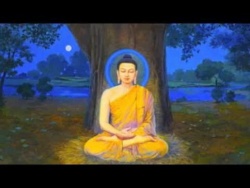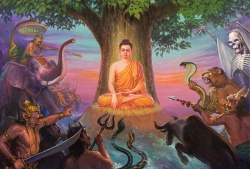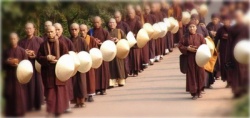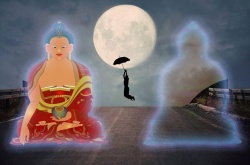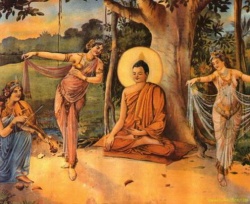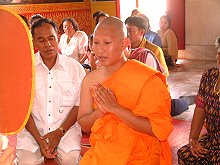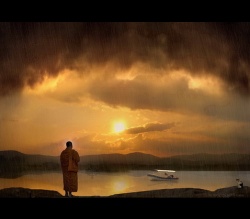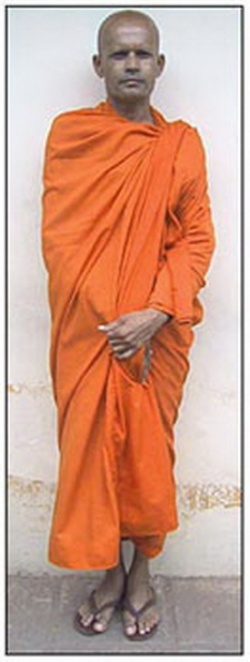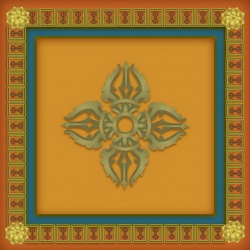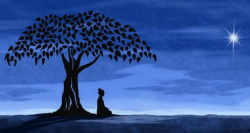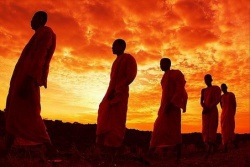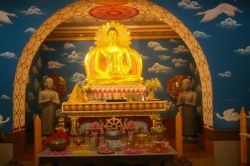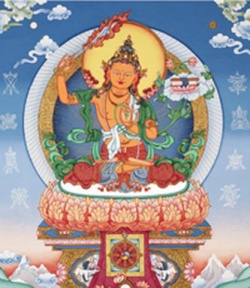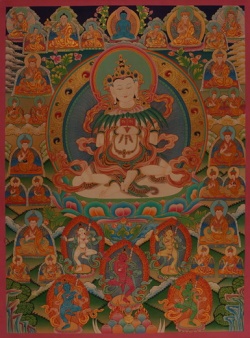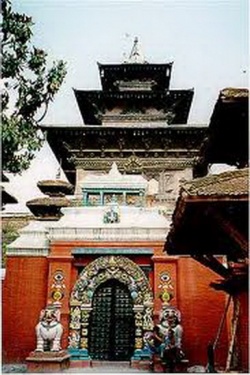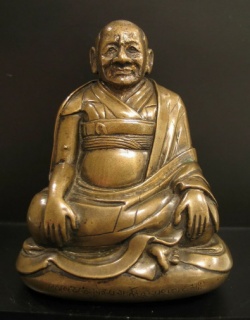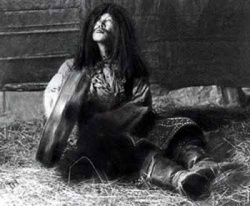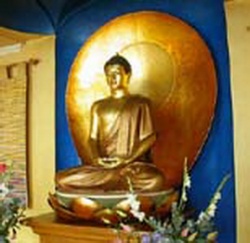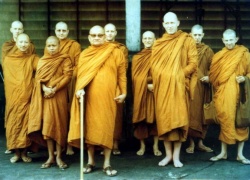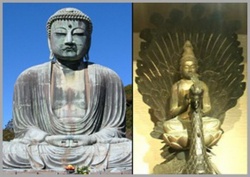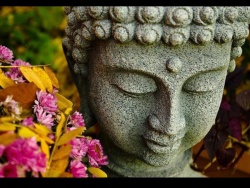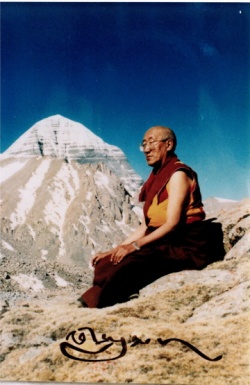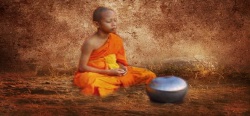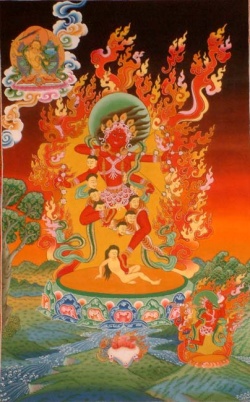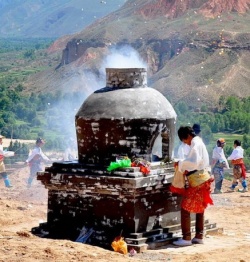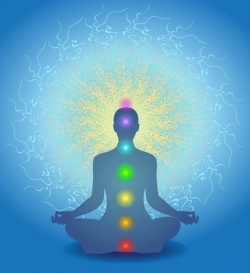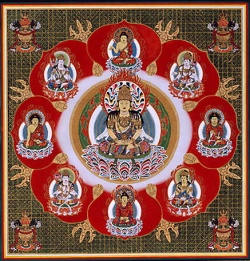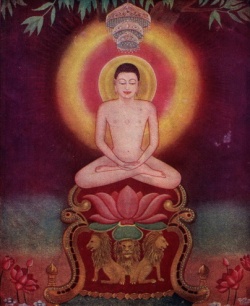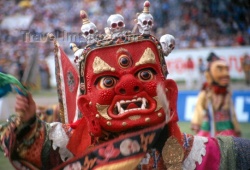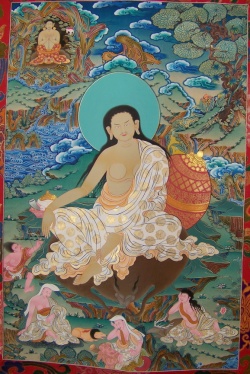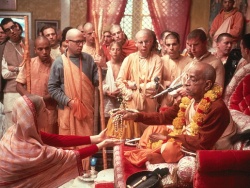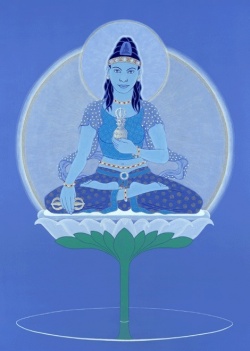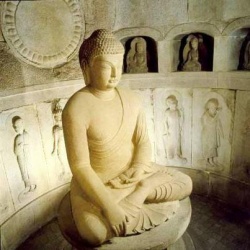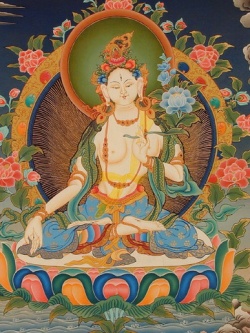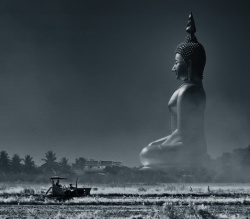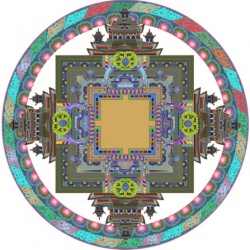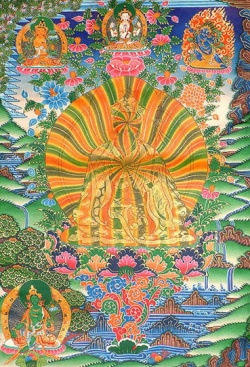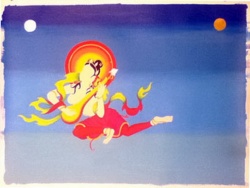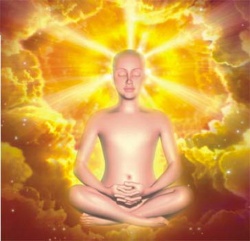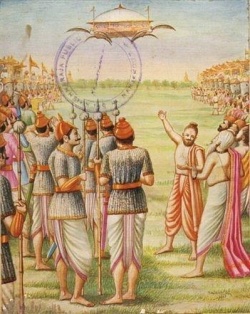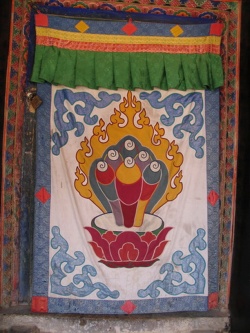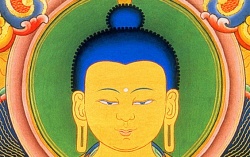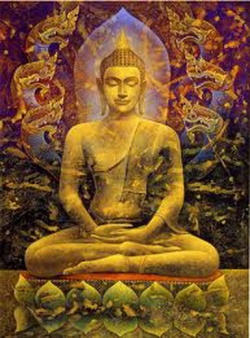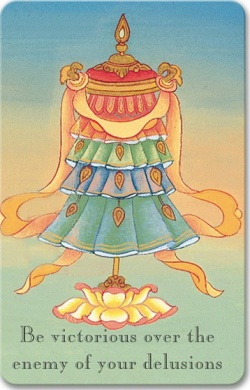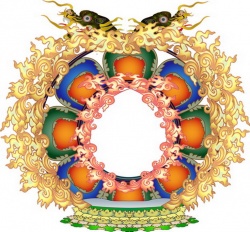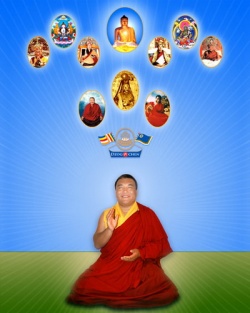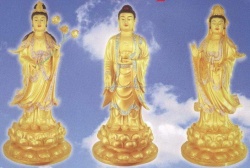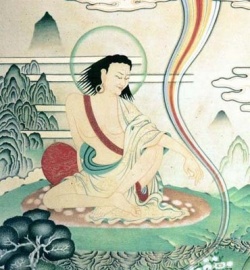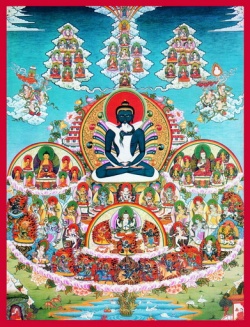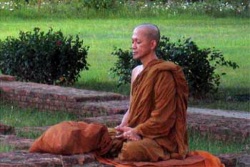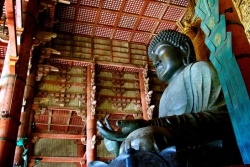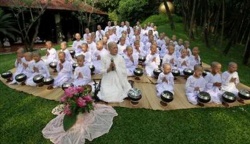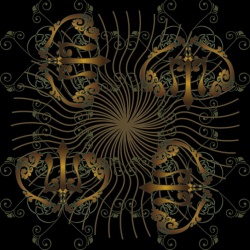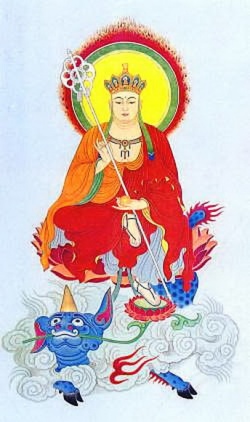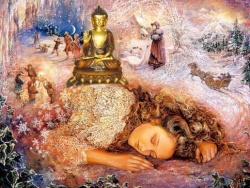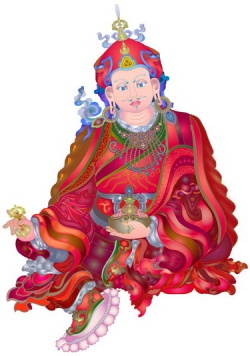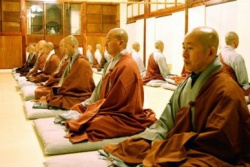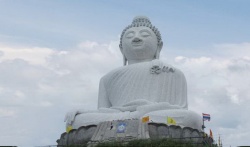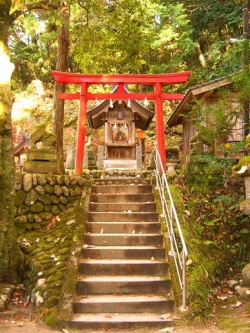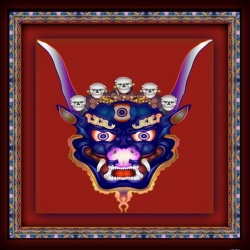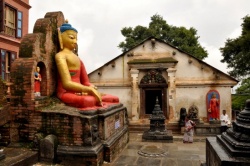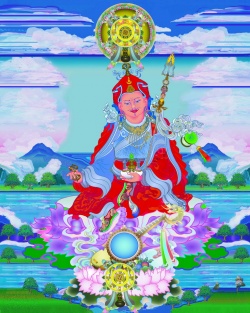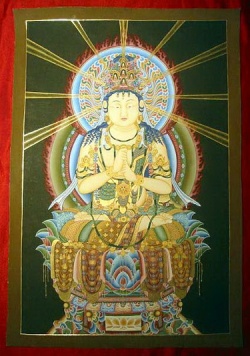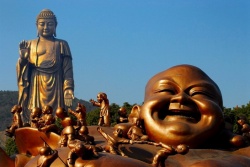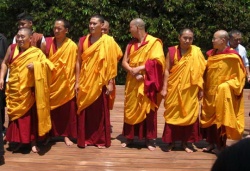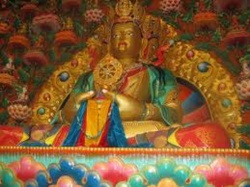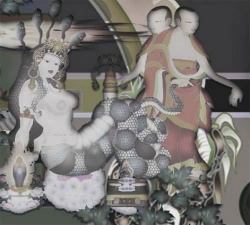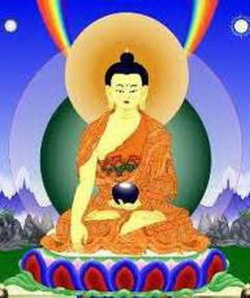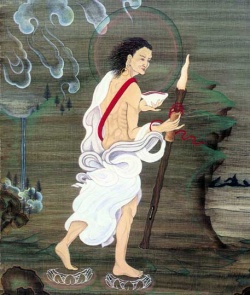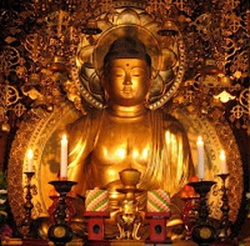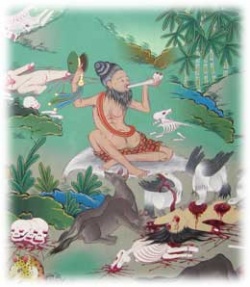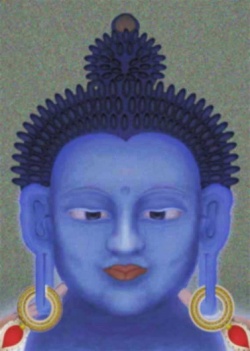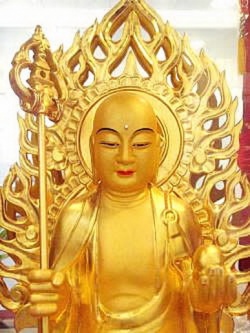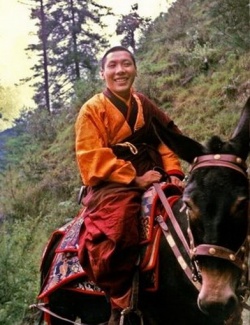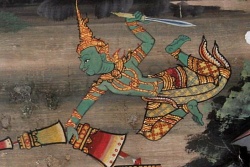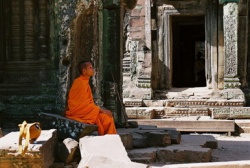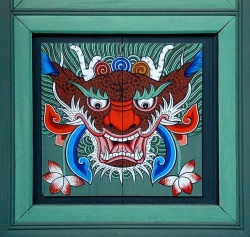Mahayana Mahaparinirvana Sutra: Chapter 24: On Bodhisattva Kasyapa
Mahayana Mahaparinirvana Sutra
Chapter 24: On Bodhisattva Kasyapa
Translated by Kosho Yamamoto from Dharmakshema's Chinese version,
edited and revised by Dr. Tony Page
Copyright for this edition is held by Dr. Tony Page, 2012.
Bodhisattva Kasyapa said to the Buddha: "O World-Honoured One! The Tathagata truly pities all beings. You adjust well what is not adjusted, make the impure pure, give refuge to the person who has no refuge, and give Emancipation to the person who is not yet emancipated. You have eight unmolestednesses (unrestrictednesses), you are the Great Doctor, and you are the King of Medicine. Bhiksu Sunaksatra was a son of the Buddha when as yet a Bodhisattva. After renunciation, he upheld, recited, discriminated and expounded the 12 types of sutra, destroyed the bonds of the world of desire and gained the four dhyanas (deep meditations). Why is it that you the Tathagata should prophesy that Sunaksatra is one lower than the icchantika, one who lives long in hell, one irremediable? Why, O Tathagata, do you not, for his sake, speak about Wonderful Dharma and then later speak for the sake of the Bodhisattvas? O Tathagata-World-Honoured One! If you cannot save Bhiksu Sunaksatra, how can we say that you have Great Loving-Kindness and great expedients?"
The Buddha said: "O good man! To illustrate: a father and mother couple have three sons. One is obedient, respects his parents, is sharp and intelligent, and knows well of the world. The second son does not respect his parents, does not have a faithful mind, is sharp and intelligent, and knows well of the world. The third son does not respect his parents, and has no faith. He is dull-witted and has no intelligence. When the parents wish to impart a teaching, who should be the first to be taught, who is to be loved, to whom do the parents need to teach the things of the world?"
Bodhisattva Kasyapa said: "First must be taught the one who is obedient, who respects his parents, who is sharp and intelligent, and who knows what obtains in the world. Next, the second and then the third (son). And although the second son is not obedient, for the sake of loving-kindness this son should be taught next." "O good man! It is also the same with the Tathagata. Of the three sons, the first may be likened to the Bodhisattva, the second to the sravaka, and the third to the icchantika. I have already spoken to the Bodhisattvas all about the details of the 12 types of sutra, and of what is shallow and near to the sravakas, and of what obtains in the world to the icchantikas and to those of the five deadly sins. What obtains in the present does not benefit the person. But I would teach because of loving-kindness and for what may result in days to come. O good man! It is like three kinds of field. One is easy to irrigate. There is no sand there, no salt, no gravel, and no stones, and no thorns. Plant one, and one gains 100. The second also has no sand, no salt, no gravel, no stones, and no thorns. But irrigation is difficult, and the harvest is down by half. The third gives difficulties with irrigation, and it is full of sand, gravel, stones, and thorns. Plant one, and one gains one, due to the straw and grass. O good man! In the spring months, where will the farmer plant first?"
"O World-Honoured One! First, the first field, second, the second field, and third, the third field."
"The first can be likened to the Bodhisattva, the second to the sravaka, and the third to the icchantika."
"O good man! It is as with three vessels. The first is perfect, the second leaks, and the third is broken. When one wishes to put milk, cream or butter into them, which one would one use first?"
"O World-Honoured One! We would use the one which is perfect; next, the one that leaks, and then the broken one."
"The perfect and pure one is comparable to the Bodhisattva-priest; the one that leaks to the sravaka, and the one that is broken to the icchantika. O good man! It is as in the case of three sick persons who go to the doctor. The first is easy to cure, the second difficult to cure, and the third, impossible to cure. Whom will the doctor cure if he has to cure (any of them)?"
"O World-Honoured One! First he will cure the one who is easy to cure; next, the second person, and then the third person. Why? Because of the fact that they are related."
"The person who is easy to cure is analogous to the Bodhisattva; the one difficult to cure to the sravaka-priest, and the one impossible to cure to the icchantika. In the present life, there will not come about any good fruition. But by comparison and for the ages to come, all good seeds are cultivated. O good man! For example, a great king has three horses. One is trained, is in the prime of life and possesses great strength; the second has no training, no good teeth, is not in the prime of life and does not have great strength; the third has no training, is weak, old, and has no strength. If the king wishes to go riding, which one will he use?"
"O World-Honoured One! First, the trained one, which is in perfect health and which possesses great strength; then, the second and the third."
"O good man! The trained one, which is in the prime of life and has great strength, can be likened to the Bodhisattva-priest, the second to the sravaka-priest, and the third to the icchantika. Though no good comes about (for the icchantika) in this present life, it is done (i.e. he is taught) out of loving-kindness and also to sow the seed for the days to come. O good man! It is as when great dana (giving) is performed when three persons come. One of them is of noble birth and has a good mind and upholds the precepts. The second is of the middle caste, is dull, but upholds the precepts. The third is of low caste, is dull, and violates the precepts. O good man! To whom will this great danapati (giver) give first?"
"O World-Honoured One! To the person of noble birth, who is sharp-witted and who upholds the precepts; next, to the second person, and, then, to the third."
"The first person is comparable to the Bodhisattva-priest, the second to the sravaka-priest, and the third to the icchantika. O good man! When a great lion kills a gandhahastin, he uses all his strength. Even when killing a hare, he does not have a light thought. It is also the same with the All-Buddha-Tathagata. When addressing all Bodhisattvas and icchantikas, he does not do things in two ways. O good man! I once lived in Rajagriha, when the bhiksu, Sunaksatra, served me as an attendant. In the early part of one evening, I spoke to Devendra about the essence of Dharma. It is the way of a disciple to go to bed later. Then, Sunaksatra, as I sat up a long time, had an evil thought. In those days in Rajagriha, when small boys and girls cried and would not stop, the parents would say: "If you don't stop crying, we shall give you to the devil, Vakkula." Then, Sunaksatra, getting a dishonest thought, said to me: "Please speed to samadhi. There comes Vakkula!" I said: "You blockhead! Do you not know that the Tathagata-World-honoured One never has any fear?" Then, Devendra said to me: "O World-Honoured One! Can someone like that also get into the Buddha's group?" I said: "O Kausika! Such persons can gain the Buddhist teaching; they too possess the Buddha-Nature. They will attain unsurpassed Enlightenment." I spoke to this Sunaksatra about Dharma. But he had no faith in me and did not take in anything I said.
"O good man! I once lived in the state of Kasi, at Sivapura (= Varanasi). The bhiksu, Sunaksatra, served me as attendant. I then went into the castle, meaning to beg for alms. Innumerable people vacantly (without any set purpose) followed me wherever I went. Bhiksu Sunaksatra, on following me, wanted to drive them away, but was unable to do so. Instead, the people gained a non-good mind. Entering the castle, I saw a Nirgrantha in a wine shop, sitting hunchbacked on the ground and partaking of liquor lees. Bhiksu Sunaksatra, on seeing this, said: "O World-Honoured One! If ever there was an arhat, this is the greatest. Why? Because he says that there is no cause and no return to actions performed." I said: "O blockhead! Have you never heard it said that an arhat does not drink, does not cause any harm to others, does not cheat, does not rob, and does not have any sexual intercourse? Such persons as this kill their parents and partake of liquor lees. How can one call such a man an arhat? This man will assuredly fall into Avichi Hell. An arhat is eternally segregated from the three unfortunate realms. How can you call such a man an arhat?" Sunaksatra said: "We might well be able to change the natures of the four great elements, but it is impossible to make this person fall into Avichi Hell." I said: "O blockhead! Have you never heard that the All-Buddha-Tathagata truly never uses two words (i.e. speaks falsely)?" I spoke thus, but he would not believe my words.
"O good man! I once lived in Rajagriha with Sunaksatra. At that time, there was a Nirgrantha in the castle-town who was called "Sorrow-Ridden". He always said: "The defilement of a being has no direct or indirect cause. The emancipation of us beings also has no direct or indirect cause." Bhiksu Sunaksatra said: "O World-Honoured One! If anyone is an arhat, this Sorrow-Ridden is the greatest." I said: "You blockhead! The Nirgrantha, Sorrow-Ridden, is no arhat. He cannot understand the way of an arhat." Sunaksatra further asked: "Why does an arhat become jealous of another arhat?" I said: "O you blockhead! I have no jealousy towards any person. It is only that you have distorted notions. If you mean to say that Sorrow-Ridden is an arhat, he will suffer from indigestion, have stomach-ache, die, and, after death, he will be born amongst hungry pretas (ghosts), and his comrades will carry his corpse and place it in Sitavana." Then, Sunaksatra went to the Nirgrantha and said: "O Learned One! Do you know or not that Sramana Gautama prophesies that you will suffer from indigestion, get a pain in your stomach and die, and that after your death, you will be born among hungry pretas, and that your comrades and teachers will carry your corpse and place it in Sitavana? O Learned One! Think well and effect expedients and make Gautama see that he is telling lies." Then, Sorrow-Ridden, on hearing this, fasted. This continued from the first to the sixth day. On the seventh day, he completed his fast and took some molasses. After eating this, he drank some cold water, got a pain, and died. After death, his comrades carried his dead body to Sitavana. He gained the body of a hungry preta and sat along with the corpses. Sunaksatra, on hearing of this, went to Sitavana. He saw that Sorrow-Ridden was in the form of a hungry preta, living by the side of a corpse and squatting on the ground. Sunaksatra said: "Are you dead, O great one?" Sorrow-Ridden said: "I am dead." "How did you die?" "I died from a pain in my stomach." "Who carried your dead body?" He answered: "My comrades." "After carrying you, where did they place you?" "O you blockhead! Do you not know that I am in Sitavana? I have now been born as a hungry preta. Listen well, O you Sunaksatra! The Tathagata speaks good things, true words, timely words, meaningful words, and the words of Dharma. O you Sunaksatra! The Tathagata brings to mouth such true words. Why did you not believe his words? Anyone who does not believe in his true words will gain the (kind of) body that I now have." Then, Sunaksatra came back to me and said: "O World-Honoured One! The Nirgrantha, Sorrow-Ridden, has died and been born in Trayastrimsa Heaven." I said: "O you blockhead! There is no place where an arhat gains birth. How can you say that Sorrow-Ridden has now been born in Trayastrimsa Heaven?" "O World-Honoured One! Truth to tell, the Nirgrantha, Sorrow-Ridden, has not been born in Trayastrimsa Heaven. He has now gained the body of a hungry preta." I said: "O you blockhead! The All-Buddha-Tathagata speaks only truth and is not double-tongued. Never say that the Tathagata uses two words." Sunaksatra said: "The Tathagata spoke thus at the time, but I did not believe you." O good man! Although I spoke what was true to Sunaksatra, he never once had a mind to believe me. O good man! Although Sunaksatra recites the 12 types of sutra and gains the four dhyanas, he does not know the meaning of a gatha, a line, or a word. On associating with an evil friend, he lost the four dhyanas. Losing the four dhyanas, he gained an evil notion and said: "There is no Buddha, no Dharma, and no Nirvana. Sramana Gautama sees one's future phrenologically. So does he well read the mind of others." I then said to Sunaksatra: "What I speak is good all through, from the beginning, through the middle, to the end. Whatever words I use are deftly chosen; the meaning is true. In what is said, there is nothing that is mixed up. I am perfect in pure actions." Sunaksatra again said: "Though the Tathagata spoke of Dharma for my sake, I said that there were truly no causal relations." O good man! If you do not believe me, go to Sunaksatra, who is now living by the River Nairanjana. Go and ask him."
Then, the Tathagata and Kasyapa together went to where Sunaksatra was living. Bhiksu Sunaksatra saw the Buddha coming from afar. On seeing him, he gained an evil mind. Due to this evil mind, he fell living into Avichi Hell.
"O good man! Bhiksu Sunaksatra was once in the treasure house of the Buddhist teaching. All meant nothing; he gained nothing; not a single benefit of Dharma did he gain. This comes from indolence and from an evil friend. For example, a person goes into the sea and sees many treasures, but gains nothing. This comes from indolence. The case is thus. Once he goes into the sea and sees the treasures, he gets himself killed, or is killed by a devil rakshasa (flesh-devouring demon). It is the same with Sunaksatra. He entered into the teaching, but was killed by a great rakshasa, an evil teacher of the Way. O good man! For this reason, the Tathagata, out of compassion, always told Sunaksatra that he had too much indolence.
"O good man! If (a person is) poor, I may have pity but a little. If a person was once rich, but has now lost his wealth, I pity (that person) very much. It is the same situation with Sunaksatra. He upheld, recited (the scriptures) and attained the four dhyanas, and then he lost them. This is a great pity. So I say: "Sunaksatra has a great deal of indolence." Having much indolence, he is away from all good deeds. Whenever my disciples see or hear of him, there are not a few who gain pity for this person. It is as with the person who first had a lot of wealth and later lost it. For many years I lived with Sunaksatra. Yet he always had an evil mind. And because of this evil mind, he was unable to forsake twisted views of life. O good man! Since of old I have seen in Sunaksatra just a hair's amount of good, but he has lost it. But I have never yet prophesied that he was an icchantika, the lowest, and one who would have to live for a kalpa in hell. By saying that there never exists any cause or result or action, he has long cut off the root of good. Such is the icchantika, the lowest, and one who has to live for a kalpa in hell. Thus have I prophesied.
"O good man! There is a man who drowns in the privy. A good teacher of the Way has people search for him with their hands. Grabbing a hair of (his head), he means to pull him out. He searches for him for a long time, but without success. And he gives up. It is the same with me. Looking for just a little bit of good in Sunaksatra, I wished to save him. For the whole day I tried, but could not even gain hold of a hair's amount of good in him. That was why I could not get him out of hell."
Bodhisattva Kasyapa said: "O World-Honoured One! Why did you prophesy that he would go to Avichi Hell?"
"O good man! Bhiksu Sunaksatra had many kindred with him. They all said that Sunaksatra was an arhat and that he had attained the Way, so that he could crush out twisted minds. I prophesied that Sunaksatra would go to hell due to indolence. O good man! Know that what the Tathagata says is true and that it is not two (duplicitous). Why? For there can never be any case where, when the Buddha has prophesied that a person would go to hell, the person failed to go there. There are two kinds of what the sravakas and pratyekabuddhas prophesy: either false or true. Maudgalyayana said to all in Magadha: "There will be rain in seven days." The time passed, and there was no rain. Later he prophesied: "This cow will bring forth a white calf." But what came out was a unicorn. This is like saying that a male will come out when a female comes out. O good man! Bhiksu Sunaksatra spoke to innumerable beings and always said that there came about no good or evil karmic results. Through this, he cut off all the roots of good eternally, and there did not remain a hair's worth of good left (in him).
"O good man! I knew for a long time that this Bhiksu Sunaksatra would eternally cut off the root of good. But for 20 long years we lived together. If I had kept myself away from him and never come near him, this man would speak to innumerable beings, thus teaching others to do evil. This is what we call the Tathagata's fifth power of understanding."
"O World-Honoured One! Why is it that the icchantikas do not possess good?"
"O good man! Because the icchantikas are cut off from the root of good. All beings possess such five roots as faith, etc. But the people of the icchantika class are eternally cut off from such. Because of this, one may well kill an ant and gain the sin of harming, but the killing of an icchantika does not (constitute a sin)."
"O World-Honoured One! The icchantika possesses nothing that is good. Is it for this reason that such a person is called an "icchantika"?
The Buddha said: "It is so, it is so!"
"O World-Honoured One! All beings possess three kinds of good, namely those of: 1) past, 2) future, and 3) present. Even the icchantika cannot cut off the good of the days to come. How can one say that one who cuts off all good is an icchantika?"
"O good man! Of disruption , there are two kinds. One is the disruption in the present, and the other is what hinders the present and the future. The icchantika is perfect in these two disruptions. That is why I say that the icchantika is cut off from all the roots of good. O good man! For example, there is a man who drowns in the privy, and only a single hair remains that has not sunk down. And this hair cannot be greater than the body. It is the same with the icchantika, too. He may well possess the possibility of amassing good in the days to come, but this cannot relieve him from the pain of hell. He may be saved in the days to come, but he cannot be now. That is why we say unsavable. The causal relations of the Buddha-Nature will save (him). The Buddha-Nature is not of the past, of the future, or of the present. Thus, this Buddha-Nature cannot be made away with. A rotten seed cannot call forth a bud. The same is the situation with the icchantika, too."
"O World-Honoured One! The icchantika is not segregated from the Buddha-Nature. The Buddha-Nature is that which is good. How can we say that all good is cut off?"
"O good man! If a being possesses now the Buddha-Nature, such a person is no icchantika. It is as in the case of the nature of the Self. The Buddha-Nature is what is Eternal. It does not fall within the category of the Three Times. If it were in the category of the Three Times, it would be non-eternal. The Buddha-Nature is what will be seen in days to come. So, we can say that beings possess the Buddha-Nature. On this account, the Bodhisattva of the ten stages can see partly due to the fact that he is perfectly adorned."
Bodhisattva Kasyapa said: "O World-Honoured One! The Buddha-Nature is Eternal; it is like space. Why is it that the Tathagata says that it can have the future? You, the Tathagata, say that the icchantika has no root of good. Can the icchantika not love his comrades, teachers, parents, relatives, wife and children? If so, is it not the case that he has an act of good?"
The Buddha said: "Well said, well said, O good man! You do well to put such a question. The Buddha-Nature is like space. It is not past, not future, and not present. Beings can perfect the pure body in the days to come and can accomplish themselves and gain the Buddha-Nature. That is why I say that the Buddha-Nature is a thing of the days to come. O good man! I, at times, for the sake of beings speak of the cause and say that it is the result; at times, I speak of the result and say that it is the cause. Because of this, I say in the sutras that life is food and that material form (“rupa”) is touch (“sparsa”). The body of the days to come will be pure. Hence, the Buddha-Nature."
"O World-Honoured One! If things are as the Buddha says, why do you say: "All beings possess the Buddha-Nature?"
"O good man! Although there is no present of the Buddha-Nature of beings, we cannot say that it does not exist. Though, by nature, there is no present of space, we cannot say that there is not (space). The case is thus. Though all beings are non-eternal, this Buddha-Nature is Eternal and cannot suffer change. That is why I say in this sutra: "The Buddha-Nature of beings is not in and not out; it is as in the case of space, which is neither in nor out." If there were in and out in space, we could not say that space is one and eternal; nor could we say that it exists everywhere. Although space exists neither in nor out, all beings possess it. The same is the case with the Buddha-Nature of beings, too. You say that the icchantika has a cause of good. This is not so. Why not? Whatever he does with body, mouth and mind, and whatever he obtains, seeks, gives or comprehends is all evil in nature. Why? Because these do not ride on the law of cause and effect. O good man! The Tathagata is perfect in the knowledge and power relative to all dharmas. So, he knows well the differences between the top, middle and low qualities of all beings. He indeed knows that (i.e. whether) a person turns low into middle, middle into top, top into middle, and middle into low. For this reason, know that there cannot be any fixedness in the qualities of beings. Being not fixed, the good is lost; and when it is lost, the person gains it again. If it were the case that the root quality of a being were fixed, once (the good had been) lost, it would never come back. Also, we must not say that the icchantika falls into hell and that life in hell is one kalpa (i.e. aeon) long. O good man! That is why the Tathagata says that no state is fixed in existence."
Bodhisattva Kasyapa said to the Buddha: "O World-Honoured One! You, the Tathagata, with the power of being able to know all things, see that Sunaksatra is certain to lose all the roots of good. Why do you permit him to be in the Sangha?"
The Buddha said: "O good man! In the past when I left home, my younger brother, Nanda, my cousins, Ananda and Devadatta, and my son, Rahula, all followed in my footsteps and renounced the world and (secular) life and practised the Way. If I had not allowed him to join the Sangha, he would have come to the throne. Gaining unrestricted power, he would have destroyed the Buddhist teaching. For this reason, I allowed him to enter the Sangha. O good man! If he had not entered the Sangha, he would have been far away from the root of good, and for innumerable ages to come he would have destroyed the Buddhist teaching. For this reason, he is now in the Sangha. Though he possesses no good, he upholds the precepts and respects the elders, the aged, and the virtuous, and makes offerings, and can practise dhyanas from the first to the fourth. This is a cause of good. Any such good cause will bring forth what is good. When good comes about, he will well practise the Way, and through this, he will attain unsurpassed Enlightenment. Because of this, I permitted Sunaksatra to enter the Sangha. O good man! If I had not permitted Sunaksatra to be ordained and receive sila, I could not be said to possess the Tathagata's ten powers.
"O good man! The Buddha sees that a being possesses things both good and not good. Although a man possesses (such) two things, he soon severs himself from the roots of good and possesses what is not good. Why? Because such a person does not befriend a good teacher of the Way, does not give ear to Wonderful Dharma, does not think well, and does not act as he ought to act. He thereby severs himself from good and performs what is not good. O good man! The Tathagata knows that this person, in this life or in the next life, when small, in the prime of life, or in old age, will befriend a good friend, give ear to Wonderful Dharma, to suffering, to the cause of suffering, to extinction, and the Way leading to the extinction of suffering, and then he will come back again and do good.
"O good man! For example, there is a spring which is not far from a village. The water is sweet and beautiful, and possesses eight virtues. There is a man there who is very thirsty and desires to be by the spring. There is a wise person, who thinks that the thirsty man will unfailingly hasten to the spring, because he sees that the way to it is not difficult. The case is thus. So does the Tathagata-World-Honoured One see beings. On this account, we say that the Tathagata is perfect in the power of knowing all things relative to all beings."
Then, the World-Honoured One took up a small bit of earth and deposited it on his fingernail, saying to Kasyapa: "Is this bit of earth, or that of the ten directions, greater?" Bodhisattva Kasyapa said to the Buddha: "O World-Honoured One! The earth on your fingernail cannot be compared to the earth of the ten directions." "O good man! One abandons one's body and gains a body again; one casts aside the body of the three unfortunate realms (i.e. the realms of hell, hungry ghosts, and animals) and gains another body. And when all the sense-organs are perfect, one gains life in the Middle Country, gains right faith, and practises well the Way. Practising well the Way, one indeed practises the Right Way. Practising the Right Way, one attains Emancipation, and then one truly enters Nirvana. This is like the earth on my fingernail. One casts away one's body and gains one of the three unfortunate realms. One casts away the body of the three unfortunate realms and gains the body of the three unfortunate realms (again). One is not perfect in all one's sense-organs, one gains life in an out-of-the-way (remote) place, holds an upside-down view of life, follows a twisted way, and does not attain Emancipation and Nirvana. All of this may be likened to the earth of the ten quarters.
"O good man! One who upholds the precepts always makes effort, does not commit the four grave offences, does not perform the five deadly sins, does not use the things that belong to the Sangha, does not become an icchantika, and does not segregate his self from all the roots of good. Such a person who believes in this Nirvana Sutra can be likened to the earth on my fingernail. Those who violate the precepts, those who are indolent, those who commit the four grave offences, those who perform the five deadly sins, those who use the things of the Sangha, those who become icchantikas, those who cut off all the roots of good, and those who do not believe in this sutra are as great in number as the earth in the ten directions. O good man! The Tathagata knows well all about the qualities of beings of the top, middle and low (positions). Because of this, we say that the Buddha is perfect in the power of being able to see through to the root of all things."
Bodhisattva Kasyapa said to the Buddha: "O World-Honoured One! The Tathagata possesses this power of seeing through to the root of things. Because of this, he truly knows the sharp and dull, and the differences in qualities of the top, middle and bottom of beings, and also knows well the root qualities of the beings of the present world and also those of the beings of the future. Such beings, when the Buddha is gone, will say that the Tathagata has ultimately entered Nirvana or that he has not ultimately entered Nirvana. Or they might say that there is the Self or that there is no Self. Or they may say that there is an in-between existence or that there is no such; or that there is retrogression or that there is not; or that the Tathagata possesses a created body or that what he possesses is one uncreated; or that the 12 links of interdependent arising are of the created or that causal relations are the non-created; or that the mind is eternal or that it is non-eternal, or that when one partakes of the joy of the five desires, this hinders the Holy Way or that it does not; or that laukikagradharma ("first-of-the-world-root-of-good", or "prime-in-the-world condition" - the fourth and highest “nirvedha-bhaga”, intellectual penetration, insight) is but of the world of desire or that it concerns the three unfortunate realms; or that dana is a thing of the mind, or that it belongs to the realm of the five skandhas. Or they will say that there are three non-created (things), or that these do not exist. Or they will say that there is created "matter", or that there is no such thing; or that there is a non-created matter, or that there is nothing such as that. Or they will say that there are the mental functions, or that there is nothing such. Or they will say that there are the five kinds of "is", or that there are six such; or that if one is perfect in the eight purifications (“astangasamanvagatopavasa”) and the upasaka (lay Buddhist) silas, one can well gain (benefit), or that one can well gain (such) even if one is not quite perfect in these observances. Or it will be said that even when a bhiksu has committed the four grave offences, there is yet sila (morality) for that bhiksu, or that there is not. Or they will say that all the srotapannas, sakrdagamins, anagamins, and arhats arrive at what Buddhism aims at, or that this is not so. Or they will say that the Buddha-Nature is with the being from birth, or that it exists apart from the being. Or it will be said that the Buddha-Nature must exist even with such kinds of people as those who have committed the four grave offences, those of the five deadly sins, and with the icchantika, or that they do not possess such. Or they will say that there are the Buddhas in the ten directions, or that there are no Buddhas in the ten directions. If the Tathagata is perfect in the power of seeing through the natures of beings, why does he not state definitely about it (i.e. these matters)?"
The Buddha said to Kasyapa: "O good man! Any such is not what eye-consciousness can know; nor is it what mind-consciousness can know. It is what Wisdom can know. To a person who has Wisdom, I do not say anything in a double way; and that is why I say that I do not speak in two ways. To those who are ignorant, I speak in indefinite ways, and they say that I speak in indefinite ways. O good man! Whatever good action the Tathagata performs is all to adjust and subjugate all beings. For example, whatever medical knowledge a good doctor possesses is all to cure beings' illnesses. The same is the case here. O good man! The Tathagata, on account of the land, on account of the season, on account of other languages, for beings, for the root qualities of beings, speaks, relative to one thing, in a double way. In the case of one name, he uses innumerable names; for one meaning, he displays innumerable names; regarding innumerable meanings, he speaks of innumerable names.
"How does he speak of innumerable names when referring to one thing? This is as in the case of Nirvnaa, which is called Nirvana, non-birth, non-appearance, non-doing, non-created; also (it is called) the refuge, vihara (dwelling-place), Emancipation, light, a lamp, the other shore, fearlessness, non-retrogression, the abode of peace, quietude, formlessness; also, the not-two, the one action, cool, non-gloom, the unhindered, non-disputation, the non-defiled, vast and great; also, amrta (Immortality) and happiness. Things are thus. This is how we say that one thing possesses many names.
"How does one refer to innumerable names? This is as in the case of Devendra, who is called Devendra, Kausika, Vasava, Puramda, Maghavat, Indra, The Thousand-Eyed, Saci, Vajra, Treasure-Head, and Treasure-Banner. The case is thus. This is how we say that one meaning has innumerable names.
"How do we use innumerable names for innumerable meanings? This is as in the case of the Buddha-Tathagata. We say "Tathagata", in which the meaning is different and the name different. Also, we say "arhat", which has a different meaning and the name is different. Also, we say "samyaksambuddha" (Fully Enlightened One), which has a different meaning and a different name. Also, we say "master mariner". Also, we say "Guide" and "Right Enlightened One". Also, we say "All-Accomplished One". Also, we say "Great Lion-King"; also, "sramana", "Brahmin", "quietude", "danapati" (giver), "paramita" (transcendent perfection), "great doctor", "great elephant-king", "great naga-king", "eye-giver", "great wrestler", "great fearlessness", "ball of treasure", "merchant", "emancipated", "great man", "teacher of gods and humans", "pundarika" (lotus), "the one alone, with no equal", "the great field of blessings", "the great sea of Wisdom", "formlessness", and "perfect in eight knowledges". Thus do we have different meanings and different names. This is why we say that innumerable meanings have innumerable names.
"Also, there is the case where the meaning is one, but the names are many. The so-called "skandha" is called: skandha, upside-down, satya; it is presented as: four remembrances, four kinds of food, and four abodes of consciousness. Also, it is called "is", way, time being, world, “Paramartha-satya” (Ultimate Truth), three practices of the body, sila and mind, cause and effect, defilement, Emancipation, the 12 links of interdependent arising, sravaka, pratyekabuddha, hell, hungry preta, animal, human and god. Also, it is called: past, present, and future. This is why we say that innumerable are the names to one meaning.
"O good man! The Tathagata-World-Honoured One, for the sake of beings, speaks of the simplified in relation to detailed manifestations and of the detailed in reference to the simplified. He speaks of Ultimate Truth and makes it worldly truth, and speaks of worldly truth and makes it Ultimate Truth.
"How does he speak of the detailed, the middle, and the simplified? This is as when it is said to the bhiksus (monks): "I shall now speak to you of the 12 links of interdependent arising. What are the 12 links of interdependent arising? They are none other than cause and effect."
"How does he speak of the detailed, the middle, and the simplified? This is as when he says to the bhiksus: "I shall now speak of suffering, the cause of suffering, extinction, and the Way to the extinction of suffering. Suffering is the various innumerable sorrows. The cause of suffering is the innumerable defilements. Extinction is the innumerable emancipations. The Way is innumerble expedients."
"How does he speak about Ultimate Truth and make it into the truth of the world? This is as when it is said to the bhiksus: "Now, this body has old age, sickness, and death."
"How does he speak of the truth of the world and make it Ultimate Truth? This is as when I said to Kaundinya: "Now you, Kaundinya, are so called because you gain Dharma." Thus, I accord with the person, will, and time. Hence, we say that the Tathagata has the power to see through to the root qualities of all things. O good man! If I spoke about things in definite terms, it would not be the case that the Tathagata was perfect in the power to see through to the root qualities of all things.
"O good man! One with Wisdom knows that what a gandhahastin shoulders cannot be borne by a donkey. All beings do innumerable things. So the Tathagata speaks innumerable things variously. Why? Because beings possess various defilements. If the Tathagata spoke only of one action, we could not say that the Tathagata was perfect and accomplished in the power of seeing through to the root qualities of all things. So I say in a sutra: "Do not speak to the five kinds of people the five kinds of things. To one who has no faith, one does not praise right faith; to one who breaks the prohibitions, one does not praise upholding sila; to the stingy, one does not praise dana (giving), to the indolent learning, and to the ignorant Wisdom."
"Why not? If a wise person speaks to these five kinds of people about these five things, know that that speaker cannot be said to possess the power to see through to the root qualities of all things; he cannot be said to pity beings. Why not? Because these five kinds of people, when they hear these (things), will gain a disbelieving mind, an angry mind, and in consequence of this they will suffer from sorrowful karmic results for innumerable ages. Because of this, for pity's sake, we do not call such a (person one with the) power to see through to the root qualities of beings. That is why I say in a sutra to Sariputra: "You should be careful not to speak to the sharp-born extensively about Dharma and to the dull-born in simplified language." Sariputra said: "I only speak out of pity, not because I possess this power to see through to the root qualities of beings."
"O good man! The sermons of the detailed and the simplified belong to the world of the Buddha. Such are not what sravakas and pratyekabuddhas can know.
"O good man! You say: "After the Buddha's entering Nirvana, the disciples will say various (divergent) things." Such a person does not have the right view, because of the causal relations of what is upside-down. Due to this, such a person is unable to benefit himself, nor can he benefit others. All beings are not of one nature, one root, one action, one kind of land, and one good teacher of the Way. Because of this, the Tathagata speaks variously. Due to this causal relation, the All-Buddha-Tathagatas of the ten directions and of the Three Times, deliver, for the sake of beings, sermons of the 12 types of sutra. O good man! The Tathagata delivers sermons of the 12 types of sutra. This is not to benefit his own Self, but to benefit others. Because of this, the fifth power of the Tathagata is called the power of comprehension. Because of these two powers, the Tathagata will know that the person has truly cut himself off from the root of good in this life or will in a later life, or that he gains Emancipation in this life or that he will gain it in a later life. Because of this, we call the Tathagata the unsurpassed wrestler.
"O good man! One who says that the Tathagata ultimately enters Nirvana, or that he does not, does not understand the mind of the Tathagata. That is why he speaks thus.
"O good man! In this Gandhamadana, there are all kinds of rishis, to the number of 53,000, who had all amassed all kinds of virtue in the days of Buddha Kasyapa. Yet, they did not gain the Right Way. They befriended (more likely: did not befriend, etc. - ed.) the Buddhas and listen to Wonderful Dharma. Because of such persons, I , the Tathagata, said to Ananda: "I shall enter Nirvana at the end of the third month." All the devas heard this, and their voices reached Gandhamadana. All the rishis, on hearing this, repented and said: "Why did we not, on being born as humans, befriend the Buddha? The appearance of the All-Buddha-Tathagata in this world is as rare as in the case of the udumbara. I shall now go to where the World-Honoured One is and listen to Wonderful Dharma."
"O good man! Then the rishis, to the number of 53,000, came to me. I then, as requested, spoke of Dharma thus: "All you great ones! Material form is non-eternal. Why? Because of the fact that the causal relations of material form are non-eternal. It comes out of a cause of (i.e. a cause which is) non-eternal. How could material form be eternal? The same is the case down to consciousness." All the rishis, on hearing this, attained arhatship.
"O good man! In the castle-town of Kusinagara, there were wrestlers, to the number of 300,000. They belonged to no one. Becoming haughty since they possessed physical power, vitality and wealth, they got drunk and mad. O good man! To subjugate all these wrestlers, I said to Maudgalyayana: "Hold down (tame) these wrestlers!" Then he, all-respectfully, to accord with my instructions, spent five years teaching (them). But not one wrestler gained Dharma and not one was subjugated. On this account, I, for the sake of the wrestlers, said to Ananda: "In three months' time, I shall enter Nirvana."
"O good man! On hearing this, all the wrestlers gathered together and made repairs to the road. Three months later, I moved from Vaisali to Kusinagara Castle and on the way saw many wrestlers. Transforming myself into a sramana, I joined the wrestlers: "All of you children! What are you doing?" The wrestlers, on hearing this, became vexed and said: "O you sramana! What do you mean by calling us children?" I then said: "You big group of people, whose number is 300,000, may not even be able to move this small piece of stone. How can I call you anything other than children?" All the wrestlers said: "If you can call us children, know that you must be a great man." I then, at that time, picked up the stone with two fingers. Having witnessed this, all the wrestlers thought that they were possessed of less strength than myself and said: "O you sramana! Can you now move this stone out of the way?" I said: "Why are you so seriously engaged in repairing this road?" "O sramana! Do you not know that the Tathagata Shakyamuni is taking this road and will come to the forest of sal trees and enter Nirvana? For this reason, we are making repairs (to the road) and making it flat." I then praised (them) and said: "Good children! You now possess such a good (attitude of) mind. I shall now make away with this stone." I picked up the stone and cast it up as high as Akanistha Heaven. Then, all the wrestlers, on seeing that the stone hung suspended in the sky, became frightened and wanted to scatter in all directions. I then said: "O wrestlers! Do not be afraid and try to fly in all directions." All the wrestlers said: "O sramana! If you will save and protect us, we shall remain in peace." Then I put my hand on the stone and placed it in the palm of my right hand. On seeing this, the wrestlers grew pleased and said: "O sramana! Is this stone eternal or not eternal?" I then puffed on it with my mouth, and the stone broke into pieces like dust-motes. On seeing this, the wrestlers said: "O sramana! This stone is non-eternal." Then, feeling ashamed, they reproached themselves and said: "How is it that we take pride in our unlimited physical strength, and in life and wealth?" I, seeing through (i.e. reading) their minds, threw off my transformed body, regained my own form, and spoke about Dharma. Seeing all of this, the wrestlers aspired to Enlightenment.
"O good man! In Kusinagara, there lives an artisan called Cunda. This person once, at the place of Buddha Kasyapa, took a great vow: "I shall make the last offering of food to Shakyamuni Buddha when he enters Nirvana." This being the case, I, at Vaisali, looked back to Upamana and said: "In three months' time, I shall enter Nirvana at Kusinagara, between the sal trees. Go and let Cunda know of this."
"O good man! In Rajagriha, there is a rishi who is well practised in the five miraculous powers and whose name is Subhadra. He is 120 years old. He calls himself one versed in all things and is extremely arrogant. Already, at the places of innumerable Buddhas, he has amassed all the roots of good. In order to teach him, I said to Ananda: "I shall enter Nirvana in three months' time. On hearing of this, Subhadra will come to me and gain a faithful mind. I shall speak several things to him. On giving ear to what I say, he will make away with the defilements."
"O good man! Bimbisara, King of Rajagriha, had a prince called Sudarsana. This prince, through causal relations, gained an evil mind and wished to kill his own father. But he did not know how to. At that time, Devadatta, from the causal relations of his past, gained an evil mind and desired to do harm to me. He practised the Way so as to gain the five miraculous powers, and before long he had gained them. He now established good connections with Sudarsana, displaying various miracles before him. He emerged from where there was no gate, and entered through a gate; he came out of a gate, and entered at a place where there was no gate. At times, he would conjure up an elephant or a horse, a cow, a sheep, a man, or a woman. On seeing this, Sudarsana gained a loving (i.e. attached) mind, a mind of pleasure and of respect. And in consequence, he made various preparations and offered them up in various utensils. And he said: "O great one! I now wish to see the mandarava (a flower)." Then, Devadatta went up to Trayastrimsa Heaven and asked for it from the hand of a deva (god). Any good that he may have amassed having come to an end, none would give (it to him). Unable to obtain the flower, he thought: "The mandarava flower has no Self or what belongs to the Self. I shall now take it, and what sin will I (thereby) commit?" As he stepped forward, meaning to take it, he lost his divine power. He came back to himself and was then in Rajagriha. Being ashamed of himself, he could not see (face) Sudarsana.
"And he thought to himself: "I shall now go to the Buddha and ask him to entrust the mass (i.e. the community of the Buddha's followers) to me. If he agrees, I shall be able freely to give commands to Sariputra and others." Then, Devadatta came to me and said: "O Tathagata! Commit your great mass to my guidance, so that I may teach and give them the Way." I said: "O you madman! I do not entrust the great mass even to the hands of the greatly clever and wise man, Sariputra, whom the world trusts. Why should I entrust it to you, who but swallow your own spittle?" Then Devadatta all the more gained hateful thoughts towards me and said: "You may now have control over your people. But your power will soon fade away." As he said this, the great earth shook six times. Devadatta at once fell to the ground. His body emitted a great storm, which blew up all the dust and made him look foul. Devadatta, seeing this evil effect, said further: "If I now fall into Avichi Hell, I shall certainly repay this great resentment." Then, raising himself, he went to Sudarsana, who queried: "Why, Holy One, do you look so crestfallen and sorrowful? " Devadatta said: "I always look thus, do you not know this?" Sudarsana answered: "Pray tell me why that is. Devadatta said: "I am now on very close terms with you. Other people criticise you and say that what you do goes against reason. I hear this. How can it be that I do not feel worried?" Prince Sudarsana further asked: "In what way do the people of the land criticise me?" Devadatta said: "The people of the land say that you are an "unborn-resentment." Sudarsana said again: "Why am I an "unborn-resentment"? Who says this?" Devadatta said: "When you were not yet born, the augur said: "This son, when grown up, will kill his own father." That is why all other people call you an "unborn-resentment". All of the people of your household call you "good-looking", just to guard your mind. The royal consort, Vaidehi, on hearing this, gave birth to you on top of a high building, as a result of which you fell to the ground and lost one of your fingers. That is why all the people call you "Balaruci" (= "One without a finger"). Hearing this, I felt sorry. But I could not tell you this." Thus, Devadatta taught Sudarsana evil things and made him kill his own father. "If your father dies, I, too, will certainly kill Sramana Gautama."
"Sudarsana had a minister called Varsakara, whom he asked: "Why did the great King name me Ajatasatru?" The minister told him the whole story, which was none other than what Devadatta had told to Sudarsana. Hearing this, Sudarsana shut the minister and his own father up in a place outside the castle and had the place guarded by four kinds of soldier. Queen Vaidehi, on hearing of this, went to where the King was imprisoned. The guards would not let her in. Then the Queen became angry and reproached the guards. Then, all the guards said to the Prince: "O great King! The Queen wishes to see the King. It is difficult to know whether we are to let her in or not?" Sudarsana became vexed, went to his mother, took her by the hair, unsheathed his sword, and meant to kill her. Then Jivaka said: "O great King! Since the beginning of government, however grave, no sin extends to the female. And how can you act thus to the one who gave you birth?" On hearing this, because of Jivaka he released her. And he deprived his father of all such things as clothing, bedding, food, drink, and medicine. Seven days later, the King died. Sudarsana completed the funeral and then repented. Varsakara spoke to him in different ways about various evil things: "O great King! There is no sin in what you have done. Why do you now so repine?" Jivaka said: "O great King! Know that such an action is doubly sinful. The one sin is killing one's own father, and the other killing a srotapanna. No one can make away with such sins other than the Buddha." Sudarsana said: "The Tathagata is pure and has nothing (about him) that is defiled. How can we, the defiled, hope to see him?"
"O good man! Seeing this, I told Ananda: "In three months' time, I shall enter Nirvana." On hearing of this, Sudarsana came to me. I then spoke of Dharma. Through this, his grave sin reduced and he gained a faith which was not rooted in him. O good man! All my disciples, on hearing of this, could not grasp what was in my mind. So they said: "The Tathagata is definitely going to enter Nirvana."
"O good man! There are two kinds of Bodhisattva. One is real, and the other temporary. The Bodhisattvas of the temporary class, on hearing that I am to enter Nirvana within three months, all gain a retrogressive mind and say: "If the Tathagata is non-eternal and not to live, what can we do? We shall have to undergo great pains for innumerable lives to come. The Tathagata-World-Honoured One is accomplished and perfect in innumerable virtues. And he can do nothing so as to crush out Mara (the devil). How can we crush out any such?"
"O good man! For the sake of such Bodhisattvas, I say: "The Tathagata is Eternal and does not change." O good man! On hearing this, none of my disciples can grasp what I mean to say, and they say: "It is definite that the Tathagata will not enter Nirvana."
"O good man! Beings acquire this world-view of existence and say: "None of us beings gain any karmic effects after death." To any such, I say: "There are persons who actually receive karmic returns. How do we know it to be as "is"?
"O good man! In days gone by, there was a king in Kusinagara called Sudarsana. To become a child, it took (him) 84,000 years; to become a crown prince 84,000 years, and to become a king also a further 84,000 years. Sitting alone, he thought to himself: "Beings have little virtue. So, life is short. The four enemies (e.g. defilement, the skandhas, death, and Mara; or here: birth, old age, illness, and death) always pursue them and bear down upon them, but they do not feel it and are indolent. Because of this, I shall leave home, practise the Way, and drive away the four enemies, i.e. birth, old age, illness, and death." So he gave orders to his officials and had a house built of seven treasures, outside the castle. The hall having been built, he said to his ministers, officials, harem women, children, and relatives: "Know that I wish to renounce my home. Do you agree?" Then, the ministers and relatives said: "Well said, well said, O King! It is now truly time." So Sudarsana, taking a man along with him, went alone to his house. For 84,000 years he practised compassion. In consequence of this, he became, by degrees, a Chakravartin (world-ruler). After 30 generations, he became Sakrodevanam; and for innumerable years he became (various) minor kings. Who could that Sudarsana have been? Do not think thus. I myself was that person. O good man! All my disciples, on hearing this, failed to take my meaning and said: "The Tathagata says that there definitely is Self and what belongs to Self."
"I also said to all beings: "Self is nature. That is to say that all the causal relations, the 12 links of interdependent arising, the five skandhas of beings, the world of mind, all virtuous actions, and the world of Isvara fall within the category of self." On hearing this, all my disciples do not grasp my meaning and say: "The Tathagata says that there definitely is self."
"O good man! Once on a different occasion, a bhiksu came to me and asked: "O World-Honoured One! What do we mean by self? Who is self? Why do we say self?" I then said to this bhiksu: "O bhiksu! There is nothing that can be called self or what belongs to self. The eye is what originally was not, but what now is; what once was, but is not now. When appearing, there is nothing which it follows, and when dying, there is no place (for it) to go. There can be the karmic returns, but no one who acted. There is no one who abandons the skandhas and no one who receives them. You ask: What is self? It is an action. How could it be a self? It is craving. O bhiksu! Clap (your) two hands together, and we get a sound. The case of self is also thus. The causal relations of beings, action, and craving are self. O bhiksu! The physical form (“rupa”) of all beings is non-self. There is no physical form in self; there is no self in physical form. So does it apply (all the way down the skandhas) to consciousness. O bhiksu! All tirthikas (non-Buddhists) say that there is self. But it is not away from the skandhas. There is no self other than the skandhas. None can say thus. All the actions of beings are like phantoms, being like a mirage which appears in the hot season. O bhiksu! The five skandhas are all non-eternal, non-bliss, non-self, and non-pure." O good man! Then, there were innumerable bhiksus who, seeing through the five skandhas and the fact that there is no self, and that nothing belongs to self, attained arhatship. O good man! All my disciples, on hearing this, fail to gain my meaning and say: "The Tathagata definitely says that there is no Self."
"O good man! I also say in a sutra: "One acquires this body when three things harmoniously come together. One is the father, the other the mother, and the third the in-between existence (Jap. “chuon”: an existence that is supposed to exist after one's death and before rebirth.). These three come together, and we get this body." I at times say: "The anagamin (non-returner to samsara) enters Parinirvana; or he enters into the state of an in-between." Or I also say: "The body and organs are perfect and clear: all come about from past actions, as in the case of pure sarpirmanda." O good man! I, at times, say: "The in-between existence which an evil person gains is like the coarse woolen cloth that is found in the world, whereas the in-between existence which a pure, good being gains is like the finely woven, white woolen cloth produced at Varanasi." All of my disciples hear this, do not get my meaning, and say: "The Tathagata says that there is an in-between existence."
"O good man! I also said this to those who had actually committed the deadly sins: "Those who commit the five deadly sins fall into Avichi Hell." I also said: "Bhiksu Dharmaruci, when he dies, will immediately fall into Avichi Hell. There is no place to stay in-between." I also said to the Brahmacarin, Vatsiputriya: "O Brahmacarin! If there were an existence in-between, there would have to be six existences." I also said: "To a non-form being, there can be no in-between existence." O good man! All of my disciples hear this, fail to grasp my meaning, and say: "The Buddha says that there decidedly cannot be any in-between existence."
"O good man! I also say in a sutra: "Also, there is retrogression. Why? Because innumerable bhiksus are indolent and lazy, and do not practise the Way." There are five kinds of retrogression, which are: 1) one likes having many things, 2) having enjoyed, one speaks of worldly things, 3) one loves sleeping, 4) one likes to associate with people of the secular world, 5) having enjoyed, one goes about. Because of all of this, the bhiksu falls back.
"Of the causal relations of retrogression, there are two types, which are: 1) inner, 2) outer. A person of the arhat stage certainly leaves the inner cause, but not the outer. Due to the external causal relations, defilement raises its head. Due to defilement, retrogression comes about. There was a bhiksu who was called Kutei , who had retrogressed six times. Having retrogressed, he repented and again practised the Way, and it was now the seventh time. Gaining it and being afraid of losing it again, he killed himself.
"I also, at times, say that there is Emancipation, or I speak about six arhats. All of my disciples hear this, do not arrive at my meaning, and say: "The Tathagata says that there decidedly is retrogression."
"O good man! I also say in a sutra: "For example, just as charcoal never turns back into wood, and when an earthen pot is shattered it never serves again as a pot, so does it obtain with defilement. The cutting off (of defilement) by an arhat nevermore becomes reversed." Also, I say: "There are three causes for beings' having defilement. These are: 1) the defilement is not done away with, 2) the causal relations are not done away with, 3) the person does not think well. And the arhat does not have the two causal relations. The defilement is done away with and there is no thinking about evil things." O good man! All of my disciples hear this, do not grasp my meaning, and say: "The Tathagata says that there never is retrogression." O good man! I say in a sutra that the Tathagata has two kinds of body. One is the carnal body (Jap. “shoshin; “ "sho"= essential nature; "shin"= mind, consciousness - so this translation of "carnal body" is not clear here - ed.), and the other is the Dharmakaya (Jap. “hosshin” = Dharma Body, Dharma Mind). The carnal body is none but expedient and accommodation. So such a body undergoes birth, old age, illness, and death. It is long, short, black, and white; this is right, that is (not) right; this is learning or non-learning. All my disciples hear this, do not grasp my meaning, and say: "The Tathagata says that the Buddha's body is but what is created." The Dharmakaya is the Eternal, Bliss, Self, and the Pure; it is eternally segregated from birth, old age, illness, and death. It is not white, nor black, neither is it long nor short; it is not learning, nor non-learning. The Buddha is one who has appeared or one who has not appeared. He is Eternal. He does not move about. There is no change. O good man! All of my disciples hear this, do not grasp my meaning, and say: "The Tathagata says that the body of the Buddha is definitely an uncreated body."
"O good man! I say in a sutra: "What are the 12 links of interdependence? From ignorance comes about action, from action consicousness, from consciousness mind-and-body, from mind-and-body the six spheres (of sense), from the six spheres touch, from touch feeling, from feeling craving, from craving cleaving, from cleaving existence, from existence birth, and from birth ageing-and-death, apprehension and sorrow." O good man! All of my disciples hear of this, do not grasp my meaning, and say: "The Tathagata says that the 12 links of interdependence are decidedly the created."
"I once gave a bhiksu an injunction and said: "The 12 links of interdependence are the Buddha, non-Buddha, characteristics, and the Eternal."
"O good man! There is a case where the 12 links of interdependence arise from causal relations. Also, there is a case where they arise out of causal relations and yet are not the 12 links of interdependence. Also, there is a case where they come about from causal relations and are the 12 links of interdependence. Also, there is a case where they are those which have come about neither from causal relations nor from the 12 links of interdependence.
"We say that there is a case where they have not come about from the causal relations of the 12 links of interdependence. This is said referring to the 12 links of interdependence of the future.
"We say that there is a case where they come about from causal relations and yet are not the 12 links of interdependence. This refers to the five skandhas of an arhat.
"We say that there is a case where they come about from causal relations and are the 12 links of interdependence. This refers to the 12 links of interdependence of the five skandhas of the common mortal.
"We say that there is a case where they are not those come about from causal relations and are also not the 12 links of interdependence. This refers to space and Nirvana.
"O good man! All of my disciples hear of this, do not come to my meaning, and say: "The Tathagata says that the 12 links of interdependence are definitely uncreated."
"O good man! I say in a sutra: "All beings do good and evil actions. When they die, the four great elements immediately break up. With those whose deeds are pure and good, their minds travel upwards; those whose deeds are solely evil travel downwards." O good man! All of my disciples hear this, fail to grasp my meaning, and say: "The Tathagata says that the mind is definitely eternal."
"O good man! I once said to Bimbisara: "Know, O great King, that form (“rupa”) is non-eternal. Why? Because it comes about from a cause of the non-eternal. If this form comes about from a cause of the non-eternal, how can the wise say that this is eternal? If form is eternal, there will not be any breaking up (of it) and no coming about of all sorrows. Now, we see that this form breaks up and becomes dispersed. Hence, we must know that form is non-eternal. The same applies down to consciousness, too." O good man! All of my disciples hear this, do not get my meaning, and say: "The Tathagata says that the mind can definitely be cut off."
"O good man! I say in a sutra: "All of my disciples receive all incense and flowers, gold, silver, gems, wife, child, male and female servants, and the eight impure things, and yet they gain the Right Path. Having attained it, they do not abandon it." They hear this, do not grasp my meaning, and say: "The Tathagata says that one may accept the things of the five desires and that this does not obstruct the Holy Way."
"And, at one time, I say: "There cannot be a case where men of secular life attain the Right Path." O good man! All of my disciples hear of this, do not grasp my meaning, and say: "The Tathagata says that partaking of the five desires definitely obstructs the Right Path."
"O good man! I say in a sutra: "Severing defilement, one does not yet gain Emancipation. This is as in the case where one lives in the world of desire and practises the laukikagradharma (insight into the world)." O good man! All of my disciples hear of this, fail to grasp my meaning, and say: "Tathagata says that the laukikagradharma is nothing but a thing of the world of desire."
"And also I say: "The usmagata, murdhana, ksanti, and the laukikagradharma are no other than gaining the four dhyanas, from the first to the fourth." All of my disciples hear of this, do not grasp my meaning, and say: "The Tathagata says that the laukikagradharma is nothing but a thing of the world of form."
"And also I say: "All the tirthikas were already able to cut off the defilements that stood in the way of the four dhyanas. Practising the usmagata, murdhana, ksanti, and laukikagradharma, and meditating on the Four Truths, the person obtains the fruition of the anagamin." All of my disciples hear of this, do not get my meaning, and say: "The Tathagata says that the laukikagradharma exists in the world of non-form."
"O good man! I say in a sutra: "Of the four kinds of dana (giving), there are three which are pure. The four are: 1) the giver believes in cause, result, and dana, but the recipient does not, 2) the recipient believes in cause, result, and dana, but the giver does not, 3) both giver and recipient have faith, and 4) both giver and recipient have no faith. Of these four kinds of dana, the first three are pure." All of my disciples hear of this, do not grasp my meaning, and say: "The Tathagata says that dana is but the mind."
"O good man! I once said: "When one gives, one gives five things. What are the five? These are: 1) matter, 2) power, 3) peace, 4) life, and 5) oratorical prowess. The causal relations of such come back as returns to the one who gives." All of my disciples hear of this, do not grasp my meaning, and say: "The Buddha says that dana is nothing but the five skandhas."
"O good man! I once said: "Nirvana is what is cut off, and where defilement is eternally annihilated, and where nothing remains behind. This is as in the case of the light of a lamp. When gone, there is no (re)-appearing of a thing. It is the same with Nirvana.
"We say "Void". This is where there is no place that can be named. For example, in worldly life we say "like the Void", when there is nothing (there) to be possessed. This is apratisamkhya-nirodha (i.e. when the causal relations for something to exist have gone, nothing can come about), where there is nothing to be possessed. If there is something that can be named, there must be causal relations. When there are causal relations, there can be extinction. When there are not, there is no extinction." All of my disciples hear of this, do not grasp my meaning, and say: "The Buddha says that there are not three uncreates."
"O good man! I once said to Maudgalyayana: "O Maudgalyayana! Nirvana is the sentence and the line, the forestep (forward step), the ultimate, fearlessness, the great teacher, great fruition, the ultimate knowledge, great ksanti (patience), and unhindered samadhi. This is the great world of Dharma, the taste of amrta (deathlessness) and is difficult to see. O Maudgalyayana! If it is said that there is no Nirvana, how can it be that a person who slanders falls into hell?" O good man! All of my disciples hear this, do not grasp my meaning, and say: "The Tathagata says that there is Nirvana."
"Once, I said to Maudgalyayana: "O Maudgalyayana! The eye is not inflexible. So does it obtain with the carnal body. All is not inflexible. Being not inflexible, we say Void. Where the food goes on (down), and where it turns round and is digested, all sounds are Void." All of my disciples hear of this, do not grasp my meaning, and say: "The Tathagata says that the uncreated Void definitely exists."
"Also, once I said to Maudgalyayana: "O Maudgalyayana! There is a person who has not yet attained the fruition of srotapanna. When abiding in ksanti, he cuts himself off from the karmic results of the three unfortunate realms. Know that it (samsaric existence) does not die out by the causal relation of intellect." All of my disciples hear this, fail to grasp my meaning, and say: "The Tathagata says that there definitely exists the apratisamkhya-nirodha."
"O good man! I, at one time, said to Bhiksu Bhadrapala: "You, Bhiksu, should meditate on form. Nothing of the past, future, present, near, far, coarse, or delicate is the Self or what belongs to the Self. Thus meditating, the bhiksu truly cuts off the craving for form." Bhadrapala also said: "What is form?" I said: "The four great elements are form and the four skandhas are called "name" (i.e. what is mental)." All of my disciples hear of this, do not grasp my meaning, and say: "The Tathagata says that form is definitely the four great elements."
"O good man! For example, by means of a mirror, an image appears. It is the same with matter too. By means of the four great elements, things come about, such as (what is) coarse, delicate, non-slippery, slippery, blue, yellow, red, white, long, short, square, round, wrong, angled, light, heavy, cold, hot, hungry, thirsty, smoky, cloudy, dusty, and misty. This is why we say that matter comes about like sound or form. All of my disciples hear this, do not grasp my meaning, and say: "The Tathagata says that as there are the four great elements, there can be the works of matter."
"O good man! In days past, Prince Bodhi said: "Should a bhiksu who upholds sila gain an evil thought, know that at that moment he loses sila."
"I then said: "O Prince! There are seven kinds of sila. When things come about by body and mouth, there comes about non-expressible form (i.e. the secondary "rupa" that comes about from receiving sila). Through the causal relation of this non-expressible form, we do not say that we lose sila, although the thing itself rests in the category of the evil-non-definable. It is yet the upholding of sila. Why do we say "non-expressible form"? Because it constitutes no cause of any different form; nor is it the fruition of any different form." O good man! All of my disciples hear this, do not grasp my meaning, and say: "The Buddha says that there is a non-expressible form."
"O good man! I say in other sutras: "Sila checks evil things. If one does not do evil, this is the upholding of sila." All my disciples hear this, do not grasp my meaning, and say: "The Tathagata says that there definitely is no non-expressible form."
"O good man! I say in a sutra: "The skandhas from form down to consciousness of a holy person have come about from the causal relations of ignorance. It is the same whith what obtains regarding the things of all common mortals, too. From ignorance comes about craving. Know that this craving is ignorance. From craving comes about cleaving. Know that this cleaving is ignorance and craving. From cleaving comes about existence. Know that this existence is ignorance, craving, and cleaving. From existence comes about feeling. Know that this feeling is action and existence. From the causal relation of feeling come about such as mind-and-body, ignorance, craving, cleaving, existence, action, feeling, touch, consciousness, and the six (sense) spheres. Because of this, feeling is nothing but of the 12 links of interdependence." O good man! All of my disciples hear this, do not grasp my meaning, and say: "The Tathagata says that there is no caitta (mental factor)."
"O good man! I say in a sutra: "From the four things of eye, form, light, and evil desire comes about visual cognition. The evil desire is ignorance. As the nature of desire seeks to possess, we call this craving. From the causal relation of craving comes about cleaving, and this cleaving is called action. From the causal relation of action comes about consciousness, and consciousness is related to mind-and-body. Mind-and-body is related to the six spheres; the six spheres are related to touch, touch to conception, conception to feeling, craving, faith, effort, dhyana, and Wisdom. All such things come about by touch, and yet they are not touch itself." O good man! All of my disciples hear of this, do not grasp my meaning, and say: "The Tathagata says that the caitta exists."
"O good man! I, at one time, said: "There is but one existence. This extends to two, three, four, five, six, seven, eight, nine up to twenty-five." All of my disciples hear this, do not get my meaning, and say: "The Tathagata says that there are five existences or six existences."
"O good man! I once lived in Kapilavastu, in the nyagrodha gardens, when Kolita came to me and said: "What is an upasaka?"
"I then said: "Any male or female who is perfect in all the sense-organs and who takes the three refuges (in Buddha, Dharma and Sangha) is an upasaka (lay Buddhist)."
"Kolita said: "O World-Honoured One! What is a partial upasaka?"
"I said: "Anyone who has taken refuge in the Three Treasures (of Buddha, Dharma and Sangha) and who has received one sila (moral precept) is a partial upasaka." All of my disciples hear this, do not grasp my meaning, and say: "The Tathagata says that even a person who is imperfect can well gain the upasaka sila."
"O good man! I once was dwelling on the banks of the Ganges, when Katyayana came to me and said: "O World-Honoured One! I teach people to take the ritual of purification. This may go on for a day, a night, a time, or for a thought-moment. Can such a person accomplish the ritual of purification?" I said: "O bhiksu! This person accomplishes good, but not purification." All of my disciples hear of this, do not get my meaning, and say: "The Tathagata says that a person completely gains the eight purifications."
"O good man! I say in a sutra: "Any person who commits the four grave offences is no bhiksu. Such a bhiksu is one who transgresses sila or one who has forgotten sila. He cannot call forth the bud of good. For example, this is as with a burnt-out seed, from which one cannot expect any fruit. If the crown of the tala tree is damaged, no fruit can come about. It is the same with the bhiksu who commits the grave offences, too." All of my disciples hear of this, do not get my meaning, and say: "The Tathagata says that any bhiksu who has committed the grave offences loses the sila of a bhiksu."
"O good man! In a sutra I spoke, for Cunda's sake, of the four kinds of bhiksu. These are: 1) ultimate arrival at the Way, 2) showing of the Way, 3) receiving of the Way, and 4) the defiled Way. One who commits the four grave offences belongs to those defiling the Way. All of my disciples hear of this, fail to get my meaning, and say: "The Tathagata says that the bhiksu who commits the four grave offences does not violate sila."
"O good man! I said in a sutra to all bhiksus: "All such as the one vehicle, one Way, one action, one condition, and all from one vehicle up to the condition give beings great quietude. These eternally excise all such as bondage, apprehension, suffering, and the suffering of suffering, and lead all beings to one existence." All of my disciples hear of this, do not get my meaning, and say: "The Tathagata says that all from srotapanna up to arhat achieve the Buddhist end."
"O good man! I say in a sutra: "The srotapanna repeats comings and goings between the world of humans and that of devas (gods) seven times, and then attains Parinirvana. The sakrdagamin has only one life as man or god and then attains Parinirvana. The anagamin comprises five kinds. One may attain, in between, Parinirvana or go up proceeding and gain it in the highest heaven. With those of the stage of arhat, there are two kinds, which are gaining (Nirvana) 1) in the present life and 2) in the next life. In the present life, they cut away defilement and the five skandhas; and in the next life, too, they cut away defilement and the five skandhas." All of my disciples hear of this, fail to get my meaning, and say: "The Tathagata says that one may go up from the stage of srotapanna up to the stage of arhat and yet cannot be perfect in the Buddhist Way."
"O good man! I say in this sutra: "In detail, there are six things in the Buddha-Nature, namely: 1) the Eternal, 2) the Real, 3) the True, 4) the Good, 5) the Pure, and 6) the Visible." All of my disciples hear of this, do not grasp my meaning, and say: "The Buddha says that the Buddha-Nature of beings exists outside of us beings."
"O good man! I also say: "The Buddha-Nature of the being is like the Void. The Void is not past, not future, and not present. it is not in, nor out; it is not within the boundaries of colour, sound, taste, and touch. It is the same with the Buddha-Nature." All of my disciples hear of this, do not get my meaning, and say: "The Buddha says that the Buddha-Nature of beings exists outside of the beings."
"O good man! I once said: "People such as those who have committed the four grave offences, the icchantikas, slanderers of the vaipulya sutras, and those who have committed the five deadly sins, all have the Buddha-Nature. Such persons do not possess good actions to depend upon. The Buddha-Nature is the Good in itself." All of my disciples hear of this, do not grasp my meaning, and say: "The Buddha says that the Buddha-Nature of beings exists outside of beings."
"O good man! I also once said: "The being himself is the Buddha-Nature. Why? Other than the being himself, there is no gaining of the attainment of unsurpassed Enlightenment. That is why I resorted to the parable of the elephant to Prasenajit. The blind persons, when speaking of the elephant, do not give us the elephant. Yet, what they say is not totally away from it. It is the same with beings who may be speaking of form down to consciousness and saying that such is the Buddha-Nature. The case is the same. Though not the Buddha-Nature itself, yet it is not quite away from it. I also gave the king the parable of a harp. The same is the case with the Buddha-Nature, too." O good man! All of my disciples hear of this, do not grasp my meaning, and speak variously, like the blind man who asks about (the appearance of) milk. So do things stand with the Buddha-Nature.
"For this reason, I at times say: "People such as those who commit the four grave offences, slanderers of the vaipulya sutras, those committing the five deadly sins, and the icchantikas, possess the Buddha-Nature." Or I say: "No".
"O good man! I say in various sutras: "When one person appears in the world, many gain benefit. Never do two Chakravartins appear in one country, nor two Buddhas in one world. Nor under the four heavens do the eight guardians of the land appear, and no two Paranirmitavasavartins. No such thing can happen. And I say that I journey from Jambudvipa and Avichi Hell up to Akanistha heaven." All of my disciples hear of this, do not grasp my meaning, and say: "The Buddha says that there is no Buddha in the ten directions." And I also say in all Mahayana sutras that there are the Buddhas in all the ten directions."
"O good man! Such matters of dispute are the things that belong to the world of the Buddha. They are not what sravakas and pratyekabuddhas can fathom. If a person can indeed gain a doubting mind, such a person can crush out innumerable defilements, as great in size as Mount Sumeru. When a man gains an immovable mind, this is what we call clinging."
Bodhisattva Kasyapa said to the Buddha: "O World-honoured One! How do we cling?"
The Buddha said: "O good man! Such a person may well follow what others say or look into the sutras by himself. Or he may particularly teach others, but such a person is unable to abandon what the mind sticks to. This is clinging."
Kasyapa said: "O World-Honoured One! Is such clinging an act of good or one that is not good?"
"O good man! Such clinging is not an action that can be called good. Why not? Because such cannot break all the webs of doubt."
Kasyapa said: "O World-Honoured One! Such a person had no doubt from the very start. How can we say that he cannot break the webs of doubt?"
"O good man! One who has no doubt is one who has doubt."
"O World-Honoured One! There is a person who says that one at the stage of srotapanna does not fall into the three unfortunate realms. The situation of this person may well be called one of clinging and doubt."
"O good man! This may well be called what is fixed; we cannot call it doubt. Why not? O good man! For example, there is a man who first sees a man and a tree and, later, while out walking at night, may see a stub (tree-trunk) and gain doubt and wonder if this is a man or a tree. O good man! A person first sees a bhiksu and a Brahmacarin, and then might later see, far off, a bhiksu and gain doubt and wonder if this is a sramana or a Brahmacarin. O good man! A person may first see a cow and a buffalo and later may see, in the distance, a cow and gain a doubting mind and wonder whether this is a cow or a buffalo.
"O good man! All beings first see two things and then gain doubt. Why? Because the mind is not clear. I never say that a person of the srotapanna stage falls into the three unfortunate realms or that he does not fall into the three unfortunate realms. How can a person gain a doubting mind?"
Kasyapa said: "O World-Honoured One! You the Buddha say that one necessarily sees a thing before and that then a doubt arises. There is one who, not seeing two things, gains doubt. What is this? It is Nirvana. O World-Honoured One! For example, a person runs into muddy water along the way. Not having seen anything of this kind before, a doubt arises. The case is thus. Is such water deep or shallow? Why is it that this person, not having seen (such) before, gains such doubt?"
"O good man! Nirvana is nothing other than the segregation of suffering; non-Nirvana is suffering. All beings see two things, which are: suffering and non-suffering. The suffering and non-suffering are: hunger and thirst, cold and heat, anger and joy, illness and peace, old age and the prime of life, birth and death, bondage and emancipation, love and parting, and encountering hateful people. Beings, having met (with these things), gain doubt: "Could there be any way to do away with all such things or not?" Because of this, beings entertain doubt as to Nirvana. You say that this person has not seen any water before, and how, you ask, is it possible for him to gain doubt? Things are not thus. Why not? This person has seen water before in other places. That is why he gains doubt where he has not seen it before."
"O World-Honoured One! This person has seen deep and shallow places before and then he had no doubt. Why does he now gain doubt?"
The Buddha said: "As he did not do before, he gains a doubt. That is why I say: "A person doubts when there is what is not clear."
Bodhisattva Kasyapa said to the Buddha: "O World-Honoured One! The Buddha says that a doubt is clinging and clinging a doubt. Who does such?"
"O good man! It is the icchantika, who has severed the root of good."
Kasyapa said: "O World-Honoured One! Who is the person who has severed the root of good?"
"O good man! Any person who is clever, cunning, sharp-witted, and who understands well but leaves a good friend. All people such as those who do not give ear to Wonderful Dharma, who do not think well, who do not live following Dharma are those who have severed the root of good. The mind parts from four things and the person thinks to himself: "There cannot be dana. Why not? Dana is parting with wealth. If there is any return to dana, the danapati (giver) will always be poor. Why? The seed and the fruit are alike. That is why we say that there is no cause and no result." If a person speaks thus and says that there are no cause and result, this is severing the root of good. Also, a person thinks: "The three elements of giver, recipient, and thing given do not abide eternally. If there is no abiding, how can one say that this is the giver, this the recipient, and this the thing given? If there is none who receives, how can there be any fruition (result)? For this reason, we say that there is no cause, and no result." Should a person say that there are no cause and no result, we can know that such a person has severed the root of good.
"Also, a person thinks: "When a person gives, there are five things in this giving. When he has received, the recipient may at times do good or non-good. And the giver of this giving also does not gain any result of good or non-good. This is as things go in the world, where the seed calls forth fruit and the fruit the seed. The cause is the giver and the result the recipient. And the recipient cannot make the good and non-good come into the hands of the giver. Because of this, there is no cause and no result." If a person should say that there is no cause and there is no result, know that this person truly severs the root of good.
"Also, a person thinks: "There is nothing that can truly be called dana. Why not? Dana is a thing which is indefinable. If indefinable, how can it call forth any good result? There is no result that is good or bad. This is what is called indefinable. If a thing is indefinable, know that there cannot be any good or bad result. For this reason, we say that there is no dana, no cause, and no result." Anyone who professes that there is no cause and also no result, such a person severs the root of good.
"Also, a person may think: "Dana is will. If will, there can be no seeing and no object seen. This is no matter (physical form). If no matter, how can a person give? Because of this, I say that there is no dana, no cause, and no result." If a person speaks like this and says that there is no cause and no result, know that this person truly severs the root of good.
"Also, a person might think: "If the giver gives to an image of the Buddha, that of a deva, or for the good of his parents who have now gone, there cannot be anyone who can be said to receive. If no one receives, there cannot be any result to name. If there is no result to name this means that there is no cause. If there is no cause, this means that there is no result." If a person talks thus and says that there are no cause and result, such a person severs the root of good.
"Also, a person thinks: "There is no father and no mother. Should a person say that parents are the cause of a being, the ones who bring forth a being, logic will lead him to say that birth must be going on continuously and that there is no disruption (interruption). Why? Because there is always the cause. But birth does not go on all the time. Because of this, know that there are no parents."
"Also, a person thinks: "There is no father and no mother. Why not? If a being comes about through parents, the being must possess the two sexual organs of male and female. But there are not such. Know that a man does not come about from parents."
"Also, a person thinks: "A being does not come from father and mother. Why not? One sees with one's eyes that one is not like one's parents in all such things as body and mind, deportment, one's goings and comings. Because of this, the parents are not the cause of the being."
"Also, a person thinks: "There are four nothingnesses. These are: 1) what has not appeared is what is not. This is like the horns of a hare or the hair of a tortoise (i.e. non-existent). It is the same with the parents of a being. These four are what are equal to what is not. One may say that the parents are the cause of the being. But when the parents die, the children do not necessarily die. Because of this, the parents are not the cause of the being."
"Also, a person thinks: "If we say that the parents are the cause of the being, beings must always come about from parents. But there are such births as the transformed birth and birth from moisture. From this we can know that the being does not come about from parents."
"Also, a person thinks: "A person can grow up, not depending upon his parents. For example, the peacock gains its body by hearing the sound of thunder, and the blue sparrow gains its body by swallowing the tears of the male sparrow; the jivamjivaka gains its body by looking at a brave man who dances." When the person thinks thus and does not encounter a teacher of the Way, that person, we may know, truly severs the root of good.
"Also, a person thinks: "In all the world, there is no karmic result from the good or bad actions performed. Why not? There are beings who are perfect in the ten good things and are pleased to give and amass virtues. Even to such persons there also truly come illnesses of the body; they can die in mid-life, lose their wealth, and have many apprehensions and sufferings. There is a person who commits the ten evil deeds, is parsimonious, greedy, jealous, lazy, and indolent. Never amassing good, he is yet at peace, has no illnesses, enjoys a long life, is full of wealth, and suffers no apprehensions or sorrow. From this we may know that there do not exist any karmic consequences from good and evil actions."
"Also, a person thinks: "I also once heard a holy man speak, who said that there are cases where a person who has accumulated good falls into the three unfortunate realms when his life ends, and cases where the evil-doer gains life in heaven when his life comes to an end. From this we can know that there cannot be any talk of results from good or evil actions."
"Also, a person thinks: "All holy persons say two (contradictory) things. One says that harming life gains one a good result, and (another says) that killing earns one an evil result. From this we may know that what a holy person says is not definite. If there is nothing definite in what a holy person says, how can one be definitely fixed? For this reason, know that there is no result from good or evil."
"Also, a person thinks: "There are no holy persons in the world. Why not? Any holy person will have the Right Way. All beings, possessed of defilement, practise the Right Way. Know that this means that they walk the Right Way and that defilement accompanies them. If the two exist at the same time, this means that the Right Way is unable to destroy defilement. If a person practises the Way, possessing no defilement, what is the good of practising the right Way? This indicates that any person who has no defilement cannot make away with the Way. If a person does not possess defilement, there is no need of the Way. From this, know that there cannot be anyone in the world who can be called a holy person."
"Also, a person thinks: "Ignorance is causally related to action, down to birth, old age, and death. Beings are all equally related to the 12 links of interdependence. The nature of the Noble Eightfold Path is equal, which is also so related. If one person practises, all beings will also gain; when one person practises, all the sorrows (of others) will die out. Why? Because defilement is equal in nature. And yet, we do not get this. This shows that there is no Right Way."
"Also, a person thinks: "Holy persons depend on the law (i.e. depend on the same things as) of any common mortal, as in drink and food, walking, standing, sitting, and lying, drowsing, being happy, laughing, feeling hunger and thirst, cold and heat, apprehension and fear. If on the same level, holy persons cannot attain the Holy Way. On attaining the Way, all these things must be done away with. If such things are not yet done away with, we may know that there cannot be any such thing as the Way."
"Also, a person thinks: "A holy person's body is immersed in the pleasures of the five desires. Also, he speaks ill of (people), beats (them), and is jealous and arrogant. He has sorrow and joy, and does good and evil deeds. From this we can know that there is no such thing as a holy person. If there is the Way, there must be the cutting off of the Way. If it is not cut off, we may know that there is no such thing as the Way."
"Also, a person thinks: "A person who has much pity is a holy person. Why do we call him a holy person? Because of the Way. If the Way is pity, he must have pity for all beings. It is not something one gains through having practised. If there is no pity, how can a holy person gain it when he has accomplished the Way? From this we may know that there is no such thing in the world as the Holy Way."
"Also, a person thinks: "All things do not arise having the four great elements as their cause. Beings all equally possess the four great elements. Beings see that this person may gain and the other may not. If there is any Holy Way, things should go thus. But things do not go thus. So one can indeed know that there is no such thing as the Holy Way."
"Also, a person thinks: "If all holy persons have only one Nirvana, we can know that there cannot be any such thing as a holy person. Why not? Because one cannot gain it. The eternal Dharma cannot be gained, or one cannot gain or abandon it. If holy persons have many Nirvanas, this tells us that what there is there is non-eternal. Why? Because these are things that can be counted. If Nirvana is one, it will come to everybody when one person gains it. If Nirvana is many, it must possess boundary lines. How can we call it eternal? If it is said that Nirvana is one in body and that emancipation is many, this may be likened to the case where one has many teeth and a tongue. But this is not so. Why not? Because each gaining is not total gaining. As there is a boundary line, it must be non-eternal. If non-eternal, how can one speak of Nirvana? If there is no Nirvana, how can there be any holy person? Due to this, we can know that there is no one who can be called a holy person."
"Also, a person thinks: "The Way that must be gained by any holy person is not what can be gained through causal relations. If it cannot be gained through causal relations, why do we all become holy persons? If all people are not holy persons, we can know that there cannot be any holy person or Way."
"Also, a person thinks: "The holy person says that there are two causal relations regarding right view, namely: 1) following others and giving ear to Dharma, and 2) thinking for oneself. If these two come about by causal relations, what comes about must also arise out of causal relations. Thus, there must be going on an unending chain of wrongs. If these two do not come about by causal relations, why is it that all beings do not get it?" So thinking, the person truly severs the root of good.
"O good man! If a person should thus profoundly view all things as causeless and resultless, that person cuts himself off from the root of the five things, which begin with faith. O good man! The person who lacks the root of good is not necessarily one of the mean and dull; nor is he in heaven or in the three unfortunate realms. It is the same with the bhiksu who infringes the law of the Sangha."
Bodhisattva Kasyapa said to the Buddha: "O World-Honoured One! When does such a person come back and gain the root of good?"
The Buddha said: "O good man! Such a person gains the root of good at two times. One is when he first enters hell, and the other is when he gets out of hell. O good man! There are three kinds of good act, which are those of 1) the past, 2) the present, and 3) the future. As regards the past, the nature dies out of itself. The cause may go off, but the result does not yet ripen. For this reason, we do not say that the person cuts off the karmic result of the past. What cuts off the causes of the Three Times is what we say that we cut off."
Bodhisattva Kasyapa said to the Buddha: "O World-Honoured One! If we say that we sever the root of good when we sever the cause of the Three Times, we may infer that the icchantika has the Buddha-Nature. Is such Buddha-Nature that of the past or is it that of the present or of the future? Or is it extended over all the Three Times? If it is of the past, how can we call it eternal? The Buddha-Nature is eternal. From this, we can know that it does not belong to the past. If it is of the future, how can we call it eternal? Why does the Buddha say that all beings will definitely gain it? If a person will unfailingly gain it, how can we say that he severs? If it is of the present, how can it be eternal? Why is it that the person will decidedly see it?
"The Tathagata says that in the Buddha-Nature there are six kinds (aspects), which are: 1) the Eternal, 2) the True, 3) the Real, 4) the Good, 5) the Pure, 6) the Visible. If the Buddha-Nature exists even after the severing of the root of good, we cannot say that we sever the root of good. If there is no Buddha-Nature, how can we say that all beings possess it? If the Buddha-Nature is both "is" and "is-not", why does the Tathagata say that it is eternal?"
The Buddha said: "O good man! The Tathagata-World-Honoured One has four answers to all beings, which are: 1) a definite answer, 2) a discriminative answer, 3) a non-accorded answer, and 4) a left-out answer.
"O good man! What is a definite answer? When asked if an evil action calls forth a good or evil result, we say definitely that what comes about is not good in nature. The same is the situation with what is good. If asked whether the Tathagata is all-knowing or not, we definitely say that he is an all-knowing person. When asked if the Buddhist teaching is pure or not, we definitely say that it is pure. When asked if the disciples of the Buddha live in accordance with the rules, the answer will definitely be that they live in accordance with the rules set for them to live by.
"What is a discriminative answer? It is as in the case of the Four Truths that I speak about. What are the Four? These are: 1) Suffering, 2) Cause of Suffering, 3) Extinction, and 4) the Way to the extinction of suffering. What is the Truth of Suffering? It is so called because there are eight sufferings. What is the Truth of the Cause of suffering? It is so called because of the cause of the five skandhas. What is the Truth of Extinction? It is so called because of greed, ill-will and ignorance, which go all through. What is the Truth of the Way? The 37 elements of Enlightenment are called the Truth of the Way. This is a discriminative answer.
"What is the answer to what is asked? This is as when I say that all things are non-eternal. And a person asks: "O Tathagata-World-Honoured One! Why do you say non-eternal?" If this is asked, we answer: "The Tathagata says non-eternal because of the fact that things are created." The same is the case with the non-Self, too. This is as when I say that all things get burnt.
"Another person asks further: "Why does the Tathagata-World-Honoured One say that all gets burnt?" The answer to this would be: "The Tathagata says that all burn due to greed, ill-will, and ignorance."
"O good man! “The Tathagata's ten powers, four fearlessnesses, Great Loving-Kindness and Great Compassion, three remembrances, all kinds of samadhi such as the Suramgama Samadhi, etc., that come to a total of some 8 million-billion, the 32 signs of perfection, the 80 minor marks of excellence, all the samadhis such as the five-knowledge mudra, etc., whose number extends up to 3 million 5 thousand, all the samadhis such as the vajra-samadhi, etc., whose number reaches 4,200, and the samadhis of the expedients, which are innumerable, are the Buddha-Nature of this Buddha. In this Buddha-Nature, there are seven things, namely: 1) the Eternal, 2) the Self, 3) Bliss, 4) the Pure, 5) the True, 6) the Real, and 7) the Good”. These are discriminative answers.
"O good man! In the Buddha-Nature of the transformed bodhisattva that represents another person (Jap. “goshin”), there are six things, which are: 1) the Eternal, 2) the Pure, 3) the True, 4) the Real, 5) the Good, and 6) Little Seeing. These are discriminative answers.
"You asked before: "Is there any Buddha-Nature in the person whose root of good has been severed?" Also, there is the Buddha-Nature of the Tathagata; also, there is the Buddha-Nature of the body represented as of a different person. As these two hinder one's future, we may well call these "nothing". As one decidedly gains it, we may well call this "is". This is a discriminative answer.
"The Buddha-Nature of the Tathagata is not of the past, present or future. The Buddha-Nature of the body gained to represent a different person has present and future. When we see to some extent, we call it the present. When one has not fully seen it, we construe it as belonging to the future.
"In the days when the Tathagata had not yet attained unsurpassed Enlightenment, what there was was the Buddha-Nature of past, present and future, due to the fact that the Buddha-Nature stood as cause. But the result is not thus. There is a situation where things concern the Three Times, or one where the Three Times are not involved.
"With the body of the Bodhisattva who gains it for a different person, the Buddha-Nature is in the state of cause. So it has past, present and future. It is the same with the result, too. This is a discriminative answer.
"There are six kinds (elements) in the Buddha-Nature of the Bodhisattva at the level of the ninth stage, which are: 1) the Eternal, 2) the Good, 3) the True, 4) the Real, 5) the Pure, and 6) the Visible. When the Buddha-Nature is the cause, it has the three phases of past, present and future. The same applies to the result, too. This is a discriminative answer.
"There are five things relative to the Buddha-Nature of Bodhisattvas at the levels from the eighth down to the sixth stage, namely: 1) the True, 2) the Real, 3) the Pure, 4) the Good, and 5) the Visible. When the Buddha-Nature is the cause, it has past, present and future. So does it obtain with the result, too. This is a discriminative answer.
"In the Buddha-Nature of Bodhisattvas at the levels from the fifth down to the first stage, there are five things, which are: 1) the True, 2) the Real, 3) the Pure, 4) the Visible, and 5) the Good and the non-Good.
"O good man! The Buddha-Nature of categories five, six and seven is what will assuredly be gained by those who have severed the root of good. Hence, "is". This is a discriminative answer.
"There may be those who will say: "Those who have severed the root of good decidedly have the Buddha-Nature and they decidedly have no Buddha-Nature." This is a left-out answer."
Bodhisattva Kasyapa said: "O World-Honoured One! I have heard that an answer where no answer is given is called a left-out answer. O Tathagata! Why do you call such an answer a left-out one?"
"O good man! I do not say that leaving out and not answering is a left-out answer. O good man! Of this left-out answer, there are two kinds, namely: 1) one which hinders and checks, and 2) non-clinging. On this account, we say left-out answer."
Bodhisattva Kasyapa said to the Buddha: "O World-Honoured One! Why do you the Buddha say that the cause is past, present and future and the result past, present and future, and also that it is not past, present and future?"
The Buddha said: "O good man! Of the five skandhas, there are two kinds, namely: 1) cause and 2) result. The five skandhas of this cause have past, present and future, but it is also the fact that they are not past, present and future. O good man! All the bondages of ignorance and defilement are the Buddha-Nature. Why? Because they are the cause of the Buddha-Nature. From ignorance and action and from all the defilements arise the five skandhas of good. This is the Buddha-Nature. We gain the five skandhas of good up to unsurpassed Enlightenment. That is why I said before in the sutra: "The Buddha-Nature of the being is like milk which contains blood." Blood refers to all the defilements of ignorance and action, etc., and milk refers to the five skandhas of good. That is why I say: "From all the defilements and from all the five skandhas of good, one arrives at unsurpassed Enlightenment." Just as the body of beings is made up of pure blood, so does it obtain with the Buddha-Nature, too. The Buddha-Nature of the srotapanna and sakrdagamin class who have excised defilement to some extent is like milk (“ksira”); the Buddha-Nature of the anagamin is like butter (“dadhi”); that of the arhat is like fresh butter (“navanita”); that of those at the levels of pratyekabuddha up to the Bodhsiattvas of the ten stages is like clarified butter (“ghrta”); and the Buddha-Nature of the Buddha is like the skim of melted butter (“sarpirmanda”). O good man! The defilement of the present hinders, so that beings cannot see. In Gandhamadana, we come across the "ninnikuso". It does not mean that all cows can feed on it. It is the same with the Buddha-Nature. This is a discriminative answer."
The Buddha said: "O good man! All people did things in the past, the karmic results of which they are now living through in this life. There can be the actions of the future. As these Bodhisattva Kasyapa said to the Buddha: "O World-Honoured One! If the Buddha-have not yet come about, there is no result to speak of. People have defilement now. If not, all beings would have to be able clearly to see the Buddha-Nature. On this account, one who has severed the root of good indeed cuts off, with the causal relation of defilement of the present world, the root of good and, through the causal relation of the power of the Buddha-Nature of the future, can gain the root of good."
Kasyapa said: "O World-Honoured One! How might one gain the root of good in the future?"
"O good man! This is analogous to the day-lamp which can indeed dispel the gloom, even though the sun has not yet risen. This is just as the future can truly call forth beings. It is the same with the Buddha-Nature of the future. This is what we call a discriminative answer."
Bodhisattva Kasyapa said to the Buddha: "O World-Honoured One! If the five skandhas are the Buddha-Nature, why do we say that the Buddha-Nature of beings exists neither within nor without?"
The Buddha said: "O good man! How could you lose the meaning? Did I not say before that the Buddha-Nature of the being is none other than the Middle Path?"
Kasyapa said: "O World-Honoured One! I did not lose the meaning. As beings do not grasp the meaning of this Middle Path, I speak thus."
"O good man! Beings do not understand the Middle Path. At times they understand it, and at other times they do not. O good man! In order that beings can know, I say that the Buddha-Nature is neither within nor without. Why? Common beings say that the Buddha-Nature is the five skandhas, as though it were a vessel. Or they say that it exists outside of the skandhas as in the Void. That is why the Tathagata say Middle Path. The Buddha-Nature which beings possess is neither the six sense-organs nor the six sense-fields. Within and without come together. So we say Middle Path. That is why the Tathagata says that the Buddha-Nature is not other than the Middle Path. As it is neither within nor without, it is the Middle Path. This is a discriminative answer.
"Also, next, O good man! Why do we say neither within nor without? O good man! Some say that the Buddha-Nature is none but the tirthika. Why? In the course of innumerable kalpas, the Bodhisattva-mahasattva, being amidst tirthikas, has cut away all defilements, trained his mind, taught people, and then gained unsurpassed Enlightenment. On this account, the Buddha-Nature is none but the tirthika.
"Or a person might say: "The Buddha-Nature is no other than the Way within." Why so? The Bodhisattva may have practised the way of the tirthikas over the course of countless kalpas. But other than by the Way within, he would not be able to attain unsurpassed Enlightenment. That is why the Buddha-Nature is what the Buddha taught. For this reason, the Tathagata checks off the two planes and says: "The Buddha-Nature is neither inside nor outside. It is an inside-and-outside. This is the Middle Path." This is a discriminative answer.
"Also, next, O good man! Some say: "The Buddha-Nature is none other than the Adamantine Body of the Tathagata and the 32 signs of perfection and the 80 minor marks of excellence. Why? It is nothing that is false."
"Or a person might say: "The Buddha-Nature is no other than the ten powers, the four fearlessnesses, Great Loving-Kindness and Great Compassion, the three remembrances, all kinds of samadhis, such as the Suramgama Samadhi, etc. Why? Because by means of samadhi, one gains the Adamantine Body, the 32 signs of perfection, and the 80 minor marks of excellence." Because of this, the Tathagata checks off the two planes and says that the Buddha-Nature is neither inside nor out; it is both in and out. This is the Middle Path.
"Also, next, O good man! Some say: "The Buddha-Nature is the good thinking of the Way within. Why? Apart from good thinking, one cannot attain unsurpassed Bodhi. Thus, the Buddha-Nature is the good thinking of the Way within."
"Or some say: "The Buddha-Nature hears Dharma, following others. Why? To hear Dharma gives one good thinking of the Way. If one does not give ear to Dharma, this is no thinking. Thus, the Buddha-Nature is to hear Dharma, following others." On this account, the Tathagata checks off the two planes and says that the Buddha-Nature is neither within nor without; and also it is both within and without. This is the Middle Path.
"Also, next, O good man! Some say: "The Buddha-Nature is what is without. It refers to danaparamita. Through danaparamita, one attains unsurpassed Bodhi. Because of this, we say that danaparamita is the Buddha-Nature." Or a person says: "The Buddha is the Way within. This refers to the five paramitas. Other than these five things, there cannot be - we should know - any cause or result of the Buddha-Nature." On this account, the Tathagata checks off the two planes and says: "The Buddha-Nature is neither within nor without. It is both within and without. This is the Middle Path."
"Also, next, O good man! A person says: "The Buddha-Nature is the Way within. For example, it is like the mani (jewel) on the forehead of the wrestler. Why? Because the Eternal, Bliss, the Self, and the Pure are like manis. Because of this, we say that the Buddha-Nature is within." Or some say: "The Buddha-Nature is without. It is like the treasure trove of the poor man. Why? Because one sees it through expedients. It is the same with the Buddha-Nature, too. It exists outside of beings. By effecting an expedient, one can see it." Because of this, the Tathagata checks off the two planes and says that the Buddha-Nature exists neither within nor without; it is also both within and without. This is the Middle Path.
"O good man! The Buddha-Nature of beings is not "is" and is not "not-is". Why so? The Buddha-Nature is "is", but it is not as in voidness. Because even when effecting innumerable expediencies, the voidness that we speak of in the world cannot be seen. But the Buddha-Nature can be seen. Because of this, though it is "is", it is not like voidness. The Buddha-Nature is "not-is", but it is not as with the horns of a hare (i.e. it is not that it does not exist). Why? Even with innumerble expedients, the hair of a tortoise and the horns of a hare cannot come about. The Buddha-Nature can come about. So, though "not-is", it is not the same as the horns of a hare. So, the Buddha-Nature is neither "is" nor "not-is"; it is "is" and "not-is".
"Why do we say "is"? All is "is". Beings do not get cut off and do not die out. This is like the flame of a lamp, until one attains unsurpassed Bodhi. So, we say "is".
"Why do we say that it is "not-is"? All beings are, for the present, not the Eternal, Bliss, the Self, and the Pure, and do not possess the Buddhist teaching. Hence, "not-is". As "is" and "not-is" become one, we say Middle Path. That is why the Buddha says that the Buddha-Nature of the being is neither "is" nor "not-is".
"O good man! If a person should ask: "Is there a fruit in this seed or not?", answer definitely: "It is either "is" or "not-is". Why? Without the seed, we cannot gain the fruit. Hence, we say "is". The seed does not yet have any bud. Hence, "not-is". Because of this, we say either "is" or "is-not". Why? Although there exists the difference of time, the body is one. The same is the case with the Buddha-Nature of the being. “If one says that in the being there is a separate Buddha-Nature, this is not so. Why? Because the being is the Buddha-Nature, and the Buddha-Nature is the being. Through difference in time, we have the difference of the Pure and the non-Pure” (emph. added).
"O good man! If a person asks: "Can this seed definitely call forth fruit, or can this fruit truly call forth a seed?", answer definitely: "It either calls forth or it does not."
"O good man! Worldly people say that there is cream in milk. What might this imply? O good man! If a person says that there is cream in milk, this is nothing but clinging; if a person says: "there is no cream", this is what is false. One comes away from these two planes and says definitely: "It is either "is" or "not-is."
"Why "is"? Because we gain cream from milk. The cause is the milk and the result is the cream. Because of this, we say "is".
"Why do we say "not-is"? The thing and the taste differ and the use is not one (i.e. not the same). For fever we use milk, and for loose bowels cream. Milk calls forth a cold, whereas cream fever.
"O good man! A person might say that there is in milk the nature of cream. If so, milk is cream and cream milk. The nature is one.
"Why is it that milk comes out first and not cream? If there is the causal relation to speak of, why is it that all beings do not so speak of it? If there is no causal relation, why is it that cream does not come out first? If cream does not come out first, who is it that has made the order of: milk, cream, fresh butter, clarified, butter, and the skim of melted butter? From this, we know that cream was not before, but is now. If it was not before, but is now, this is something non-eternal.
"O good man! A person might say that as there is the nature of cream in milk, cream does indeed come forth; as there is the nature of cream, cream does not come about from water. But the case is not so. Why not? For even watery grass, too, has the nature of milk and cream. How so? From watery grass we gain milk and cream. If a person says that in milk there is decidedly the nature of cream and that there is not in watery grass, this is something false. Why? Because the mind is unequal (because the person is being inconsistent). Hence, false.
"O good man! If we say that there is decidedly cream in milk, there must surely be the nature of milk in cream. Why? From milk comes about cream, and cream does not call forth milk. If there is no causal relation, we should know that this cream is what originally was not, but now is. Because of this, the wise will say that it is not that there is the nature of cream in milk and it is not that there is not the nature of cream in milk.
"O good man! Because of this, the Tathagata says in this sutra: "If one says that all beings decidedly have the Buddha-Nature, this is clinging; if one says that they do not have it, this is what is false." The wise will say: "The Buddha-Nature of the being is either "is" or "not-is".
"O good man! When four things harmonise (i.e. conjoin together), visual consciousness comes about. What are the four? They are: the eye, the thing, brightness (light), and desire. The nature of this visual consciousness does not exist in the eye, nor in the thing, nor in brightness, nor in desire. Through conjoining, it comes about. Thus, visual consciousness is what originally was not but now is, and what once was and what again is not. Hence, we have to know that there is no fixed nature. It is the same with the nature of cream in milk, too.
"If a person should say: "Water does not call forth cream, as it does not possess the nature of cream. Thus, there is decidedly the nature of cream in milk" - this is not so. Why not? All things have different causes and different results. Also, it is not that a single cause calls forth all results; it is not that all results come from a single cause.
"O good man! Do not say that thus four things call forth visual consciousness and from these four things comes about auditory consciousness.
"O good man! Departing from the (necessary) expedient methods, one cannot gain cream from milk, or fresh butter from cream. What is definitely needed is the expedient means.
"O good man! The wise person sees that cream comes from milk, but will not say that fresh butter will also thus come forth, other than through expedient means. O good man! That is why I say in this sutra: "When the cause has come about, a thing comes about; when the cause is absent, there is no thing."
"O good man! The nature of salt is salty. It truly makes what is not salty (taste) salty. If there were already a salty nature in what is not salty, why would people continue to seek to possess salt? If there were no saltiness before, then that would be (a case of) what was not becoming so now. By the help of the (right) condition, we get saltiness. All things possess the nature of saltiness, but we do not feel this, on account of the smallness of the amount. This smallness in nature makes things salty. If there were not this salty nature, even salt could not bring forth (the quality of) saltiness.
"A seed, for example, has by itself the quality of the four great elements. From the four great elements other than those of itself, the bud, the stem, the branch and the leaf can grow. It is the same with the nature of saltiness. So do they say. But this is not so. Why not? If it is the case that what is not salty possesses a salty nature, this is tantamount to saying that salt, too, must have the nature of non-saltiness, even if to the smallest degree. If this salt thus has two natures, why is it that it cannot be separately used, other than what is not salty? Hence, we know that salt does not originally possess two natures. As with salt, so is it with all other things which are not salty. A person might say that the seeding power of the four great elements that exists outside truly enhances that of those inside. This is not so. Why not? As things are stated in an orderly way, this does not follow the expedient means. From milk, we get cream. But things do not proceed thus with fresh butter and all other things. There is no going through the expedient means. It is the same with the four great elements. One might say that the four great elements that are within get augmented by those from outside. But we do not see the four great elements of the outside world getting augmented by the four great elements of the inside world. The fruit, sirsa, has no definite form beforehand. When it sees the krttika, the fruit comes about, gaining a size of five inches. This fruit does not get its size from what obtains in the four great elements outside of the fruit itself.
"O good man! I have delivered the sermons of the 12 types of sutra of my own will, or following the will of others, or following my own will and also that of others.
"What do I mean by saying that I speak of my own free will? 500 bhiksus put a question to Sariputra: "O great one! The Buddha speaks about the cause of the body. What might this be?" Sariputra said: "O great ones! When you yourselves gain Right Emancipation, you yourselves will know. Why do you pose such a question?" A bhiksu answered: "O great one! At the time when I had not yet attained Right Emancipation, I thought that ignorance was the cause of the body. As I so thought to myself, I gained arhatship." One person said: "O great one! When I had not yet attained Right Emancipation, I thought to myself that ignorance and craving were the cause of the body. As I so thought to myself, I attained the fruition of arhatship." And some said: "Things such as action, consciousness, mind-and-body, the six spheres, touch, feeling, craving, cleaving, existence, birth, food and drink, and the five desires are the cause of the body." Then all the 500 bhiksus, each saying what he understood, went to the Buddha, touched his feet, circumambulated him three times, paid him homage, drew back to one side, and each reported what he had in his mind to the Buddha.
"Sariputra said to the Buddha: "O World-Honoured One! Of all these persons, who is the one who speaks in the right way? And who is not right?"
"The Buddha said to Sariputra: "Well said, well said! Each bhiksu says nothing but what is right."
"Sariputra said: "O World-Honoured One! What is it that is in your mind?"
"The Buddha said: "O Sariputra! I said for the sake of beings that parents are the cause of the body. The case is thus. All such sutras are what I spoke of my own free will.
"What are those which I spoke following the will of others? The rich man, Patala, came to me and said: "O Gautama! Do you know a phantom or not? One who knows phantoms is a great phantom. If not, such a person is no All-Knower."
"I said: "O rich man! How can you call one who knows a phantom a phantom?"
"The rich man said: "Well said, well said! One who knows a phantom is a phantom."
"The Buddha said: "O rich man! There was a candala in the state of King Prasenajit, in Sravasti, whose name was Baspacandala. Have you heard of him or not?"
"The rich man said: "I have known him for a long time already."
"The Buddha said: "If you have known him for a long time, might it be that you are (yourself) a candala?"
"The rich man said: "I have known him for a long time already, but this body of mine cannot be that of a candala."
"O you rich man! You now know that though you know a candala, you are not a candala. How can it be that I am a phantom because I know a phantom? O rich man! I truly know a phantom, one who acts as a phantom, the results of the phantom, and the arts of the phantom. I know killing, the killer, the karmic results of killing, and emancipation from killing. I also know twisted views of life, the people of twisted views, the karmic results of twisted views, and emancipation from twisted views. O rich man! Should you call one who is not a phantom a phantom, and one who does not hold twisted views of life one who is possessed of twisted views of life, you will gain innumerable sins."
"The rich man said: "O Gautama! If things are as you say, I shall earn great sin. I shall now give you all that I possess. Please be good enough not to have King Prasenajit informed of this."
"The Buddha said: "It cannot necessarily be that the causal relations of this sin will prevent you from losing your wealth. In consequence of this, you will fall into the three unfortunate realms."
"On hearing mention of the unfortunate realms, the rich man became frightened and said to the Buddha: "O Holy One! I have now lost my head and committed a great sin. You Holy One are the All-Knower! You must know how to get emancipated. How am I to evade the worlds of hell, hungry ghosts, and animals?"
"I then spoke to him of the Four Truths. The rich man, on hearing this, attained the fruition of srotapanna. Repentance had budded, and he begged the pardon of the Buddha: "I was ignorant. I said that the Buddha was a phantom, despite the fact that you are not. I shall, from this day forward, take refuge in the Three Treasures."
"The Buddha said: "Well said, well said, O rich man!" The case is thus. This is speaking in response to the will of others.
"How do I speak following my own will and that of others? When all the world says that the wise say "is", I too say "is". When they say that the wise say "is-not", I too say "is-not". When the wise of the world say that to amuse oneself in the five desires ends in the non-eternal, suffering, non-Self, and disruption, I, too, say so. When the wise of the world say that to amuse oneself in the five desires does not end in the Eternal, Self, and the Pure, I too say so. Things stand thus. This is what is called speaking following one's own will and also that of others.
"O good man! I said: "The Bodhisattvas of the ten levels see the Buddha-Nature somewhat." This is speaking following the will of others. Why do we say that one sees a little? The Bodhisattva of the ten stages gains the Suramgama and other samadhis and the 3,000 teachings (i.e. the teachings of the universe). Because of this, he clearly sees that all attain unsurpassed Bodhi. All beings will definitely gain unsurpassed Bodhi. That is why I say: "The Bodhisattva of the ten stages sees the Buddha-Nature somewhat."
"O good man! I always say: "All beings possess the Buddha-Nature." This is what I speak following my own will. All beings are not segregated, do not perish, and gain unsurpassed Bodhi. This is what I say following my own will.
"All beings have the Buddha-Nature. When defilement overspreads them, they cannot see it. That is what I say that is what you say. This is what is said following my own will and the will of others.
"O good man! The Tathagata, at times, speaks of innumerable teachings as just one thing. I say in the sutras that all pure actions arise out of the good teacher of the Way. This is how it goes. The causes of all pure actions are innumerable. But if we say "good teachers of the Way", this covers everything. This is as when I say that all actions arise out of evil views of life. The causes of all evil actions are innumerable. But when we say "evil views of life", this already covers everything. Or we say that unsurpassed Enlightenment has faith as its cause. The causes of Enlightenment are innumerable, but if stated as faith, this covers everything. O good man! The Tathagata speaks innumerable teachings, but these do not depart from the five skandhas, the 18 realms, and the 12 spheres.
"O good man! The Tathagata's words are - for the sake of the being - made up of seven kinds, i.e. those based on words of: 1) cause, 2) result, 3) cause and result, 4) metaphors 5) non-accorded words, 6) following what generally applies in the world, 7) one's own free will. Why cause? This speaks of the result that is to come about in the future from the cause that now exists. This is what I say.
"O good man! Do you see anyone who takes pleasure in killing or doing evil things? Know that such a person is destined for hell.
"O good man! If there is any person who does not take pleasure in killing or doing evil, know that such a person is a heavenly being. This is what is said based on (the subject of) cause.
"What are words based on "result"? This looks back to the cause from the result that is at hand. This is as is stated in the sutra: "O good man! The poverty-stricken beings that you come across look ugly in their faces, as though they did not have freedom. Know that those persons must have infringed the precepts, had a jealous, angry or restless mind. When we see people who possess many things and wealth, whose sense-organs are perfect and whose deportment possesses authority and unmolestedness (a sense of inviolability), we may know that such persons must definitely have upheld the moral precepts, given (to others), made effort, and possessed a repenting mind, had no jealousy, nor any mind of anger." This is what we call "words based on the result."
"What are cause-and-result words? This is as when it is stated in a sutra: "O good man! The six sense-organs which beings now possess arose from the cause of touch and are the results of the past. The Tathagata also speaks of this and calls it karma. The causal relations of this karma call forth the results that one has to harvest in the time to come." These are "words based on cause-and-result".
"What is a metaphor? For example, "lion-king" refers to me. Such terms as great elephant-king, great naga-king, parijata, ball of seven treasures, great ocean, Mount Sumeru, great earth, great rain, master mariner, guide, best trainer, wrestler, cow-king, Brahmin, sramana, great castle, and tala tree are metaphorical terms.
"What are non-accorded words? I say in a sutra: "Heaven and earth come into one; the river does not get into the sea; for the sake of King Prasenajit, mountains come from (all) around." It is as when I spoke to Mrgaramata, such as: "Even the sal trees would gain the bliss of humans and heaven if they received the eight precepts." The case is thus. I may even say that the Bodhisattvas of the ten stages have a retrogressing mind, but never will I say that the Tathagata employs two kinds of words. I might even say that a srotapanna might fall into the three unfortunate realms, but I will never say that the Bodhisattva of the ten stages has a retrogressive mind. These are non-accorded words.
"What are the words that apply in the world? These are such as the Buddha uses, such as: man and woman, big and small, to go and to come, to sit and to lie, vehicle and house, pot, clothing, beings, the eternal, bliss, self, and the pure, army, forest, castle-town, phantom, transformed existence, and to become one and to disperse. These are the words that obtain in the world.
"What are words that come forth as one wills? This is as when I reproach those who violate the prohibitions and I make them guard against this. I praise those of the srotapanna stage and enable common mortals to gain a good (state of) mind. I praise Bodhisattvas and enable common mortals to aspire to Enlightenment. I speak of the sufferings of the three unfortunate realms and cause people to do good. I say that all gets burnt, addressing those who are addicted to the notion that all things are created things. So does it go with the non-Self. We say that all beings possess the Buddha-Nature. All this is to cause all beings not to be indolent. These are the words that come out of one's free will.
"O good man! The Tathagata also possess words which come out of his own free will. There are two kinds (aspects) in the Buddha-Nature of the Tathagata, namely: 1) "is", and 2) "not-is". The "is" refers to: the 32 signs of perfection, 80 minor marks of excellence, ten powers, four fearlessnesses, three remembrances, Great Loving-Kindness and Great Compassion, such innumerable samadhis as the Suramgama Samadhi, etc., such innumerable samadhis as the vajra-samadhi, etc., such innumerable samadhis as of the expedients, etc., and such innumerable samadhis as of the five knowledges. These are all "is".
"Not-is" refers to all the Tathagta's good deeds of the past, the non-good, indefinables (i.e. neither good nor bad), karmic causes, karmic results, defilements, the five skandhas, the 12 links of interdependence, etc. These are the "not-is".
"O good man! There are the "is" and the "not-is", good and non-good, defiled and non-defiled, mundane and supra-mundane world, holy and non-holy, the created and the non-created, the real and the non-real, quietude and non-quietude, disputation and non-disputation, world and non-world, illusion and non-illusion, cleaving and non-cleaving, prophecy and non-prophecy, existence and non-existence, the Three Times and not the Three Times, time and non-time, Eternal and non-Eternal, the Self and the non-Self, Bliss and non-Bliss, the Pure and the non-Pure, form-feeling-perception-volition-consciousness, and non-form-non-feeling-non-perception-non-volition-non-consciousness, the six sense-organs and non-six sense organs, the six sense-fields and the non-six sense-fields, the 12 links of interdependent arising and the non-12 links of interdependent arising. These are the "is" and "not-is" of the Tathagata's Buddha-Nature. And the same applies to the Buddha-Nature of the icchantika.
"O good man! I say: "All beings possess the Buddha-Nature." But beings do not understand the words of the Buddha that accord with his own will. As such words cannot even be understood by the Bodhisattva personifying another person. How could the two vehicles and all other Bodhisattvas understand them?
"O good man! I, at one time at Grdhrakuta, discussed worldly truths with Maitreya. None of the 500 disciples, including Sariputra, knows of these, still less of the supramundane “Paramartha-satya” (Ultimate Truth). O good man! There are cases where the Buddha-Nature is with an icchantika and not with a person of virtue, or where it is with a person of virtue but not with an icchantika. Or it can be with both or not with both. O good man! Those of my disciples who know of these four cases should not criticise and say: "Is the Buddha-Nature definitely with an icchantika or not?" When it is stated: "Beings all possess the Buddha-Nature", this is to be called the Tathagata's words of his own will. How could beings understand this at all?
"O good man! This is comparable to a situation in which there are seven beings in the river Ganges. These are those who: 1) always get drowned, 2) come up for a time and then sink down again, 3) come up and stay there, 4) come up and look all around, 5) look all around and go (move), 6) get out and stay there again, 7) go (move about) both on land and water.
"We speak of one who always sinks. This means that the person undergoes the great evil karmic result of a big fish, so that his body is heavy and the place is deep. Hence, he always sinks.
"We speak of one who, for a time, comes up but sinks gain. This means that the person suffers from the evil karma of a big fish, so that his body is heavy and the place shallow, so that, for a time, he sees the light. By means of the light, he comes up for a time, but his body being heavy, he sinks again.
"We speak of one who, on coming up, remains there. This refers to the fish called “timi” (a kind of shark). It lives in shallow waters and enjoys the light. Hence, we say that it comes up and remains (there).
"We speak of one who comes up and looks all around him. This is the case of a shark which looks all around and seeks food. On this account, it looks around.
"We speak of one who, having seen, goes off. This means that the fish, having seen some other things far off, soon goes off after them in order to devour them. Hence, having seen, it goes off.
"We speak of one who, having gone, stays. This means that the fish goes off, and having eaten what it wanted to have, stays there. This is why we say that it goes off and then stays there.
"We speak of one who goes on both land and water. This refers to the tortoise.
"O good man! In this all-wonderful river of Nirvana, there live seven living beings. These are the first - always-sinking - up to the seventh. Some sink and some come up.
"We speak of one who always sinks. This refers to one who hears this said: "This Great Nirvana Sutra states that the Tathagata is Eternal, does not change, and is the Eternal, Bliss, the Self, and the Pure; that he does not ultimately enter Nirvana; that all beings possess the Buddha-Nature; that the icchantika, the slanderers of the vaiulya sutras, those who have committed the five deadly sins, those guilty of the four grave offences, will all perfect the Way to Enlightenment; that the srotapanna, sakrdagamin, anagamin, arhat, and pratyekabuddha will unfailingly achieve unsurpassed Enlightenment." On hearing this, such a person does not believe, but thinks to himself: "This Nirvana Sutra is one that belongs to the tirthikas and is not a Buddhist sutra." This person then departs from the Way, and does not give ear to Wonderful Dharma. At times, he may happen to hear (Dharma), but he cannot think well. He may think, but cannot think of good. As he does not think of good, he abides in evil. Abiding in evil has six ways, which are: 1) evil, 2) non-good, 3) defiled dharma (state), 4) augmentation of "is", 5) worry in heat (i.e. becoming hellishly hot with worry), 6) receiving evil results. This is to sink.
"Why is it to sink? When a person does not have a good (state of) mind, when he always does evil, when he does not practise the Way, we call this "sinking". We say "evil" because a holy person reproaches (him), the mind feels fear, good persons hate (this), and because there is no benefiting of beings. Hence, evil.
"We say non-good because innumerable evils come about, because ignorance always binds the person, because he is always intimate with evil people, because he does not practise all the (various) kinds of good, because his mind is always inverted and always goes wrong. Hence, non-good.
"We say "defiled dharma" because it always defiles body and mouth, because it defiles pure beings, because it increases non-good actions, because it keeps the person away from good things. Hence, defiled dharma.
"We speak of augmenting "is" because what is done by the three persons mentioned above truly increases the causes for hell, hungry ghosts, and animals. Such a person does not practise Dharma for Emancipation. He does not scorn the actions of body, mouth and mind, and all others. This is to augment "is".
"We speak of "worrying heat" because this person minutely (constantly) does such four things and makes the body and mind feel worried over the two things, and there is no time for quietude. This is "heat". This ends in the karmic consequence of hell. Hence, heat. This burns all beings. Hence, heat. This burns all good things. Hence, heat. O good man! This person does not possess faith and coolness. Hence, heat.
"We speak of suffering from evil results. This person fully does all the five things stated above, and after death falls into the realms of hell, hungry preta, and animals.
"O good man! There are three evil things through which one suffers evil results, namely: 1) the evil of defilement, 2) the evil of karma, 3) the evil of karmic returns. O good man! As this person possesses the above-quoted six things, he cuts himself off from the root of good, commits the five deadly sins, performs the four grave offences, slanders the Three Treasures, uses the things which belong to the Sangha, and does all kinds of non-good. Because of these causal relations, he sinks into Avichi Hell and receives a body 84,000 yojanas wide and broad. The sin of his actions of body, mouth and mind being grave, the person cannot extricate himself from suffering. Why not? Because his mind cannot call forth anything good. Innumerable Buddhas may come into the world, but such a person will not give ear to them or see them. Hence, we say that he forever sinks. This is as with the big fish in the river Ganges.
"O good man! I say: "The icchantika is one who eternally sinks, but there are icchantikas who do not fall within the class of those who eternally sink." Who are such? This is as in the case where, for the sake of "is", the person practises giving, sila (morality), and good. This is one who is eternally sunk.
"O good man! There are instances where four good things call forth evil results. What are the four? They are: 1) reading and reciting the sutras so as to come above others, 2) upholding the prohibitions and precepts for the sake of profit, 3) giving because one belongs to others, 4) setting one's mind on, and meditating for the sake of gaining, the thoughtlessness-and-non-thoughtlessness state of mind. These four evoke evil results. That is why we say of one who practises and amasses such that he sinks and comes up again. Why do we say he sinks? Because he enjoys the three existences (i.e. the kamadhatu, rupadhatu, and arupadhatu - worlds of desire, form, and non-from). Why do we say he comes up? Because he sees the light. The light corresponds to his hearing (Dharma), upholding the silas, giving, and sitting in meditation.
"Why do we say that the person sinks? Because he gains in evil views and acquires arrogance. Hence, I say in the sutra:
"If beings seek all existences
And do good and evil deeds for existence,
Such persons will lose the way to Nirvana.
This is why we say that
The person temporarily comes up but sinks again.
He sails on the dark ocean of birth and death,
He may gain Emancipation
And do away with defilement.
But the person again suffers from evil returns.
This is temporarily coming up
Only to sink again."
"O good man! This is as in the case of the big fish that comes out of the water for a time when it sees the light, but, as its body is heavy, sinks down again. That is how things also proceed with the two persons mentioned above.
"O good man! And there is a person who clings to, and takes pleasure in, the three existences. This is sinking. He hears the Great Nirvana Sutra and gains faith. This is coming up.
Why do we say coming up? When the person hears this sutra, he does away with evil and practises good. This is coming up. The person believes, but is not perfect. Why is he not perfect? The person believes in Mahaparinirvana and the Eternal, Bliss, the Self, and the Pure, but says that the Tathagata's body is non-Eternal, non-Bliss, non-Self, and non-Pure.
"The Tathagata has two Nirvanas. One is the created, and the other is the uncreated. With created Nirvana, there are no Eternal, Bliss, Self, and the Pure. A person may believe that beings possess the Buddha-Nature, but not that all beings have it. So we say "not perfect in faith".
"O good man! There are two kinds (aspects) of faith: one is believing, and the other seeking. Such a person possesses faith, but does not push on and seek. Hence, not perfect in faith.
"There are also two phases of faith. One (type of faith) arises from hearing, and the other from thinking. The faith of this person arises from hearing, not from thinking. Hence, not perfect in faith.
"Also, there are two kinds. One (kind) believes in the fact that there is Enlightenment, and the other (kind of faith believes that there are) people who have gained it. Hence, not perfect in faith.
"Again, there are two kinds. One is belief in what is right, and the other in what is evil. A person says that there are cause and result and the Buddha, Dharma, and Sangha. This is believing in what is right. A person says that there cannot be any such things as cause and result and that the Three Treasures are different in nature. The person believes in evil words and the Puranas. This is believing in evil. The person believes in the Buddha, Dharma, and Sangha, but does not believe that the Three Treasures are one in nature and characteristics. He believes in cause and result, but does not believe that there is anyone who has gained (Enlightenment). Hence, not perfect in faith. This person is not perfect in faith and does not observe the prohibitions and the precepts. Why do we say not perfect? Being not perfect, the sila (the moral precepts) which one has received is not perfect. And why does one say not perfect?
"Of sila, there are two kinds, namely: 1) sila aimed at deportment and 2) sila for sila's sake (i.e. sila observed not as a matter of form). The person upholds the sila for deportment, but not the sila for sila's sake. Hence, not perfect in sila.
"Also, there are two kinds, which are: 1) one that is purported and 2) one that is not purported. The person may be in accord with sila but has no non-purported sila. Hence, not perfect in sila.
"Also, there are two kinds, which are: 1) the person carries on right living in body and mind and 2) the person does not carry on right living in body and mind. This person does not have right living in body and mind. Hence, not perfect in sila.
"Also, there are two kinds, namely: 1) seeking sila and 2) abandoned sila. This person upholds the sila that is aimed at "is", but cannot attain the abandoned sila. Hence, not perfect in sila.
"Also, there are two kinds, which are: 1) to accord with "is" and 2) to accord with Enlightenment. The person upholds the sila that accords with "is", but not that which accords with Enlightenment. Hence, not perfect in sila.
"Also, there are two kinds, namely: 1) good sila and 2) evil sila. When body, mouth, and mind are good, this is good sila. And such silas as of cows and dogs are evil silas. The person believes that these two silas call forth good results. Hence, not perfect in sila. As the person does not possess the two, faith and sila, he is not perfect in his learning.
"In what way do we speak of not being perfect in hearing? The person believes only in six of the 12 types of sutra which the Tathagata has delivered and does not believe in the other six. Hence, not perfect in hearing. Or he upholds the six sutras, but cannot recite and expound them to others and no benefit is given. Hence, not perfect in hearing (i.e. in listening to Dharma).
"And also, having received these six sutras, he recites them and speaks about them for discussion, for superceding others, for profit, for all existences. Hence, not perfect in hearing.
"O good man! I speak in my sutras about perfect hearing. How is a person perfect? There is a bhiksu who is good in body, mouth, and mind. First of all, he makes offerings to all teachers, personal (i.e. his own) or otherwise, and also to the virtuous. These gain a loving mind towards this bhiksu, and through this causal relationship, they teach him what is stated in the sutras. The man, with the sincerest mind, upholds what is taught him and recites (it). Upholding and reciting (this), he gains Wisdom. Having gained Wisdom, he thinks well and lives in accordance with Dharma. Thinking well, he gains the right meaning. Gaining the right meaning, his body and mind gain quietude. Gaining quietude in body and mind, joy arises. From the gladdened mind comes dhyana (meditation). From dhyana comes right knowledge. Because of right knowledge, he abhors existence. This abhorrence of existence calls forth Emancipation. This person has nothing of this kind. Hence, not perfect in hearing. As this person is not perfect in these three things, he does not give.
"Of giving, there are two kinds, namely: 1) giving of wealth, and 2) giving of Dharma. This person practises giving of wealth, but seeks "is". Though he practises giving of Dharma, this, too, is not perfect. Why not? He conceals things and does not explain all. Because he fears that others might come above him. Hence, not perfect in giving.
"Of the giving of wealth and Dharma, there are two kinds, namely: 1) holy and 2) non-holy. By holy is meant the giving that does not seek any return when (something is) given; by non-holy is meant the giving that cares for (i.e. seeks) a return when giving. What the holy person gives is augmentation of Dharma. What the non-holy gives is augmentation of material things. Such a person gives wealth to augment wealth and gives of Dharma to augment wealth. Hence, not perfect in giving.
"Also, next, this person receives the six types of sutra. He gives to people who receive Dharma, but not to those who do not receive it. Hence, not perfect in giving.
"As this person does not possess the four things stated above, whatever Wisdom he practises is not perfect. The nature of Wisdom discriminates the nature well. This person cannot see the Eternal and the non-Eternal of the Tathagata. As to the Tathagata, this Nirvana Sutra says: "The Tathagata is Emancipation, and Emancipation is the Tathagata. The Tathagata is Nirvana, and Nirvana is Emancipation." He cannot discriminate between what is said. Pure action is the Tathagata. The Tathagata is Loving-Kindness, Compassion, Sympathetic Joy, and Equanimity. Loving-Kindness, Compassion, Sympathetic Joy, and Equanimity are Emancipation. Emancipation is Nirvana, and Nirvana is Loving-Kindness, Compassion, Sympathetic Joy, and Equanimity. He cannot gain any discrimination in what is said. Hence, not perfect in Wisdom.
"Also, next, he is not clear as to the fact that the Buddha-Nature is the Tathagata. The Tathagata is one that does not exist in all other things. What does not exist in all other things is Emancipation. Emancipation is Nirvana, and Nirvana is something that does not exist in all other things. He cannot gain any discrimination in what is said (i.e. cannot discriminate the meaning of what is said). Hence, not perfect in Wisdom.
"Also, next, he cannot gain any discrimination between the Four Truths of Suffering, the Cause of Suffering, Extinction, and the Way to Extinction. As he does not know the Four Truths, he is unable to know holy action. As he does not know holy action, he cannot know the Tathagata. As he does not know the Tathagata, he cannot know Emancipation. As he does not know Emancipation, he cannot know Nirvana. Hence, not perfect in Wisdom.
"He is thus not perfect in five things. Of these, there are two kinds, which are: 1) what increases good and 2) what increases evil. How does he increase evil? This person does not see what is evil in his own self. He says that he is perfect and gains a clinging mind. To those fellow wayfarers of his, he says he is the winner. So, he associates with evil persons, who take his side. Befriending such persons, he further hears about what is imperfect. Having heard (such), he is glad at heart, gains clinging and arrogance, and is indolent. Being indolent, he associates with the laity.
"Also, he takes pleasure in hearing about the secular world and keeps at a distance the teaching of renunciation. As a result of this, evil increases. As he grows in evil, he gains evil actions in body, mouth, and mind. These three actions not being pure, the three realms of hell, hungry pretas, and animals increase. This is temporarily coming up and sinking again. Who of my following corresponds to this temporarily coming up and then sinking again? This is Devadatta, Bhiksu Kokalika, Bhiksu Carved-Arm, Bhiksu Sunaksatra, Bhiksu Tisya, Bhiksu Full-Abode, Bhiksuni Compassionate-Soil, Bhiksuni Wilderness, Bhiksuni Squareness, Bhiksuni Arrogance, rich man Pureness, Upasaka Is-Seeking, Sharokushakushu , rich man Elephant, Upasika Fame, Upasika Light, Upasika Nanda, Upasika Army, and Upasika Bell. These persons are those who temporarily come up and sink again. For example, this is as in the case of the big fish which, when it sees the light, comes up but, as its body is heavy, sinks down again.
"The second kind of person deeply realises that he is not perfect in action. Being not perfect, he associates with a good teacher of the Way. Associating with a good friend, he is pleased to seek to learn what he has not yet heard. Having heard (it), he is pleased to act in the way he is told. Having received (these instructions), he is pleased to meditate. Having well thought about (it), he lives in accordance with Dharma. As he abides in Dharma, the good increases. As it increases, he does not sink any more. This is "abiding".
"Who of the Sangha are those who would answer to this description? They are five such bhiksus as Sariputra, Mahamaudgalyayana, Ajnatakaundinya and the others, the five bhiksus of the group of Yasas, and such others as Aniruddha, Kumarakasyapa, Mahakasyapa, Dasabalakasyapa, Bhiksuni Kisagotami, Bhiksuni Utpala, Bhiksuni Superior, Bhiksuni True-Meaning, Bhiksuni Manas, Bhiksuni Bhadra , Bhiksuni Purity, Bhiksuni Non-Retrogression, King Bimbisara, rich man Ugra, rich man Sudatta, Mahanama, poor man Sudatta, son of rich man Upali, rich man Jo, Upasika Fearless, Upasika Supratistha, Upasika Dharma-Loving, Upasika Valorous, Upasika Heaven-Gained, Upasika Sujata, Upasika Perfect-Body, Upasika Cow-Gained, Upasika Wilderness, Upasika Mahasena. All such bhiksus, bhiksunis, upasakas and upasikas can well be called "abodes" (i.e. those who abide).
"Why do we say "abide"? Because such a person always truly sees the good light. Hence, whether the Buddha has appeared in the world or not, such a person never does evil. That is why we say "abide". This is as in the case in which the fish, “timi”, seeks the light and does not sink and hide away. With all such beings things proceed thus. That is why I say in the sutras:
"If a person truly discriminates the meanings,
And with an intensive mind seeks
The fruition of a sramana,
And if a person truly reproaches all existences,
Such a person is one who lives
In accordance with Dharma.
If a person makes offerings to innumerable Buddhas
And practises the Way for innumerable kalpas
And if blessed with worldly pleasures,
Such a person is one who abides in Dharma.
If a person makes friends with a good teacher of the Way
And hears Wonderful Dharma, and
If the person thinks well in his mind,
And lives in accordance with the Way
And seeks the light and practises the Way,
That person attains Emancipation
And lives in peace."
"O good man! Regarding the imperfection of knowledge, there are five things to consider. The person comes to know and seeks to befriend a good friend, who will now come to see which out of greed, anger, ignorance, and sensing is predominant. To a person with a lot of greed, meditation on impurity will be taught. To a person who is prone to anger, loving-kindness is taught. To a person who thinks too much, counting the breath will be taught. To a person who has too much clinging to self, the dissection of the 18 realms is given. By this means, the person, with the best of minds, upholds and practises the Way as shown. Acting as he has been told to act, he, by degrees, gains the meditation of the four remembrances, i.e. the meditation on the four items of body, feeling, mind, and dharma. This meditation completed, that on the 12 links of interdependent arising gradually follows. This done, he next substantiates the world of warming-up (“usmagata”: a mental warming-up that one experiences before one gains the Wisdom of “darsana-marga” - the path of seeing, of inner understanding)."
Bodhisattva Kasyapa said to the Buddha: "O World-Honoured One! All things have warmings-up. Why so? Just as you, the Buddha, say, three things combine and we get beings. These are: 1) life, 2) warming-up, and 3) consciousness. If this is said, this will entail that all beings must possess the warming-up already. Why does the Tathagata say: "The warming-up comes about by coming into contact with a teacher of the Way?"
The Buddha said: "O good man! That kind of warming-up about which you speak is with all beings, down to the icchantika. The warming-up which I now speak about necessarily comes about only by an expedient, which is what originally was not but is now. Hence, it is not that it is with one from the very beginning. So, you should not object and say that all beings have warming-up by birth. O good man! The warming-up spoken of is what belongs to the world of form, not the world of desire. Should you say that all beings must possess it, this would entail your saying that even the beings of the world of desire must also possess it. As it does not exist in the world of desire, we cannot say that all possess it.
"O good man! It can be in the world of form, but it is not the case that all possess it. Why not? My disciples have it, but not the tirthikas. Hence, it is not the case that all beings must possess it. O good man! All the tirthikas meditate on the six actions (i.e. the six meditations of two groups, made up of: 1) negative, i.e. one of abhorring, and 2) positive, i.e. that of seeking. One of the systems of practice of the Way), and all of my disciples are perfect in the 16 actions (i.e. the 16 categories observed in meditating on the Four Truths). And all of these 16 are not possessed by all beings."
Bodhisattva Kasyapa said to the Buddha: "O World-Honoured One! Why do we say "warming-up"? Is it a warming-up by one's own self, or does it come about caused by others?"
The Buddha said: "O good man! Such a warming-up arises out of one's own nature. It does not so come about caused by others."
Bodhisattva Kasyapa said: "O World-Honoured One! You said previously that Asvaka and Punarvasu did not possess the warming-up. Why not? When a person does not have faith in the Three Treasures, he does not have it. So we should know that faith is none other than a warming-up."
"O good man! Faith is not a warming-up. Why not? Because one gains the warming-up by faith. O good man! The warming-up is at once Wisdom. Why? Because it meditates on the Four Noble Truths. Hence, we call this the "16 actions". This action is Wisdom. O good man! You ask why we say "to warm-up". O good man! Now, warming-up is a phase of fire of the Noble Eightfold Path. That is why we say "to warm-up". O good man! For example, when we make fire, there is the cause of fire beforehand, then we get it, and then smoke arises. It is the same with this undefiled way. To warm-up is none other than the 16 actions. The fire is the fruition of the srotapanna, and the smoke is the practising of the Way and the segregation (i.e. dispelling) of defilement."
Bodhisattva Kasyapa said to the Buddha: "O World-Honoured One! Even such a thing as the warming-up is of the class of the "is". It is something created. This thing gains, in return, the five skandhas of the world of form. Hence "is", and also the "created". If it is a thing created, how could it represent the undefiled Way?"
The Buddha said: "O good man! It is thus, it is thus! It is as you say. O good man! Although this warming-up belongs to the category of "is", it truly breaks (destroys) the created and the "is". Hence, it represents the undefiled Way.
"O good man! A man rides a horse, and he both loves and whips it. It is thus. It is also the same with the mind that warms up. Due to craving, life is gained, and due to abandoning (i.e. renunciation), one meditates. For this reason, it is a thing of the "is". Though a created thing, it does represent the Right Path. Those who gain the warming-up are of the 73 kinds and the 10 of the world of desire. These persons are all clad in defilement. It goes from one tenth up to nine tenths. As in the case of the world of desire, things go from the first dhyana up to the thoughtlessness-and-non-thoughtlessness heaven. We say that there are 73 kinds. Such a person, on gaining the warming-up, never cuts off the root of good, commits the five deadly sins, or performs the four grave offences.
"Of this person, there are two types. One associates with a good friend, and the other with a bad friend. The one who associates with a bad friend is up for a time, but sinks again. The one who associates with a good friend looks all around. To look all around refers to the "topmost-height" (“murdhana”; this topmost dharma is a fruition of practice likened to the topmost height of a hill, which is both the topmost point, but is also a turning-point for falling down or retrogressing. A stage of practice in the Hinayana category - K. Yamamoto). The nature of this stage is as yet of the class of the five skandhas, and yet is related to the Four Truths. Hence, one can see all around. After the stage of the topmost-height, the person attains that of "cognition" (i.e. a stage of practice in which one obtains cognition of the nature of the Four Truths and from which one no more retrogresses. There are several grades of it - K. Yamamoto). The same is the case with the stage of cognition, too. The nature is of the four skandhas, but is related to the Four Truths. This person next gains the laukikagradharma ("first-of-the-world root of good"), which is of the nature of the five skandhas and has causal relations with the Four Truths. The person, by degrees, gains the "cognition of suffering". The nature of Wisdom actualises the causal relation of the First Truth. Having thus actualised the causal relation of the truth of cognition, the person cuts away defilement and attains (to the level of) srotapanna. This is the fourth stage of seeing all around in the four directions. The four directions are none other than the Four Truths."
Bodhisattva Kasyapa said to the Buddha: "O World-Honoured One! You said before: "The srotapanna cuts away defilement as one would 40 ris of water crosswise and lengthwise. What remains is like water a single hair's breadth in extent." By this, you meant the cutting off of the three fetters (“trini-samyojanani”) and calling this the srotapanna. These are: 1) wrong view of the Self, 2) seeing non-cause as cause, and 3) doubt. O World-Honoured One! Why do you say that a person of the srotapanna stage truly sees in (all) four directions, and why is such a person called a srotapanna, and why do you resort to the parable of the timi fish?"
The Buddha said: "O good man! The srotapanna truly cuts off innumerable defilements. But these three are of a serious nature. And, also, these include all the defilements which the srotapanna has to cut off. O good man! A great king comes out of his palace and wishes to make an inspection. Even when the four armies are with him, the people of the world but say that the King comes and goes. Why? Because this comes from the fact that the world makes much matter of the King. It is the same with the three defilements, too. Why serious? Because these people are all subject to these. As they are minutely small in size and not cognizable, we say serious. As these three are difficult to remove, and as these three become the cause of all defilements. As these three are the enemies to be subdued, we say: 1) precepts, 2) meditation, and 3) Wisdom.
"O good man! When all beings hear that the srotapanna indeed cuts off such countless defilements, they gain a retrogressive mind and say: "How can beings possibly cut off such countless defilements?" Because of this, as an expedient, the Tathagata speaks of three. You ask why I take up the case of the srotapanna and liken it to looking in the four directions. O good man! The srotapanna meditates on the Four Truths and gains four things, which are: 1) sticking unrelentingly to the Way, 2) meditating well, 3) seeing things well in the right way, and 4) truly crushing a great enemy.
"We say that we stick unrelentingly to the Way, because nothing can move the sense-organs of the person who has attained the stage of srotapanna. Due to this, we say that we stick unrelentingly to the Way.
"We speak of seeing well all around. This means that the person indeed reproaches the defilements within and without.
"We say that we see in a true way. This is the knowledge of cognition.
"We say that we truly crush a great enemy. This refers to the four inversions.
"You ask: "Why do we say srotapanna?" O good man! "Shu" (Jap. “shudaon” = srotapanna, which literally means: srotas = stream + apanna = entered) means "undefiled"; "daon" means "to learn and practise". One practises the undefiled. Hence, "srotapanna". O good man! Shu means stream. Of streams, there are two kinds. One is the ordinary type, and the other that which flows in a counter direction."
Bodhisattva Kasyapa said: "O World-Honoured One! If this is so, why are srotapannas, sakrdagamins and arhats not all called srotapannas?"
"O good man! Those from the stage of srotapanna up to all Buddhas could well be called srotapanna. If it is not the case that those from the sakrdagamin stage up to the Buddha do not possess the nature of the srotapanna, how could there be such as from sakrdagamin up to the Buddha? All beings have two kinds of name, which are: 1) old, and 2) objective. As a common mortal, one has a name of the secular world. When one has entered the Way, one is called "srotapanna". When this is first gained, one is called srotapanna; gained later, one is called sakrdagamin. Such a person is called srotapanna and sakrdagamin. The same is the case with the Buddha, too.
"O good man! There are two kinds of stream, of which one is Emancipation and the other Nirvana. All holy persons possess these, too, and they can be srotapannas and sakrdagamins. The same also applies to the Buddha. O good man! The srotapanna can also be called a Bodhisattva. Why? The Bodhisattva is none other than a person who is perfect in the "knowledge of extinction" (i.e. the knowledge in which defilement is completely extinguished) and the "knowledge of birthlessness" (i.e. the knowledge in which one is awake to the existence which is birthlessness). The sakrdagamin, too, seeks these two knowledges. Hence, one may know that a person of the srotapanna stage can also be called a Bodhisattva. The sakrdagamin, too, can be called one who is "enlightened". Why? Because he is enlightened regarding the darsanamarga (i.e. the stage of practice in which one first enters the great sea of Truth) and cuts away defilement, because he is correctly enlightened as to the law of causal relations, because he is enlightened in the ways that are "common to all" and those which are "not common to all". The same applies to the sakrdagamin up to arhatship.
"O good man! There are two kinds of this srotapanna. One is sharp and the other dull. Those of the dull category repeat lives in the worlds of humans and the gods seven times. And in this class of the dull, there are five further kinds. There are those who get reborn six more times, five more times, four more times, three more times, and twice more. Those who are sharp-born gain in this present life the fruition of the stages of srotapanna up to arhatship.
"O good man! You ask why the srotapanna should be compard to the timi fish. O good man! There are four things characterising the timi, which are: 1) as its bones are small, it is light, 2) as it has fins, it is light, 3) it desires to seek the light, 4) it bites and holds on tightly. With the srotapanna, there are four things. Saying that the bones are small is comparable to the smallness of the amount of defilement. Having fins can be compared to samatha and vipasyana. Saying that it seeks and enjoys the light is comparable to darsanamarga. Saying that it bites and holds on tightly can be compared to the fact that the person hears what the Tathagata says regarding the non-eternal, suffering, non-Self, and the non-pure and that he holds tightly to what he has heard when Mara transforms himself and disguises himself as a Buddha, or when the rich man Sura sees and is wonderstruck, and that Mara, seeing the rich man moved in his heart, says: "What I said before about the Four Truths is not true. I shall now, for your sake, speak about the five truths, six skandhas, 13 spheres, and 19 realms." On hearing this, the rich man examines what is said and sees that there is nothing in it that is true. Hence, an analogy is sought here to explain the immovability of the mind."
Bodhisattva Kasyapa said to the Buddha: "Is this srotapanna so called because the person first enters the Way, or is it because he has first gained the fruition? If one is a srotapanna because one has first entered the Way, why is one not so called when one has gained the cognition of suffering, instead of calling one "apatti" (= happening or entering)? If the first fruition is called srotapanna, why do we not call the tirthika a srotapanna who first excises the fetter of defilement and gains the existencelessness mental state, and having practised the Way of the undefiled, attains the stage of anagamin?"
"O good man! When the first fruition is gained, we say srotapanna. You ask why it is that the tirthika first cuts away the bond of defilement and gains the existencelessness mental state, and practising the undefiled Way gains the fruition of the anagamin, and not the srotapanna. O good man! Due to the fact that a person gains the first fruition, we say srotapanna. The person, at that time, gains the eight knowledges and the 16 actions."
Kasyapa said: "O World-Honoured One! It is the same with one who attains the fruition of the anagamin, too. He also gains the eight knowledges and the 16 actions. Why do we not in fact call such a person a srotapanna?"
"O good man! There are two kinds of the 16 defiled actions. One is what is common to all, and the other what is not. There are also two kinds of the undefiled 16 actions. One is what faces towards fruition, and the other is what a person has gained. There are also two kinds of the eight knowledges, too. One is what faces towards fruition, and the other is what the person has gained. A person of the srotapanna stage abandons the 16 actions that are common to all and gains the 16 which are not common to all, and abandoning the eight knowledges that face towards fruition, gains the eight knowledges that are the fruition. With a person of the anagamin stage, things are not thus. That is why the first fruition is called srotapanna. O good man! The srotapanna is concerned with the Four Truths, whereas the anagamin has relations with but one Truth. That is why the first fruition is called srotapanna. Hence, the timi fish is employed as a simile.
"We say that the person looks all around and then goes off. This is the sakrdagamin. His mind wholly set on the Way, he practises the Way, and in order to cut out greed, anger, ignorance, and arrogance, he, like the timi, looks around, and then goes off to seek food.
"We say that a person goes off and then remains again. This can be compared to the anagamin, who, having partaken of the food, abides there. There are two kinds of this anagamin. One is he who has now attained the fruition of arhatship and, practising the Way still further, gains the further fruition of the arhat (stage). The other is he who greedily adheres to the samadhi of silence of the world of form and non-form. This person is called an anagamin. He does not gain a body from the world of desire. Of the anagamin, there are five kinds, namely: 1) middle-grade Parinirvana, 2) carnal Parinirvana, 3) action Parinirvana, 4) actionless Parinirvana, and 5) up-stream Parinirvana. There are six kinds. Of these, the five are as above, and the sixth is the actual enjoyment of the fruition of Parinirvana. There are also seven kinds, of which the six are as above and the seventh is the Parinirvana of the world of non-form.
"Action Parinirvana possesses ttwo kinds, which may have the two carnal bodies or four carnal bodies. If one possesses two bodies, we call this being one of the sharp-born; if one possesses four bodies, we call this dull-born. Again, there are two kinds. One person makes effort, has no unmolested samadhi, whereas the second is indolent and has unmolestedness. Again, there are two kinds. One person abides in the samadhi of effort, whereas the second does not.
"O good man! There are two kinds in (the category of) what is done by the beings of the world of desire. The one is what the person does, and the other is the action gained by birth.
"A person of middle-grade Nirvana has works (actions) to do, but not works gained by birth. Because of this, such a person herein enters Parinirvana. He abandons the carnal body of the world of desire, but does not yet attain the world of form. The sharp-born person enters Nirvana herein. With the person of middle-grade Nirvana, there are four minds (mental states), namely: 1) non-learning and not non-learning, 2) learning, 3) non-learning, and 4) the person enters the Nirvana of non-learning and not non-learning. Why middle-grade Nirvana? O good man! Now, of the four minds of this anagamin, two are Nirvana and two are not. Hence, we say middle-grade Nirvana.
"There are two kinds of carnal-body Nirvana. One is what one does, while the other is action by birth. This person abandons the body of the world of desire and gains the body of the world of form. With effort, he practises the Way, lives his allotted life-span, and enters Nirvana."
Bodhisattva Kasyapa said: "O World-Honoured One! If we say that the person enters Nirvana when his life ends, how can we call it the Nirvana of carnal life?"
The Buddha said: "O good man! When the person is born as a human, he cuts off the defilements of the three worlds. Hence, the Parinirvana of carnal life.
"We say Parinirvana by action. The person always practises the Way and through the power of the samadhi practised by this created body, the person cuts off defilement and enters Nirvana. Hence, Parinirvana by action.
"We say Nirvana by non-action. The person know that he will definitely reach Nirvana. Hence, indolence arises. Also, through the power of the samadhi of the created body, he gains Nirvana when his life ends. This is actionless Parinirvana.
"We say up-stream Parinirvana. On gaining the fourth dhyana, the person gains a mind of craving. Because of this, retrogression takes place and he gains a life of the first dhyana. In this, there are two streams. One is the stream of defilement, and the other is the stream of the Way. Because of the stream of the Way, the person gains the craving of the second dhyana, when his life ends. Because of the causal relation of craving, he gains birth in the second dhyana. It is the same with things up to the fourth dhyana.
"In the fourth dhyana (state), there are two kinds. One person enters the world of non-form, and the second the Suddhavasa Heaven. Of such two persons, one seeks samadhi and the other Wisdom. The one who seeks Wisdom gains the Suddhavasa heaven, and the one who seeks samadhi gains the world of non-form. Of these two, there are two kinds. With the one who practises the fourth dhyana, there are five different stages of practice. The second person does not practise the Way. What are the five? They are: low, middle, top, middle of the top, and topmost.
"The person who practises the Way of the topmost gains birth in Akanistha Heaven. The one who practises the Way of the middle of the top gains birth in Sudarsana Heaven. One who practises the Way of the top gains birth in the heaven where he can see good. One who practises the middle-grade Way gains birth in the heaven where there is no (oppressive) heat. The person who practises the Way of the low-grade gains birth in the heaven of small width (size). Of these two kinds of person, the one cares for discussion, and the other for quietude. The one who likes quietude gains birth in the world of non-form, and the one who likes discussion gains birth in Suddhavasa Heaven.
"And there are two kinds. One person practises the fragrant dhyana, and the other does not. The one who practises the fragrant dhyana enters Suddhavasa Heaven, and the one who does not practise the fragrant dhyana gains birth in the world of non-form, where, when his life ends, he gains Parinirvana. Any person who wishes to enter the world of non-form cannot carry out the five different modes of practice of the fourth dhyana. Any person who has practised the five different modes of dhyana will be critical of the dhyana of the world of non-form."
Bodhisattva Kasyapa said to the Buddha: "O World-Honoured One! The person who practises middle-grade Nirvana is one who is sharp-born. If sharp-born, why does he not enter Nirvana in this present life? Why is there in the world of desire middle-grade Nirvana, but it does not exist in the world of non-form?"
The Buddha said: "O good man! The four great elements of this person are weak and emaciated, so that he cannot practise the Way. Even though the four great elements are sound and stubborn, there is a lack of a house to live in, food and drink, clothing, bedding, medical attendance and medicine, and all causal relations do not come to him. Due to this, he cannot gain Nirvana in this present life.
"O good man! Once I was dwelling in the vihara (Buddhist monastic residence) of Anathapindada in the state of Sravasti. And there was a bhiksu who came to my place and said: "O World-Honoured One! Although I always practise the Way, I cannot rise from the fruition of srotapanna to that of arhat." Then I said to Ananda: "See now to what this bhiksu needs to have." Then Ananda took this bhiksu to Jetavana and gave him a good house. Then the bhiksu said to Ananda: "O great virtuous one! Please decorate the house for me, have it repaired and make it pure and clean. There should be the seven jewels. Also hang up silken banners!" Ananda said: "A sramana is called the poor of the world. How can I supply what you want to have?" The bhiksu said: "O greatly virtuous one! If you do (as I ask), you do good. If you do not, I shall go back to the World-Honoured One." Then Ananda came to the Buddha and said: "O World-Honoured One! The bhiksu in question desires to have the place variously adorned with gems and banners. This is strange. What am I to do?" Then I said to Ananda: "Go back to the bhiksu and meet his wishes, and decorate the place as he would wish to have it decorated." Then Ananda went back to the house and made things ready for the bhiksu. Having gained what he wanted, he applied himself to the practice of the Way. Before long, he gained the fruition of srotapanna and attained arhatship.
"O good man! Innumerable beings, though they must (i.e. are bound to) gain Nirvana, lose their head due to a lack of things. Hence, they fail to gain it. O good man! Also, there are beings who have much desire. Their minds are busily occupied and they cannot meditate well. Hence, they cannot gain Nirvana in this life.
"O good man! You ask why there is middle-grade Nirvana to serve the world of desire well to abandon the body , and why there is not such in the world of form.
"O good man! This person sees the two causal relations of the world of desire. One is inner and the other is outer. In the world of form, there is not the causal relation of the category of the outer. And in the world of desire, there are again two types of craving mind. One is the craving of desire, and the other the craving for eating. Meditating on these cravings, the person seriously reproaches himself. Reproaching his own mind, he enters Nirvana.
"In this world of desire, the person can well reproach the coarse defilements, which are: stinginess, greed, anger, jealousy, non-repentance, and not having a sense of shame. Due to this causal relation, the person indeed gains Nirvana. And also the nature of the way of the world of desire is valorous. Why? Because the person gains the entering and the fruition. Hence, we have in the world of desire middle-grade Nirvana, which one does not find in the world of form. O good man! Middle-grade Nirvana is of three kinds, namely: top, middle, and low. The top-grade gains Nirvana, not abandoning the carnal body and the world of desire. The middle-grade attains Nirvana by first leaving the world of desire and not yet arriving at the world of form. The low gains Nirvana when the person leaves the world of desire and comes near the boundary line of the world of form. For example, this is the case with the timi fish, which, having eaten, stays. It is the same with this person.
"Why do we say "stay"? This is said because the person gains life in the world of form and of non-form and there he gains a body. Hence, we speak of "staying". Humans and devas of the world of desire do not gain life in the realms of hell, animals, and hungry ghosts. Hence, we say staying. Having already cut innumerable bonds of defilement, there is little that is left. Hence, to stay. And, also, we say stay because that person nevermore does the things of the world of common mortals. Hence, to stay. He is not afraid and does not cause others to be afraid. Hence, to stay. He is away from the two cravings, stiniginess, greed and anger. Hence, to stay.
"O good man! Gaining the other shore can be compared to the arhat, pratyekabuddha, Bodhisattva, and the Buddha. This is like the godly tortoise, who can travel both on water and on land. Why do we employ the example of the tortoise? Because he truly shuts in (i.e. pulls in, withdraws) the five things (i.e. limbs and head). It is the same with the arhat up to the Buddha, who truly shut in the five sense-organs. Hence comparison is drawn with the tortoise.
"We say water and land. Water can be compared to the world, and land to getting out of the secular world. It is the same with these holy people, too. They indeed gain the other shore, as they meditate thoroughly on bad defilements. Hence, comparison is sought with travelling both on water and on land.
"O good man! Seven kinds of being in the river Ganges possess the name of tortoise. But they do not part from the water. Thus, in the case of this all-wonderful Great Nirvana, there come about several different names, such as those from icchantika up to all Buddhas. But these do not part from the water of the Buddha-Nature. O good man! With these seven beings, be it that things concern Wonderful Dharma, non-Wonderful Dharma, the means, the Way of Emancipation, the gradual Way, causation or result, all are the Buddha-Nature. They are the words of the Tathagata that come from his own free will."
Bodhisattva Kasyapa said: "O World-Honoured One! If there is a cause, there comes about a result. If no cause, there cannot be a result. Nirvana is the result. As it is something that is eternal, there cannot be any cause to speak of. If there is no cause, how can we call it a result? This Nirvana is also called "sramana" and the fruition of the sramana. What is a sramana? And what is the fruition of a sramana?"
"O good man! In all worlds, there are seven kinds of fruition, which are those of: 1) through the means, 2) repaying obligations, 3) befriending, 4) that which remains, 5) equality, 6) karma, and 7) segregation.
"We say "fruition by means". In autumn, secular people harvest cereal and say to one another that they are gaining the fruition of the means which they have put into effect. The fruition of the means is called the fruition of karmic actions. Such fruition has two causes, namely: 1) near (proximate, immediate) cause, and 2) far-out (indirect) cause. The near cause is the so-called "seed"; the far-out cause is water, dung, human being, and effort. This is fruition (which comes about) from putting the means into effect. We say "fruition by repaying obligations". Secular people make offerings to their parents. All the parents say: "We are now reaping the fruit of what we did when nourishing (our children)." When the child indeed repays (them), we call this the fruition. The case is thus. Such fruition has two causes, namely: 1) the near cause, and 2) the far-out cause. What is near is the pure actions which the parents performed in the past; the far-out refers to the filial child who developed. This is the fruition of repaying obligations.
"We say "fruition of befriending". For example, there is a man who makes friends with a good person (i.e. a good teacher of Buddhism), as a result of which he can gain the fruits of the srotapanna (level) up to arhatship. The person now says: "I now gain the fruition of befriending." The case is thus. Such fruition has two causes, namely: 1) the near cause, and 2) the far-out cause. What is near is faith; what is far-out is the good friend. This is the fruition from befriending.
"We say "fruition of that which remains". By non-killing, one lengthens the life span of the third body. This is what obtains. This is the fruition of that which remains. Such fruition has two causes. One is near, the other far-out. By near is meant purity of body, mouth (i.e. speech), and mind; by far-out, the extension of the life span and the enjoying of old age. This is the fruition of that which remains.
"By "equal fruition" is meant what is common to the world at large. Such fruition again has two causes: 1) near, and 2) far-out. By near-cause is meant the ten good actions which beings perform; by far-out is meant the so-called three calamities (i.e. of water, fire, and war). This is what is called "equal fruition".
"We speak of "recompense fruition". A person gains a pure carnal body and performs what is pure in body, mouth, and mind. This person says: "I am harvesting the fruition of recompense." Such fruition has two causes, which are: 1) near, and 2) far-out. By the near is meant what is done with body, mouth, and mind; by the far-out cause is meant the purity of body, mouth, and mind in the past. This is what we call the fruition of recompense.
"We say "of segregation", which is Nirvana. A person segregates his self from all defilements. All good actions are the cause of Nirvana. Also, there are two kinds, which are: 1) near cause, and 2) far-out cause. By near cause is meant the gate of the three emancipations (i.e. the samadhis of voidness, formlessness, and desirelessness); by the far-out cause we mean the good actions which the person has practised in innumerable worlds.
"O good man! The world speaks of: 1) cause by birth and 2) cause by revealing. The case is thus. It is the same with the fleeing away from the world, too. And we speak at times of cause by birth, and also of cause by revealing.
"O good man! The gate of the three emancipations has 37 chapters. These turn out to be - as regards all defilements - the cause of birthless life and the revealing cause for Nirvana. O good man! When one comes away from defilement, one can clearly see Nirvana. Hence, what there is is the revealing cause and not cause by birth.
"O good man! You ask what a sramana is and what the samana fruition. O good man! The sramana is the Eightfold Right Path. The fruition of the sramana is that we follow the Way and eternally do away with greed, ill-will, ignorance, etc. This is the sramana and the fruition of the sramana."
Bodhisattva Kasyapa said: "Why do we call the Eightfold Right Path sramana?"
"O good man! "Srama", the world says, means "to lack", and "na" is "way". Such a way cuts off all that is lacking. That is why we call the Eightfold Right Path "sramana". Since, as a result of this, one gains the fruition, we say "fruition of the sramana".
"O good man! And it is also as in the case where there is in the world a person who loves quietude, when we say that such a one is a sramana. Thus is it also with the Way. It causes any who practise the Way to do away with the evil way of life of the body, mouth, and mind, and to gain quietude. That is why we say sramana.
"O good man! The low-grade person of the world becomes the top-grade. This is a sramana. With the Way, too, things are thus. As it truly makes the low-grade person into the top, we say sramana.
"O good man! If an arhat practises this Way, he gains the fruition of the sramana. And thus he reaches the other shore. The fruition of an arhat is none other than the five-part Dharma body of no-more-learning, which comprises the moral precepts, samadhi, Wisdom, Emancipation, and the intellectual insight (generated) by Emancipation. Through these five (factors), the person reaches the other shore. Hence, the arrival at the other shore. When he gains the other shore, he says to himself: "My life is now completed, pure actions (have already been) performed, what ought to have been done has been done, (and) I now no more gain (i.e. get reborn into) any (samsaric) existence."
"O good man! As this arhat has now eternally cut off the causal relations of birth in the Three Times, he says: "My life is now completed."
"Also, as he has indeed done away with the body of the five skandhas of the three worlds, he says: "My life is already completed."
"And as he now leaves the stage of learning, he says that he is now standing. And as he has now gained what he once desired to arrive at, he says that he has attained all. Having practised the Way and gained the fruition, he says: "Already accomplished". As he has gained the knowledge of all-extinction and the knowledge of birthlessness, he says that he has done away with all bondage. Thus we say that the arhat now attains the other shore. It is the same with the pratyekabuddha, too. As the Bodhisattvas and the Buddha are perfect and accomplished in the six paramitas, they are called those who have "arrived at the other shore". When the Buddha and the Bodhisattvas have attained unsurpassed Enlightenment, we say that they are perfect in the six paramitas. Why? Because they are now harvesting the fruit of the six paramitas. As there is the arriving at the fruition, we say "perfect".
"O good man! These seven beings do not adjust their body, do not uphold the precepts, do not cultivate their mind and Wisdom. As they do not uphold well the four things, they commit the five deadly sins, cut off the root of good, commit the five grave offences, and speak ill of the Buddha, Dharma and Sangha. Hence, we say that they sink down deeply.
"O good man! If any of the seven beings associates with a good teacher of the Way, and with the sincerest mind gives ear to the Wonderful Dharma of the Tathagata, bethinks well within himself, lives in accordance with Dharma, and practises, with his best efforts, the body, precepts, mind, and Wisdom, such a person can indeed cross the river of birth and death and reach the other shore.
"If a person says: "Even the icchantika gains unsurpassed Bodhi" - this is defiled clinging; if he says, "not", this is what is false.
"O good man! Of these seven beings, there can be one who possesses the seven qualities in his one person or each of the seven may possess one each.
"O good man! If a person thinks and speaks differently in mind and mouth, and says: "The icchantika gains unsurpassed Bodhi", know that such a person slanders the Buddha, Dharma and Sangha. If a person thinks and speaks differently, and says: "The icchantika does not gain unsurpassed Bodhi", such a person also slanders the Buddha, Dharma and Sangha.
"O good man! If a person says: "The Noble Eightfold Path is what common mortals gain", such a person, too, slanders the Buddha, Dharma and Sangha. If a person says: "The Noble Eightfold Path is not gained by any common mortal", such a one, too, slanders the Buddha, Dharma and Sangha. O good man! If a person says: "All beings definitely possess or do not possess definitely the Buddha-Nature", such a person also slanders the Buddha, Dharma and Sangha.
"O good man! That is why I say in a sutra: "There are two kinds of people who slander the Buddha, Dharma and Sangha." These are: 1) those who do not believe and speak with an angry mind, and 2) those who, though they believe, do not gain the meaning.
"O good man! If a person does not possess faith and Wisdom, such a person augments his ignorance. If a person possesses Wisdom, but not faith, such a person increases distorted views. O good man! A person who has no faith says, out of an angry mind: "There cannot be any Buddha, Dharma and Sangha."
"If a person should believe, but have no Wisdom, such a person will understand things in an inverted way and cause those who give ear to sermons to slander the Buddha, Dharma and Sangha. O good man! For this reason, I say that one who has no faith and who has an angry mind, and one who has faith but no Wisdom, slanders the Buddha, Dharma and Sangha. Thus do I say.
"O good man! If a person says: "The icchantika, not yet having arrived at Wonderful Dharma, attains unsurpassed Bodhi", such a person well slanders the Buddha, Dharma and Sangha. If a person says: "The icchantika abandons the state of the icchantika and attains the unsurpassed body in a different body", such a person, too, may be said to slander the Buddha, Dharma and Sangha. Also a person may say: "The icchantika may well gain the root of good, continue to possess it, and may well attain unsurpassed Bodhi. Hence, the icchantika attains unsurpassed Bodhi." Know that such a person does not slander the Three Treasures.
"O good man! A person may say that all definitely have the Buddha-Nature, that the Eternal, Bliss, the Self, and the Pure are not what have been made or what have been born, that only due to defilement, people cannot see (them). Know that this person slanders the Buddha, Dharma and Sangha. If a person says that all beings do not possess the Buddha-Nature, as in the case of the horns of a hare, that all comes about by expediency, and that they are what was not but now are, or what once was but now are not, know that this person slanders the Buddha, Dharma and Sangha. If a person says: "The Buddha-Nature of beings does not exist like the Void, nor is it something that is not (i.e. something that does not exist), as with the horns of a hare. Why so? For the Void is eternal, and there is no such thing in the world as the horns of a hare. Hence, we can say either "is" or "is-not". As it is an "is", it breaks the horns of the hare (i.e. it cannot be likened to the non-existent horns of a hare), and as it is empty, it indeed breaks the Void." Any person who speaks thus does not slander the Three Treasures.
"O good man! The Buddha-Nature is not a thing, not ten things, not 100 things, not 1,000 things, and not 10,000 things. When unsurpassed Bodhi has not yet been attained, all of good and not good, and all that is neutral, can fall into the category of the Buddha-Nature. The Tathagata at times speaks of the fruition in the state of cause or at times of the cause in the state of fruition. This is what we call the Tathagata's words which he speaks following his own will. Because of the things spoken of from the Tathagata's own free will, we call him "Tathagata". Due to the fact that (his words are) spoken from his free will, we say "arhat". Due to the fact that (his words are) spoken from his own free will, we say "samyaksambuddha" (i.e. Fully Awakened One)."
Bodhisattva Kasyapa said to the Buddha: "O World-Honoured One! You, the Buddha, say: "The Buddha-Nature of the being is like the Void." Why do you say the "Void"?
"O good man! The nature of the Void is not past, future or present. It is the same with the Buddha-Nature, too. O good man! The Void is not the past. Why not? Because it is but what is now. If anything exists in the present, we may well speak of the past. As there is no present to speak of, there cannot be any past to speak of. And also, there is no present to speak of. Why not? Because there is nothing as the future. If there is something as the future, one may well speak of the present. As there is no future, there is no present. And also, there is no future. Why not? For there is nothing as the present or past. If there are the present and past, there can be the future. As there are no past and present, there is no future. Because of this, the nature of the Void does not fall into the category of the Three Times.
"O good man! There is no Void. On account of this, there are no Three Times. It is not that as there are the Three Times, there are no Three Times. For the flower of the Void does not exist. This is as in the case in which there are no Three Times. The case is thus. The same is the case with the Void, too. As this is no "is", there cannot be the Three Times.
"O good man! If there is nothing, this is the Void. The same is the case with the Buddha-Nature, too. O good man! As the Void is empty, it does not fall into the category of the Three Times. As the Buddha-Nature is Eternal, it is not within the category of the Three Times.
"O good man! As the Tathagata has gained unsurpassed Bodhi, the Buddha-Nature that he possesses and all the Buddhist teachings turn out to be (i.e. come into being), there being no change. Hence, no Three Times. This is as in the case of the Void.
"O good man! As the Void is nothing that can be represented, it is neither "in" nor "out". As the Buddha-Nature is Eternal, there is no "in" or "out". That is why I say that the Buddha-Nature is like the Void.
“"O good man! In the world, when there is no obstruction, we speak of voidness. As the Tathagata has gained unsurpassed Enlightenment, he sees nothing that obstructs within Buddha-Dharma. That is why I say that the Buddha-Nature is like the Void. For this reason do I say: "The Buddha-Nature is like the Void."
“Bodhisattva Kasyapa said to the Buddha: "O World-Honoured One! You say that the Tathagata, the Buddha-Nature, and Nirvana do not fall into the category of the Three Times. And you state that it (i.e. Tathagata, Buddha-Nature and Nirvana) is "is". The Void also does not fall into the category of the Three Times. Why cannot we call it "is"?
The Buddha said: "O good man! Due to non-Nirvana, we speak of Nirvana. Due to non-Tathagata, we speak of the Tathagata. Due to non-Buddha-Nature, we speak of the Buddha-Nature.
"Why do we say "non-Nirvana"? All defilements are grounded on what is created. To crush out such created things of defilement, we say Nirvana. "Non-Tathagata" refers to the icchantika up to the pratyekabuddha. In order to crush out those from the icchantika up to the pratyekabuddha, we say Tathagata. We say "non-Buddha-Nature". This refers to all bulwarks, gravel, stones, and non-sentient things. One departs from all such non-sentient things. And this is the Buddha-Nature.
"O good man! In all the world, there is nothing that competes with the Void which is non-Void."
Bodhisattva Kasyapa said to the Buddha: "O World-Honoured One! In the world, we have no negative apposites (opposites, antonyms) of the four great elements. Yet we say that there are the four great elements. Why can we not call the appositelessness of the Void something that exists?"
The Buddha said: "O good man! You may say that Nirvana does not fall within the category of the Three Times and so is Void. But this is not so. Why not? “Nirvana is an existence, something visible, that which is veritable, matter, the foot-print, the sentence and the word, that which is, characteristics, by-cause, the refuge which one takes, quietude, light, peace, and the other shore”. That is why we can indeed say that it does not come within the category of the Three Times. With the nature of the Void, there is nothing as such (i.e. nothing such as this). That is why we say "not-is". Should there be anything other than this, we could well say that it falls into the category of the Three Times. If Voidness is a thing of the "is", it cannot be other than be in the category of the Three Times. O good man! The people of the world speak of voidness and speak of it as non-matter, as something that has no apposite (opposite), and is invisible. The case is thus. If it is not matter, something with no apposite, and invisible, it must be caitasika. If the Voidness is of the category of caitasika, it cannot be other than within the category of caitasika. If it is of the category of the Three Times, it cannot be other than the four groups (skandhas). Therefore, other than the four groups, there can be no Voidness.
"Also, next, O good man! All tirthikas say that the Void is light. If light, it is matter. If the Void is matter, it is non-eternal. If non-eternal, it comes within the category of the Three Times. How can the tirthikas say that it is not of the Three Times? If it is of the Three Times, it is not the Void. And how can one say that the Void is non-eternal?
"O good man! And some say that the Void is a place where one lives. If it is a place where one lives, it is matter. And all places are non-sentient and fall into the category of the Three Times. How could the Void not be Eternal and not fall into the category of the Three Times? If any place can be spoken of, we may know that there cannot exist the Void (there).
"Also, some people say that the Void is gradual. If gradual, it can be a caitasika. If countable, it falls within the category of the Three Times. If of the Three Times, how can it be Eternal?
"O good man! Also, some people say: "Now, the Void is none other than these three things: 1) Void, 2) real, and 3) void-real." If we say that this is the Void, we can know that the Void is non-eternal. Why? Because it has no actual place to exist. If it is said that it really is this, we can know that the Void is non-eternal. Why? Because it is not empty. If we say "void-real", we can know that the Void is non-eternal. Why? Because it is not empty. If we say void-real, we can know that the Void is also non-eternal. Why? Because nothing can exist in two places. Hence, the Void is empty.
"O good man! The people of the world may say: "Anything of the world where there is no hindrance (obstacle) is the Void." A place where there is nothing to hinder is an all-over "is". How can it be any partial existence? If it is an all-over "is", we can know that there is no Void in other places. If partial, this is a thing countable. If countable, it is non-eternal.
"O good man! A person may say: "The Void co-exists with the "unobstructed "is". Or someone might say: "The Void exists within a thing. It is like fruit within a vessel." Neither is the case. There are three kinds of co-existence, namely: 1) differently made things become one, as in the case of flying birds which gather together in a tree; 2) two things common to each other become one, as in the case of two sheep which come into contact; 3) co-existing of the two pairs of those that meet to exist in one place. We say "different things meet". Of difference, there are two kinds. One is a "thing", and the other is the Void. If Voidness joins the thing, this Voidness must be non-eternal. If a thing joins with the Void, the thing does not become one-sided. If there is nothing that is one-sided, it again is non-eternal.
"A person may say: "The Void is eternal; and its nature is immovable. This joins with what moves." But this is not so. Why not? If the Void is eternal, matter, too, must be eternal. If matter is non-eternal, the Void, too, must be non-eternal. A person may say: "The Void, too, is both eternal and non-eternal." This does not accord with reason. A person may say that things of common lot meet. The case is not so. Why not? The Void is all-pervading. If it joins with what is made, what is made must also become all-pervading. If it pervades, all must be pervading. If all is all-pervading, all can be joined as one. We cannot say that there can exist both joining and non-joining. A person may say: "That which has once joined joins again, as in the case of two fingers that meet." But this is not so. Why not? Joining cannot forego. Joining comes about later. If what did not exist before comes about, this is nothing but what is non-eternal. Hence, we cannot say: "The Void is that which was already joined (and which now) joins." What obtains in the world is that which did not exist before but later comes about. This is as with a thing which has no eternity. If the Void sits on a thing like fruit in a vessel and if it is thus, it must also be non-eternal. A person may say that if the Void sits on a thing, it is like fruit in a vessel. But this is not so. Why not? Where could the Void in question exist, not having the vessel at hand? If there is any place (for it) to exist, the Void would have to be many. If many, how could one say eternal, one, and all-pervading? If the Void exists in places outside of the Void, then a thing could well subsist without the Void. So, one knows that there cannot be such a thing as the Void.
"O good man! If a person says: "The place which one can point out is Void", know that the Void is what is non-eternal. Why? We have four directions to point in. If there are the four quarters, know that the Void, too, must possess the four directions. All that is eternal has no direction to point to. To have directions means that the Void, accordingly, is non-eternal. If non-eternal, it is not away from the five skandhas. If one were to say that by all means there is parting from the five skandhas, there is no place to exist. O good man! If anything exists by causal relations, we can know that such a thing is non-eternal. O good man! For example, all beings and trees stand on the ground. As the ground is non-eternal, what stands on the ground is accordingly non-eternal.
"O good man! The earth stands on water. As water is non-eternal, the earth, too, is non-eternal. Water hangs on the wind, and as the wind is non-eternal, water, too, is non-eternal. The wind rests on the Void, and as the Void is non-eternal, the wind, too, is non-eternal. If it is non-eternal, how can we say: "The Void is eternal and it fills the Void"? As the Void is empty, it has no past, future or present. As the horns of a hare are no thing, they have no past, future or present. Things are thus. So I say: "As the Buddha-Nature is eternal, it does not come within the category of the Three Times. As the Void is Void, it does not come within the category of the Three Times."
"O good man! I never quarrel with the world. Why not? If worldly knowledge says "is", I say "is"; if worldly knowledge says "not-is", I, too, say "not-is"."
Bodhisattva Kasyapa said: "O World-Honoured One! How many things does a Bodhisattva-mahasattva require to be perfect, so that he does not quarrel with the world and does not get wetted and defiled by what obtains in the world?"
The Buddha said: "The Bodhisattva-mahasattva is perfect in ten things and does not quarrel with the world and does not get wetted and defiled by what obtains in the world. What are the ten? These are: 1) faith, 2) upholding of the precepts, 3) befriending a good friend, 4) bethinking well within one's own self, 5) effort, 6) right remembrance, 7) Wisdom, 8) right words, 9)caring for Wonderful Dharma, and 10) pitying all beings. O good man! As the Bodhisattva-mahasattva is perfect in (these) ten things, he does not quarrel with the world and does not get wetted and defiled by what obtains in the world, as in the case of the utpala."
Bodhisattva Kasyapa said to the Buddha: "O World-Honoured One! You, the Buddha, say that one says "is" if worldly knowledge says "is", and if worldly knowledge says "not-is", one says "not-is. But what are the "is" and "not-is" of worldly knowledge?"
The Buddha said: "O good man! This is as when the world says: "Matter is non-eternal, suffering, void, and non-Self", and things go thus down to consciousness. O good man! This is what worldly knowledge says is an "is", and I, too, say that this is an "is". O good man! Worldly knowledge says that matter has nothing of the Eternal, Bliss, Self, and the Pure. So does it say about feeling, perception, volition, and consciousness. O good man! This is where worldly knowledge says "not-is". I, too, say "not-is".
Bodhisattva Kasyapa said to the Buddha: "O World-Honoured One! Those who are wise are all Bodhisattvas and holy persons. Why is it that when worldly knowledge says that matter is non-eternal, suffering, void, and non-Self, you the Tathagata say that the carnal body of the Buddha is Eternal and Unchanging? What the wise of the world say has no law (nothing of Dharma). Why does the Tathagta say "is"? And how can you say that you do not quarrel with the world and that you do not get wetted and defiled by worldly things? The Tathagata is already away from the three kinds of inversion, namely the inversions of mental image, mind, and world-views. Where the Buddha should be saying that matter really is non-eternal, you now say it is eternal. How can you say that you part far from the inversions and that you do not quarrel with the world?"
The Buddha said: "O good man! The matter (i.e. physical form, “rupa”) of common mortals arises out of defilement. Hence I say that worldly knowledge and matter are non-eternal, suffering, void, and non-Self. The matter of the Tathagata departs from defilement. So, I say Eternal and Unchanging."
Bodhisattva Kasyapa said: "O World-Honoured One! How does matter arise out of defilement?"
"O good man! There are three kinds of defilement, which are the leakings (“asravas”, negative outflows) of: 1) desire, 2) the "is", and 3) ignorance. One who is wise should meditate on the three sins that arise out of these three leakings. Why? When one realises the sin, one segregates one's self from it. For example, this is as with a doctor who first sees, who first feels the pulse, sees where the illness resides, and then dispenses medicine. O good man! A man takes a blind person into a thorny bush and abandons him there and comes home. Then, the blind person finds it difficult to get out. Even if he gets out, his body will be full of wounds. It is the same with the common mortals of the world, too. If unable to see the ills of the three defilements, the person adapts to them and acts. The ills (once) seen, one segregates one's self from them. The karmic returns seen through, one may well have to suffer from the returns of sins, but one suffers little.
"O good man! There are four kinds of people. One is the person who works hard when acting, but light returns come when he has to undergo such. Another is one whose work is light when (he is) doing (it), but the return is heavy. The third is the person who works hard at the time of acting and at the time when the return comes. The fourth is the person whose work is light during the doing and (also) when the return comes. O good man! If one sees through (i.e. realises) the ills of defilement, one's work is light both at the time of its doing and on receiving the karmic return.
"O good man! One who has Wisdom thinks: "I must part from such defilements and I must not do such low-grade things that are evil. Why not? Because I cannot (otherwise) remove myself from the karmic returns of hell, hungry ghosts, animals, humans and gods. By practising the Way, I shall, through this power, do away with all such sufferings." Thinking thus, what the person performs is light as regards greed, ill-will, and ignorance. Greed, ill-will and ignorance being light, the person is happy. He thinks further: "I now thus, through the power of practising the Way, part from evil things and can now draw near to Wonderful Dharma. Thus I gain the Right Way. I shall now make effort and increase it." Now, this person makes away with all the innumerable evil defilements and is now removed from the returns of hell, hungry pretas, animals, and those of humans and gods. Hence, I say in my sutras: "One should meditate on all the defilements and on the causes of the defilements." Why? Should any wise person meditate on the defilements, but not on the cause of the defilements, he will not be able to do away with the defilements. Why? Because any wise person can see what will arise from the cause of the defilements. I am now severed from the cause, and the defilements do not come about.
"O good man! This is as in the case of a doctor. Once he removes the cause, illness will not raise its head any more. It is the same with the wise person who extirpates the cause of defilement. One who is wise should first meditate on the cause and, later, on the result. He sees that good results come from a good cause, and evil from what is evil. Meditating on the result which comes about, he does away with the cause. When he has meditated on the result that will come about, he should further meditate on the lightness and heaviness of the defilements. Having meditated on lightness and heaviness, he first does away with what is heavy. When the heavy has been done away with, what is light will go away by itself.
"O good man! If the wise person realises the defilements, the cause of the defilements, the result of the defilements, and the lightness and heaviness of the defilements, that person will make effort on the Way, not cease, and not feel remorse. Such a person will associate with a good friend and give ear to Dharma with the sincerest mind. This is all to make away with the defilements.
"O good man! When a sick person knows that his illness is slight and that it can easily be cured, he will not feel unhappy when a bitter medicine is prescribed to him, and he will take it. It is the same with the wise man, too. He makes effort, practises the Holy Way, is happy, does not cease and feels no regret.
"O good man! If a person comes to know of defilement, the cause of defilement, the result of defilement, the lightness and heaviness of defilement, he will make effort and eliminate defilement and practise the Way; with such a person, "matter" (physical form) does not come about, nor do feeling, perception, volition, and consciousness. If a person does not see defilement, the cause of defilement, the result of defilement, the lightness and heaviness of defilement, and does not make effort and practise the Way, for such a person matter, feeling, perception, volition, and consciousness will come about.
"O good man! “He” “who sees defilement, the cause of defilement, the result of defilement, the lightness and heaviness of defilement, and who practises the Way is the Tathagata. Because of this, the body “(“rupa”)” of the Tathagata is Eternal. So is it with “(his)” feeling, perception, volition, and consciousness, which are all Eternal.
(The Buddha said:) "O good man! A person who does not know defilement, the cause of defilement, the result of defilement, the lightness and heaviness of defilement, and who does not practise the Way is a common mortal. So, the material form of the common mortal is non-eternal, and all such as (his) feeling, perception, and consciousness are non-eternal.
"O good man! The wise of the world, all holy persons, the Bodhisattvas, and all Buddhas speak of these two significations. I, too, speak thus. That is why I say: "I do not quarrel with the wise of the world. I am not made wet and defiled by what obtains in the world."
Bodhisattva Kasyapa said to the Buddha: "O World-Honoured One! The Buddha speaks about the defilements of the three existences. What are the defilements of desire, existence, and ignorance?"
The Buddha said: "O good man! We speak of the defilement of desire, which is the defilement of desire that comes about due to the internal sensing of evil which raises its head, initiated by external causal relations. That is why, in days past, at Rajagriha, I said to Ananda: "Accept now the gatha (verse) which the woman speaks. This gatha is what the Buddhas of the past spoke. For this reason, I say that the sensing of evil within and the causal relations that work upon one from without are desire. This is the defilement of desire."
"The defilements are all those evil things that are mental in the worlds of form and non-form and the causal relations that work upon one from without, excepting all the causal relations that work upon one from without and the mental sensings of the world of desire. We call these defilements.
"We speak of the defilements of illusion. When one does not know one's own self and what belongs to self, and when one fails to see the difference between things in and out, we say that there are the defilements of ignorance.
"O good man! Ignorance is the root of all defilements. Why? All beings, due to the causal relations of ignorance, call forth all imaginings and forms in the field of the five skandhas, the 12 spheres, and the 18 realms (of sense). These are inverted notions as regards image, mind, and world-view. From these, all defilements arise. Therefore, I state in the 12 types of sutra: "Ignorance is the cause of greed, the cause of ill-will, and the cause of ignorance."
Bodhisattva Kasyapa said: "O World-Honoured One! The Tathagata once said in the 12 types of sutra: "The causal relations of thinking of non-good things evokes greed, ill-will, and ignorance." Why do you now say "ignorance"?
"O good man! Such things become the cause and the result to one another and grow. The thinking of non-good calls forth ignorance, and the causal relation of ignorance calls forth the thinking of non-good. O good man! All that increases illusions is the causal relation of illusions. Any action that befriends the causal relation of illusion is called the non-good thinking of ignorance. A seed calls forth a bud. This seed is the near cause; the four great elements are the far cause. The same is the case with illusion."
Bodhisattva Kasyapa said to the Buddha: "You the Buddha say that ignorance is a defilement. How can you say that ignorance calls forth all defilements?"
The Buddha said: "O good man! I speak of the defilements of ignorance. This refers to internal ignorance. If all defilements come about from ignorance, this is nothing but the cause of "in" and "out". If ignorance is a defilement, this is an internal inversion, which relates to the ignorance of the non-eternal, suffering, voidness, and the non-Self. If ignorance is stated to be the causal relation of all illusions, this will mean that one does not know the self and what belongs to the self, which concern the outer relations. If reference is made to the defilements of ignorance, this is none but beginninglessness and endlessness. From ignorance arise the five skandhas, the 18 realms, and the 12 spheres."
Bodhisattva Kasyapa said to the Buddha: "O World-Honoured One! You the Buddha say: "A person who has Wisdom knows the cause of the defilements." How can you say that such a person knows the cause of illusion?"
"O good man! One who is wise will meditate and try to know why this illusion comes about, when this illusion comes about, when one lives with whom, at what place one gains this, by seeing what, in whose house, on receiving what bedding, food and drink, clothing, and medicine. Through what causal relations does the low come up to be the middle, the middle to be the top, the low actions to be the middle ones, and the middle ones to be those of the top? When the Bodhisattva-mahasattva thinks in this way, he severs the illusions that he has had from birth. As he thinks in this way, this shuts out the illusions that have not yet arisen and causes them not to arise, and the illusions that have already arisen are annihilated. That is why I say in my sutra: "A person who has Wisdom should meditate on the cause of illusion."
Bodhisattva Kasyapa said to the Buddha: "O World-Honoured One! Whatever various kinds of illusion does the single body of a being call forth?"
The Buddha said: "O good man! A single container holds within itself various seeds. When water and rain come, each shoots forth buds. It is the same with beings. Due to the causal relations of craving, various kinds of illusion come about."
Bodhisattva Kasyapa said: "O World-Honoured One! How does a wise man meditate on the fruition of karma?"
"O good man! A person who is wise should think: "The causal relations of all defilements truly call forth (rebirth in the realms of) hell, hungry pretas (ghosts), and animals. The causal relations of this defilement gain a person the body of a human or a god. These are non-eternal, suffering, Void, and non-Self. In this container of the carnal body, we gain three sufferings and three non-eternals. The causal relation of this defilement truly causes beings to commit the five deadly sins(i.e. patricide, matricide, killing of an arhat, causing dissension within the Sangha, and causing blood to flow from the Buddha's body.), as a result of which man receives evil returns, and as a result of which man cuts off the seed of good, performs the four grave offences (i.e. killing, stealing, unlawful lust, and lying), and slanders the Three Treasures." A wise person should meditate and think: "I must not gain such a body and call forth such defilements and suffer from such evil consequences."
Bodhisattva Kasyapa said: "You say that there are undefiled results, and the wise cut themselves off from karmic results. Does the undefiled fruition lie in what we cut off or not? All those who gain the Way gain the undefiled fruitions. If the wise seek the undefiled fruition, why does the Buddha say that all the wise must segregate themselves from fruitions? If cut off, how could there be all such holy persons?"
"O good man! The Tathagata, at times, speaks of the result in the cause. This is as when people of the world say that earth is a pot or a thread is clothing. This is speaking of the result while still in the stage of the cause. We say that the cause is stated at the stage of the result. This is as when a cow arises out of watery grass and a man out of food. I, too, speak of the result in the cause. I have already stated in the sutras: "By my mind, I gain the body of Brahma." This is to speak of the result in the cause. I speak about the result in the cause. I speak of the cause in the stage of the result. This is as in: "These six spheres arise out of past karma." This is where I speak of the cause at the stage of the result.
"O good man! All holy persons, truth to tell, have no (sic!) undefiled results. All the results from practising the Way of the holy persons do not call forth any defilements. So we speak of "undefiled results".
"O good man! A person who has Wisdom sees things thus, and he ulltimately does away with the results of defilement. O good man! A wise man sees things thus and practises the Holy Way, so as to cut off the results of defilement. The Holy Way is none other than the Void, formlessness, and desirelessness. Having practised this Way, the person indeed cuts off the results of defilement."
Bodhisattva Kasyapa said to the Buddha: "All beings reap the karmic fruit of defilement. Defilement is evil. The defilement that arises out of evil defilement is (also) evil. If so, there are two kinds. One is the "cause", and the other the "result". As the cause is evil, so the result is evil. As the fruition is evil, the seed is evil. This is as with the nimba fruit. As the seed is bitter, the flower, fruit, stem, and leaves are all bitter. This is as with the seed of a poisonous tree, where as the seed is poisonous, the fruit, too, is poisonous. The cause is the being and the result is the being. The cause is defilement, and the result is also defilement. The cause and the result of defilement are beings, and beings are the cause and result of defilement. If this is indeed the inference, why did the Tathagata employ the parable of the grass in the Himalayas which is poisonous and (also) an all-wonderful medicine”? If we say that defilement is the being and the being defilement, how can we say that there is a wonderful medicine in the body of the being?"
The Buddha said: "Well said, well said, O good man! Innumerable beings have the same doubt. You now do well to ask for an answer. I shall make this point clear too. Listen well, listen well! Think well about this. I shall now clearly state and explain this to you.
"O good man! I speak of the Himalayas in my parable, alluding therein to beings. The poisonous grass refers to defilement, and the all-wonderful medicine refers to pure deeds. O good man! When beings practise such pure deeds, we say that they possess an all-wonderful medicine within."
Bodhisattva Kasyapa said to the Buddha: "O World-Honoured One! How does a being possess pure deeds?"
"O good man! In the world, we see that a seed brings forth fruit. Now, there are cases where this seed, at times, becomes the cause of the fruit. Or there are cases where it does not. It can only be called "seed" and "fruit" when things proceed thus. When things do not proceed thus, we only say "fruit", and not "seed". It is the same with beings. All have two kinds (of deed). With the one, it is the result of defilement, and also the cause of defilement. With the other, it is the fruit of defilement, but not the cause of defilement. When it is the fruit of defilement, but not the cause of defilement, we call this a "pure deed". O good man! Beings meditate on feeling and come to know that this is the near cause of all defilements. Because of feeling, a person cannot cut off all the defilements that are inside and out. All defilements, too, are unable to get out of the prison house of the three worlds. Beings, due to feeling, adhere to self and what belongs to self and gain the inversions of mind, image, and views of life. Hence, beings must first meditate on feeling. Such feeling becomes the near-cause of all phases of craving. For this reason, the wise, when they desire to extirpate craving, must first meditate on feeling.
"O good man! All the good and evil of beings that come forth from the 12 links of interdependence take their rise from feeling. That is why I said to Ananda: "All the good and evil deeds of all beings take their rise at the time of feeling." That is why a person who possesses Wisdom must first meditate on feeling. When this meditation is done, the person then thinks: "Through what causal relations does such a feeling come about? If from causal relations, from what do such causal relations come about? If by non-cause, why is it that such a non-cause does not call forth non-feeling?" He also thinks: "This feeling does not come about through the works of Mahesvara, nor through man, nor by motes, season, image, nature, self, power from without; nor does it come about through the combined working of one's own self and others; nor is it through non-cause. This feeling comes about through combined causal relations. The causal relations are at once craving. It is not that there is craving in this combination, nor is it that there is no craving. It is not that there is no feeling. For this reason, I truly cut off this harmonisation (conjoining). By cutting off this harmonisation, no feeling comes about."
"O good man! The cause (once) thought about, the wise person now meditates on the fruition of karma: "Beings, through feeling, suffer from the innumerable sorrows of hell, hungry pretas, and animals down to the three realms. Because of the causal relations of feeling, there is no Eternal and no Bliss. The person thus extirpates the root of good and through this, the person gains emancipation." When one thus meditates, there exists no cause of feeling.
"How can we say that it does not call forth the cause of feeling? This is the discrimination of feeling. What feeling becomes the cause of craving and what craving is the cause of feeling?
"O good man! As beings thoroughly meditate on the cause of craving, they truly segregate themselves from self and what belongs to self. O good man! If one thoroughly meditates thus, one will indeed come to see where craving and feeling end. That is to say that one sees craving, and feeling goes off somewhat. Know that there ultimately will be an end. Then, one comes to have faith in Emancipation. As one gains faith, one comes to see from where Emancipation arises. One sees that this arises from the Eightfold Right Path, and one learns to practise.
"What is the Eightfold Right Path? In this are the three feelings: 1) suffering, 2) joy, and 3) non-suffering and non-joy. These three increase one's body and mind. Why is there increase? This arises from touch (“sparsa”). Touch has three phases, which are: 1) touch of ignorance, 2) touch of brightness, and 3) touch of non-brightness and non-ignorance. The touch of brightness is the Eightfold Right Path. The other two touches increase body and mind and the three feelings. That is why I say that one must extirpate the two touches. When one extirpates the touch of the causal relations, one no longer gains the three feelings.
"O good man! Such feeling is the cause and also the result. One who is wise must meditate on the cause-result. What is the cause? From feeling one gains craving. This is the cause. What is the result? It arises from touch. Hence, the result. So, this feeling is the cause-result. The wise person thus meditates on feeling and craving. When one harvests the karmic results, this we call craving. A wise person meditates on craving in two ways, namely: 1) mixed eating and 2) non-eating. The craving for mixed eating causes birth, old age, illness, and death, and all other existences. The craving of non-eating cuts off birth, old age, illness, and death, and all other existences, and devours but the undefiled Way. A wise person will think: "Should I gain craving for mixed food, I shall not be able to do away with birth, old age, illness, and death. Though I now devour the undefiled Way, if I do not make away with the cause of feeling, I shall not be able to gain the fruition of the undefiled Way. So I must make away with this touch. Touch once cut off, feeling will die away by itself. Feeling once done away with, craving, too, dies away by itself. This is the Eightfold Right Path."
"O good man! If a person meditates thus, there can be the all-wonderful medicine in the body of poison, just as in the Himalayas there is the all-wonderful medicineal herb, although there is also poisonous grass, too. O good man! One thus receives a karmic result through defilement. But this karmic result does not further become a cause of (subsequent) defilement. This is pure action.
"Also, next, O good man! A wise person meditates and reflects on why the pair, feeling and touch, come about, and he sees that they come about through image. How? Beings see material form and do not gain desire. And also at the time of feeling, no desire comes about. If one should gain an inverted image regarding material form and say that material form is the Eternal, Bliss, Self, and the Pure, and that there can be no change, one, through this inversion, will gain greed, ill-will, and ignorance. So the wise must meditate on image.
"How does one mediate on image? One should think that all beings have not yet gained the Right Way and that they all have inverted images. What is an inverted image? Being in what is not Eternal, a person has an image of (i.e. sees this as) the Eternal; in non-Bliss, a person has an image of Bliss; being in what is not Pure, he has an image of what is Pure; being in what is empty, he has an image of the Self; being in what is not man or female, big or small, day or night, month or year, clothing, house, or bedding, he has images of man and female, down to bedding.
"Of this image, there are three kinds, namely: 1) small, 2) big, and 3) boundless. Through a small causal relation, one gains a small image; through a big causal relation, one gains a big image; through an unbounded causal relation, one gains an unlimited image. Also, there is a small image, which refers to one who has not yet gained samadhi. Also, there is a big image, which relates to one who has already gained samadhi. Also, there is an (unbounded) image, which relates to the ten reciprocal all-enterings (“dasa-krtsnayatana”). Also, there is a small image, which relates to all the images of the world of desire. Also, there is a big image, which corresponds to all the images of the world of form. Also, there is an unbounded number of images, which refers to all the images of the world of formlessness. When the three phases of image die away, feeling by itself dies away. When the image and feeling go away, we say "Emancipation".
Bodhisattva Kasyapa said: "O World-Honoured One! When all phases of things die away, we gain Emancipation. Why do you, Tathagata, say that the extinction of image and feeling is Emancipation?"
The Buddha said: "O good man! The Tathagata, at times, speaks by the being, at which the one listening understands the thing; or, at times, he stands on the thing about the being , and the one listening understands what is said about the being.
"What do I mean by saying that when I speak of the being, the person who is listening takes it to refer to a thing? This is as when I once said to Mahakasyapa: "O Kasyapa! When the being dies, Wonderful Dharma dies out too." This is what I mean when I say that when I speak standing on the being, the one listening takes it to refer to a thing. What do I mean by saying that when I speak, standing on dharma, about the being, the listener takes it to have been said about the being? This is as I once said to Ananda: "I do not say that I befriend all things or that I do not. If I befriend the law (Dharma), the good law (Wonderful Dharma) will weaken and the non-good will become luxuriant. One must not befriend such a law. If one befriends the law, the non-good will weaken and the good law augment. One should come near such a law." This is what I say, standing on a thing, about the being, and the one listening takes it as my speaking about a being.
"O good man! The Tathagata speaks about the two extinctions of image and feeling. But he has already spoken about all that could be extirpated. When a wise person has meditated on such an image, he must next meditate on the cause of the image.
"How do all the innumerable images come about? One comes to know that they come about from touch. And this touch is of two kinds, namely: 1) touch by defilement and 2) touch by Emancipation. If it arises out of ignorance, we call this "touch by defilement". What comes about from "brightness" is called "touch from Emancipation". The touch from ignorance calls forth an inverted image, and that from Emancipation calls forth a non-inverted image. When one has meditated on the cause of the image, one next meditates on the karmic result."
Bodhisattva Kasyapa said to the Buddha: "The inverted image comes about from the image of defilement. All holy persons, truth to tell, possess inverted images and yet possess no defilement. How am I to understand this?"
The Buddha said: "O good man! In what way does a holy person possess an unverted image?"
Bodhisattva Kasyapa said: "O World-Honoured One! All holy ones, on seeing a cow, gain the image of a cow and say that this is a cow. Seeing a horse, they gain the image of a horse and say that this is a horse. The same applies to man, woman, big and small, house, vehicle, going and coming. This is an inversion."
"O good man! All beings possess two kinds of image, namely: 1) the image current in the world and 2) the image from clinging. All holy people have only the image current in the world, but do not have any image from clinging. All beings gain the image of clinging, because of the meditation by evil sensing. All holy persons do not gain the image of clinging, because of (their) awakening to good. Hence, all common mortals are classed as of the inverted, whereas the holy persons are not so classed, though they may know.
"Having meditated on the cause of the image, a person who is wise next meditates on the karmic results. One suffers such karmic results of the evil image in the realms of hell, hungry ghosts, and animals, and of humans and gods. As I have done away with the image of evil awakening, I have cut off ignorance and touch. So does the image go. When the image is done away with, the person also removes the karmic consequences. To cut off the cause of the image, the wise person practises the Eightfold Right Path. O good man! Any person who thus meditates is called one who practises pure deeds.
"O good man! Thus do I say: "In the poisonous body of the being there is an all-wonderful medicine. Though in the Himalayas there is a poisonous (type of) grass, there is (also) an all-wonderful medicine."
Also, next, O good man! One who is wise meditates on desire. Desire is colour, sound, smell, taste, and touch. O good man! Thus the Tathagata speaks of the result in the stage of cause. From these five things, desire raises its head. And it is no desire.
"O good man! A person who is ignorant greedily seeks to partake of these. In these material forms, the person gains an inverted image. And this gaining of an inverted image extends down to "touch". And from the causal relation of inversion, there arises feeling. That is why I say that from this inverted image the world gains the ten images.
"From the causal relation of desire, one harvests evil karmic consequences in the world. The evil is directed to parents, sramanas, and Brahmins. One does what one ought not to do, and one does this wilfully, head and foot. Thus, a person who is wise realises the fact that this causal relation of evil evokes a covetous mind. Having thus realised the cause of evil, the wise person first meditates on the cause of covetousness and then thinks about the karmic results. When there is much desire, there come forth many evil results, such as (the realms of) hell, hungry ghosts, animals, humans and gods. This is what we call realising evil results.
"If one is able to do away with the evil image, no mind of covetousness will arise. When there is no covetous mind, there arises no evil feeling. With no evil feeling, there cannot be any evil result. That is why I first do away with the evil image. The image of evil once done away with, things as such naturally die away. Hence, the wise person practises the Eightfold Right Path, in order to do away with the evil image. This is what we call "pure action". This is why we say that in the poisonous body of the being, there is an all-wonderful medicine, as in the case of the Himalayas, where, though there are poisonous grasses, there is an all-wonderful medicine, too.
"Also, next, O good man! Having meditated thoroughly in this way on desire, the wise person next meditates on karma. Why? The wise person thinks: "Feeling, image, touch, and desire are defilements. Defilement truly brings forth living karma, but not harvesting karma. Such a defilement goes along with karma and is made up of two kinds: 1) living karma and 2) harvesting karma. Hence, the wise person must meditate well on karma. This karma is of three kinds: body, mouth, and mind." O good man! The pair, body and mouth, are also called karma and also the karmic result. The mind is called merely "karma", and not "result". As it is the cause of karma, we say "karma". O good man! We call the karmas of body and mouth the external karma, and the mental karma the internal. These three karmas go together with defilement. So we have two karmas, namely: 1) living karma and 2) feeling karma.
"O good man! "Right karma" is mental karma. We say "temporal karma". This refers to the karmas of body and mind. Being what appears first, we say "mental karma". What arise from the mental are the bodily and oral karmas. So, what is mental is called "right". Having meditated on karma, a wise person must meditate on the cause of karma. The cause of karma is the touch of ignorance. Due to the touch of ignorance, beings see "existence". The causal relation of existence is "craving". Due to the causal relation of craving, a person performs the three actions of body, mouth, and mind.
"O good man! Having meditated on the cause of karma, the wise person meditates on the karmic result. There are four kinds of karmic result, namely: 1) black-black karmic result, 2) white-white karmic result, 3) mixed-mixed karmic result, and 4) non-black-non-white-non-black-non-white karmic result.
"The black-black karmic result is such that it is defiled at the time of the action and the karmic result, too, is defiled. We say white-white karmic result, which is pure when (the deed is) being enacted, and the karmic result too is pure. We speak of a mixed-mixed karmic result, which is one (of a) mixed (nature) during (the deed's) enactment, and the karma, too, is mixed. We say non-white-non-black-non-white-non-black karmic result. This is undefiled karma."
Bodhisattva Kasyapa said to the Buddha: "O World-Honoured One! You said before that the undefiled has no karmic result. Why do you now speak about the non-white-non-black of the karmic result?"
The Buddha said: "O good man! There are two meanings to this. One is the result and the recompense put together, and the second is the fruition, but not the recompense. The black-black karmic result is the result, and also the recompense. When it arises out of a black cause, it is a "result"; when it becomes a cause, we say "recompense". It is the same with the pure and the mixed. The undefiled result comes out of a defiled cause. Hence, "result". When it does not become the cause of any other thing, we do not say "recompense".
Bodhisattva Kasyapa said to the Buddha: "O World-Honoured One! This undefiled karma is not that which is black. Why do you not call it white?"
"O good man! As there is no recompense, I do not call it white. When a cure is caused to the black, I say white. I now say: "What receives the karmic result is called black or white. As this undefiled action does not harvest any recompense, I do not call it white. I say "quietude". All such actions are definitely subject to recompense. The ten evil things are definitely subject to the realms of hell, hungry pretas, and animals. The ten good things definitely gain (one) the world of humans and gods. In the ten good things, we have the grades of: top, middle, low. Through the top causal relation, one gains hell, through the middle causal relation the animal (realm), and through the low, life in hell. Also, of a human's ten good deeds there are four kinds, namely: 1) low, 2) middle, 3) top, and 4) topmost. Through the low causal relation, one gains life in Uttarakuru; through that of the middle, Purvavideha; through the top causal relation, Godaniya; and through the topmost causal relation, life in Jambudvipa.
"When this meditation is performed, the wise man thinks: "How am I to segregate myself from this karmic result?" He also thinks: "This causal relation arises out of ignorance and touch. If I do away with ignorance and touch, such a karmic result will die out and not come about. Hence, a person who is wise, in order to extirpate the causal relations of ignorance and touch, must practise the Eightfold Right Path. This is pure action." O good man! This is why I say that in the poisonous body of the being there is an all-wonderful medicine. This is as in the instance of the Himalayas, where, though there are poisonous herbs, there is a medicinal herb, too.
"Also, next, O good man! Having meditated on karma and defilement, a wise man then meditates on the two karmic results that have been attained. These two karmic results are of suffering. When this suffering is known, one segregates one's self from all beings. The wise person also thinks: "The causal relation of defilement also calls forth defilement. Being the causal relation of karma, it again calls forth defilement. The causal relation of defilement again calls forth karma. The causal relation of karma calls forth suffering, and from the causal relation of suffering comes about defilement. The causal relation of defilement calls forth existence, and the causal relation of existence calls forth suffering. The causal relation of existence calls forth existence. The causal relation of existence calls forth karma, and the causal relation of karma calls forth defilement. The causal relation of defilement calls forth suffering. The causal relation of suffering calls forth suffering."
"O good man! If any wise person thus meditates thoroughly, one should know that such a person truly meditates on the suffering of karma. Why? All that is stated above referring to meditation are the causal relations of birth and death of the 12 links of interdependent arising. If a person thus thinks thoroughly about the 12 links of interdependence, one may know that this person no longer creates any new karmas and thoroughly crushes out old sufferings.
"O good man! A person who has Wisdom meditates on the suffering of hell. From one hell to 136 places, each hell has various types of suffering. All arise out of the causal relations of the karma of defilement. Thus does one meditate. When the meditation on hell has been completed, this leads to the meditation on the sufferings of the hungry pretas and animals. Having done this meditation, one again thinks of all the sufferings of humans and gods. All such sufferings arise from the karmas of defilement.
"O good man! In the life of heaven, we do not have any of this kind of great suffering. The body is soft, delicate and smooth. (But) when one sees the five forebodings of decline, great suffering raises its head. It is as with the suffering of hell, which proceeds in the same way, all equally.
"O good man! The wise meditate and think that all the sufferings of the three worlds take their rise from the causal relations of defilement. O good man! For example, a tile that has not yet been passed through heat is easy to break. It is the same with the physical body of a being, too. Gaining the body, this is now a vessel of suffering. For example, the luxuriance of the flowers and fruit of a big tree gets destroyed by birds; and piles of dried grass can easily be burnt up by a small bit of fire. It is the same with the fleshly body of the being, which easily breaks up.
"O good man! If a wise person can meditate well on the eight sufferings as in holy actions , know that this person indeed segregates himself from all sufferings.
"O good man! A wise person deeply meditates on the eight sufferings, and next on the cause of suffering. The cause of suffering is the ignorance of craving, which is made up of two things: 1) seeking what is bodily and 2) seeking wealth. Seeking what is bodily and seeking wealth are both sources of suffering. So one must know that the ignorance of craving is the cause of suffering.
"O good man! There are two kinds of this ignorance of craving, namely: 1) inner and 2) outer. That which is inner truly moulds karma, whereas what is external augments it. Also, that which is internal indeed moulds karma, and what is external moulds the karmic result. If internal craving is done away with, karma can indeed be done away with. If external craving is cut off, the karmic fruit goes away. Internal craving moulds the suffering of the world that is to come, whereas external craving calls forth the suffering of the present life. The wise meditate on the cause of suffering, which is craving. Having meditated on the cause, they do so on the karmic result. The karmic result of suffering is "cleaving" (“upadana” - clinging to existence). The result of craving is cleaving. The karmic result of craving is cleaving. The causal relation of this cleaving, which is inner and outer craving, calls forth the suffering of craving.
"O good man! The wise must meditate and think that craving is causally related to cleaving, and cleaving is causally related to craving. If one truly extirpates this pair, craving and cleaving, there will be no more karmic action; one will no more suffer from any kind of sorrow. Hence, the wise should practise well the Eightfold Right Path and make away with all sufferings.
"O good man! If any person meditates thus, this is pure action. This is where we say that beings possess an all-wonderful medicine in their carnal poisonous body and that in the Himalayas, amidst the poisonous grass, there is an all-wonderful medicinal herb."
Bodhisattva Kasyapa said to the Buddha: "O World-Honoured One! What is pure action?"
The Buddha said: "All things are nothing but pure action."
Bodhisattva Kasyapa said: "O World-Honoured One! All things are not fixed in meaning. Why? The Tathagata calls them either good or non-good. At times, he says that such is the meditation of the four remembrances, or at times, the 12 spheres, or the good teacher of the Way, or the 12 links of interdependence, or the being, right view, wrong view, the 12 types of sutra, or the two truths; or the Tathagata now says that all things are pure actions. All in all, what do you mean by "all things"?
The Buddha said: "Well said, well said, O good man! The all-wonderful Great Nirvana Sutra is the treasure-house of all dharmas. It is like the great sea, which stores up all treasures. It is the same with this Nirvana Sutra. This is the secret house which contains all the meanings of all words.
"O good man! Just as Mount Sumeru is the root source of all medicines, so is this sutra the root source of the Bodhisattva precepts.
"O good man! It is as with the Void, wherein rests all that exists. So is it with this sutra, which is the abode of Good Dharma.
"O good man! It is like the great wind, which no one can bind or check. So is it with all Bodhisattvas who practise this sutra. No defilement or evil teaching can check or bind (them).
"O good man! It is like the diamond, which no one can destroy. So do matters stand with this sutra, which no tirthikas or men of evil notions can destroy.
"O good man! It is like the sand of the river Ganges, which no one can count. So is it with the meaning of this sutra. No one can truly count it out to completion.
"O good man! This sutra is the banner of the Dharma of all Buddhas, just as things so obtain with the hanging ensigns of Sakra.
"O good man! This sutra is the merchant that journeys nirvana-wards, or the great guide that takes to the great sea with all merchants.
"O good man! This sutra is the light of the Dharma of all Bodhisattvas, just as the light of the sun and moon truly destroy the gloom all round.
"O good man! This sutra serves as the best (medicine) to all beings who are suffering from illness. It is like the all-wonderful king of medicine of Gandhamadana, which thoroughly cures all illnesses.
"O good man! This sutra truly serves as a staff to the icchantika, as in the case of a weak person who can (thereby) easily support himself and stand up.
"O good man! This sutra truly serves as a bridge to all evil persons, just as a bridge even allows all the evil persons of the world to pass (over it).
"O good man! This sutra truly serves as a cool shade to all those who carry on their life in the five realms, where they feel hot due to the heat of defilement, serving (them) like a parasol that protects a person well from the heat.
"O good man! This sutra is the king of fearlessness, which thoroughly crushes out all the devils of defilement, acting like the lion king, who truly subdues all beasts.
"O good man! This sutra is a great charmer that can thoroughly crush out all the devils of defilement, just as a charmer makes away with the mountain elf.
"O good man! This sutra is like the unsurpassed frost and hail that crush out all the karmic results of birth and death, just as the hail destroys the fruit trees.
"O good man! This sutra is the greatest of medicines to a person who violates sila (the moral precepts), just as the ajata can truly cure pain of the eyes.
"O good man! This sutra houses all good dharmas, just like the earth, which serves as the support for all things.
"O good man! This sutra is a bright mirror to all beings who violate the precepts, just like a mirror which reflects well all colours and forms.
"O good man! This sutra serves as clothing for those who do not feel ashamed of what they do, just like clothing that can well cover and hide the carnal form.
"O good man! This sutra serves as a great treasure-house to those who are lacking in good things, just as Gunadevi gives benefit to the poor man.
"O good man! This sutra serves as the water of amrta (Immortality) for those who thirst for Dharma, just like the water of the eight tastes, which thoroughly satisfies a thirsty man.
"O good man! This sutra serves as a bed of Dharma to those who have the worries of defilement, just like the bed of peace that serves the people of the world.
"O good man! By means of this sutra, the Bodhisattva rises from the first stage up to the tenth. It is the cart upon which are laden jewellery, incense, flowers, and all such incense as pasting, powdery, and burning incense, and the cart in which those of pure castes can ride. It truly supercedes (surpasses) the six paramitas. This is a wonderful land of bliss. It is like the parijata tree of Trayastrimsa Heaven.
"O good man! This sutra is an adamantine and sharpened hatchet which can indeed fell the great tree of all defilements. This is the sharpened sword that can truly make away with the taint of ill smell. This is the valiant and strong that can thoroughly crush out the adversity (opposition) of Mara. This is the fire of Wisdom, which burns up the fuel of defilement. This is the storehouse of causal relations which gives birth to the pratyekabuddha. This is the storehouse of hearing which gives birth to the sravakas. This is the eye of all gods that serves as the Right Path to all beings. This is a refuge to all animals. This is where the hungry ghosts gain Emancipation, the most holy of hell, and the unsurpassed utensil for all beings of the ten directions. This is the parent of all Buddhas of the ten directions of past, future, and present. O good man! Thus, this sutra holds within itself all dharmas."
(The Buddha said:) "As I have already said, this sutra embraces all dharmas. But I have stated that the pure actions about which I speak are none other than the 37 elements assisting towards Bodhi (Enlightenment). O good man! Separated from the 37 elements of Enlightenment, one cannot attain the fruition of sravaka practice and unsurpassed Enlightenment, and one cannot see the Buddha-Nature, nor the fruition that arises from the Buddha-Nature. This being so, pure action is the 37 Bodhi elements (“bodhipakshikadharma” - the 37 prerequisites for attaining Enlightenment; they include mindfulness, and the Noble Eightfold Path). How can we say this? Because the 37 elements assisting towards Enlightenment are those factors which, by nature, are not inverted and indeed crush out the inversions. They are, by nature, not evil views, and can truly crush out evil views. They are, by nature, not fears, and they well crush out fear. They are, by nature, pure actions, so that beings ultimately perform pure actions."
Bodhisattva Kasyapa said to the Buddha: "O World-Honoured One! Even the defiled can also become a cause of the non-defiled. Why is it that the Tathagata does not say that the defiled, too, is pure action?"
"O good man! All defiled things are nothing but inversions (of Truth). That is why I cannot claim the defiled to be pure action."
Bodhisattva Kasyapa said to the Buddha: "Is the first-of-the world root of good (“laukikagradharma” - intellectual penetration and insight) that which is defiled or non-defiled?"
The Buddha said: "It is that which is defiled."
"O World-Honoured One! Though defiled, its nature is not inverted. Why do you not call it pure action?"
"O good man! The first-of-the-world root of good is the cause of the defiled. So it well resembles it. As it faces the undefiled, we do not call it any inversion. O good man! Pure action takes its rise from the stage of taking one's aspiration (to Buddhahood). It goes thus and attains the uttermost. The first-of-the-world root of good is none but one mind. That is why we cannot call it pure action."
Bodhisattva Kasyapa said to the Buddha: "O World-Honoured One! The five consciousnesses of the being are the defiled, and yet not inversions. Nor are they of one mind. Why do we not say pure actions?"
"O good man! The five consciousnesses of the being are not of one mind. They are the defiled and inversions. As defilements increase, we say "defiled". The body is not of true stuff. Due to clinging and the image, they are inversions. Why do we say that the body is not true? Because of clinging and image. Where there is no man or woman, they gain the image of man or woman. So does it go with house, vehicle, pot, clothing, etc. This is an inversion.
"O good man! With the 37 factors of Enlightenment, there is no inversion. So we can speak of "pure action". O good man! If any Bodhisattva comes to know of the root, cause, what takes in, what augments, the master, what leads, what is superior, what is true, and the ultimate, such a Bodhisattva is one of pure action."
Bodhisattva Kasyapa said to the Buddha: "O World-Honoured One! In what sense do we say that one knows the root up to the ultimate?"
The Buddha said: "O good man! Well said, well said! What you, Bodhisattva, speak about concerns two things. One is for your own good, and the other is for knowing by others. You now know, but since innumerable beings do not yet understand, you ask. So I now praise you once again. It is good, it is good. O good man! The root of the 37 elements assisting towards Enlightenment is desire. The cause is the touch of brightness; that which takes in is "feeling"; that which augments is "thinking"; the "master" is "remembrance"; that which leads is dhyana (meditation); that which is superior is Wisdom; that which is true is Emancipation; and the ultimate is Great Nirvana.
"O good man! All the worries of the world take their rise from craving. All illnesses rest on the food cooked on the preceding day. All segregation arises out of quarrelling and disputation. All evils arise out of falsehood. The situation is thus."
Bodhisattva Kasyapa said: "O World-Honoured One! The Tathagata has already in this sutra stated that all good things are grounded on non-indolence. You now say "desire". How am I to understand this?"
The Buddha said: "O good man! If the cause is sought relating to (a good thing's) coming about, it is good desire. If the revealing cause (Jap. “ryoin”: the cause that reveals what is hidden, like, for example, lamplight that shines and shows what lies hidden when it is dark - K. Yamamoto) is sought, this is non-indolence. We say in the world that the result depends on the seed; and we say that the seed is the cause of the coming about, and the soil is the revealing cause. The same is the case here too."
Bodhisattva Kasyapa said: "O World-Honoured One! The Tathagata says in other sutras that the 37 Enlightenment factors constitute the base. What does this imply?"
"O good man! The Tathagata said before that beings first come to know of the 37 factors of Enlightenment. The Buddha is the root. To awaken depends on desire."
"O World-Honoured One! What do you mean when you say that "bright touch" is the cause?"
"O good man! The Tathagata at times speaks about brightness and says that it is Wisdom; and at time he says "faith". O good man! Through the causal relation of faith, one draws near to a good teacher of the Way. This is touch (contact). The causal relation of befriending leads the person to give ear to Wonderful Dharma. This is "touch". When one listens to Wonderful Dharma, one's body, mouth and mind become pure. This is "touch". Through the purity of the three actions, one gains right living. This is touch. Through right living, one gains the sila that purifies the sense-organs. On account of the sila that purifies the sense-organs, one comes to seek a silent place. In quietude, one thinks of good. By good thinking, one thinks of a life that accords with Dharma. Through right living, one gains the 37 elements of Enlightenment. And one thoroughly crushes out innumerable evil defilements.
"O good man! Feeling is called "taking-in". Beings do good or evil at the stage of feeling. Hence, we say that feeling is the taking-in. O good man! Through the causal relation of feeling, all kinds of defilements come about. The 37 Bodhi elements truly crush these out. Because of this, we call feeling the taking-in. Good thinking well crushes out the defilements. Hence we speak of "augmenting". Why? We make effort and try to learn. And we arrive at these 37 elements of Enlightenment. Meditation truly destroys evil defilements. This always is grounded on exclusive mindfulness. So, to think is the master. In the world, all the four armies move at the will of the head general. It is the same with the 37 elements of Enlightenment. All follow the will of the master, which is the mind.
"When one enters dhyana (meditation), the 37 elements of Enlightenment well discriminate all phases of dharma. Hence, meditation is what leads one. We look into the 37 elements of Enlightenment and see that Wisdom is the most superior. Because of this, Wisdom is the most superior. That is why Wisdom is made (stated to be) superior. Thus, Wisdom sees defilement. Through the power of Wisdom, defilement dies.
"In the world, the four armies crush out the enemy. There may well be one or two who are valiant and strong and that do well. So is it with the 37 elements assisting towards Enlightenment. Through the power of Wisdom, defilement is done away with. Hence, Wisdom is that which is superior.
"O good man! By learning and practising the 37 elements of Enlightenment, one gains the four dhyanas, the miraculous divine powers, and peace. But this is not called "real". When defilement is done away with and Emancipation is reached, we say "real". A person may aspire to learn and practise the 37 elements of Enlightenment and be blessed with worldly bliss, supramundane bliss, the fruition of sramana practice, and Emancipation. Yet, we cannot call this the "Ultimate". When all the practices of the 37 elements of Enlightenment have been done away with, this is Nirvana. That is why I say that the Ultimate is Great Nirvana."
"Also, next, O good man! The good-loving mind is desire. Through the good-loving mind, a person associates with a good friend. Hence, "touch". This is "cause". When a person associates with a good friend, we call this love. This is a taking-in. Befriending a good teacher, that person thinks well. Hence, "to augment". Through four dharmas is the Way well augmented, namely: 1) desire, 2) remembrance, 3) meditation, and 4) Wisdom. This is: 1) master, 2) leading, and 3) superior. Through these three dharmas, the person attains three Emancipations. Cutting off craving, he attains Emancipation of mind. Doing away with ignorance, he attains Emancipation of Wisdom. This is the Real. All such dharmas result in fruition. This is Nirvana. Hence, the "Ultimate".
"Also, next, O good man! "Desire" is aspring and renouncing. Touch is the four jnapti-caturtha-karman (one of the rituals in the vinaya = monks' code of monastic living). This is the cause. Taking-in means receiving the two kinds of precept, namely: 1) pratimoksa and 2) sila that purifies the sense-organs. This is "feeling" and also "taking-in". To augment means to learn and practise the four dhyanas. The Master refers to the fruitions of srotapanna and sakrdagamin. To lead refers to the fruition of the anagamin; "superior", to that of arhatship. The Real refers to the fruition of the pratyekabuddha; the "Ultimate" is unsurpassed Enlightenment.
"Also, next, O good man! "Desire" is consciousness. Touch is called the six (sensual) spheres. Taking-in is feeling. Augmenting is ignorance. The master is mind-and-body. To lead in is craving. The superior is cleaving. The real is existence. The ultimate is birth, old-age, illness, and death."
Bodhisattva Kasyapa said: "O World-Honoured One! What difference is there between the three items of: 1) root, 2) cause, and 3) augmentation?"
"O good man! The root referred to is that which is to take rise; the cause is that which resembles; augmentation is cutting off resemblance, and yet, calling forth resemblance. Also, next, O good man! The root is to do, the cause fruition, and augmentation is the use. O good man! The world that is to come sees the karmic results. But not yet receiving (them), we call this "cause". When received, that is augmentation. Also, next, O good man! The root is to seek; to gain is the cause, and the use is to augment. O good man! The root spoken of in this sutra is darsanamarga (the path of seeing, leading the person from mere blind trust in the Four Noble Truths to actual comprehension of them, transforming him or her into a "stream-enterer"), the cause is bhavanamarga (the path of self-development through meditation), and to augment is asaiksamarga. Also, next, O good man! The root is the right cause and the cause is the expedient cause. From this right cause comes about the karmic result which one harvests. This is to augment."
Bodhisattva Kasyapa said: "O World-Honoured One! If things are as you the Buddha state, the Ultimate is no less than Nirvana. How can one reach this Nirvana?"
"O good man! If the Bodhisattva, bhiksu, bhiksuni, upasaka, or upasika practises well the ten images, know that such a person will well attain Nirvana. What are these ten? They are the images of: 1) non-eternal, 2) suffering, 3) non-Self, 4) abhorring food, 5) the world as having nothing in it to enjoy, 6) death, 7) one's having many sins, 8) parting from (the worldly) and emancipating (oneself), 9) extinction (of defilement), 10) non-craving.
"O good man! If any Bodhisattva-mahasattva, bhiksu, bhiksuni, upasaka or upasika practise these ten images, such a person will definitely attain Nirvana. Such a person will not follow what other minds think, but will discriminate the good and the non-good for himself. This is what we call: "Truly according with the Way of a bhiksu (monk) or according with the Way of a bhiksuni (nun) ".
Bodhisattva Kasyapa said: "O World-Honoured One! How do those from Bodhisattva-mahasattva down to upasika practise the image of the non-eternal?"
"O good man! There are two kinds of Bodhisattva, namely: 1) the one who has first aspired to and 2) the one who has finished the practice of the Way. There are two kinds of image of the non-eternal, namely: 1) coarse and 2) fine. The Bodhisattva who has first aspired to Bodhi, when he meditates on the image of the non-eternal, thinks: "There are two kinds of thing which obtain in the world: 1) inner and 2) outer. What is within is non-eternal and changes. When I get born, I see that things obtain differently at such times of life as when I am small, big, in the prime of life, in old-age, and when dying, and I see that at all such times of life, things are not the same. Hence, I have to know that what is with me is non-eternal."
"Also, this thought comes to him: "When I look at beings, one is (i.e. I see one person who is) well nourished and fresh, and is perfect in physical strength and in the movements of going and coming, in stepping forward or stopping; and things all proceed unimpededy and without hindrance. Or through illness, (another) person's physical strength is weak and his face fallen and haggered, with nothing of freedom. Or I see that a person's storehouse is full, or that another person is poverty-stricken. Or I see one who is full of all virtues, or I see one full of evil. Thus I definitely know that what is within one is non-eternal. Also, as regards the external world, too, I see things are different one from the other, as, for example, at the times of seed, bud, stem, leaf, flower, and fruit. All that stands (there) in the external world is either perfect or not perfect. And I know that all things are definitely non-eternal."
"Having thus seen that things are all non-eternal, one next meditates on what one listens to sermons. "I hear that though the devas (gods, heavenly beings) fully enjoy the best of pleasures, and though they are unimpeded in divine powers, they are subject to the five declining forebodings (intimations of their eventual personal decline from the status of being devas). Due to this, one knows that what there is is non-eternal."
"Also, I hear that at the beginning of the kalpa (aeon, age), there were many beings. Each was garbed in the best of virtues. The light that shone from their bodies was so great that one did not need any more to depend upon the light of the sun and moon. (But) due to the power of the non-eternal, the light waned and the virtues lessened. Also, I hear that there lived, in days gone by, a Chakravartin (world emperor) who ruled over the four lands. The seven gems (which he possessed) were perfect, and his power was greatly unconstrained. And yet he could not beat the non-eternal."
"Also, he meditates that on the great earth, at one time in the past, innumerable beings were fully stationed in life and enjoyed peace, so that no furrows of the wheel sat one upon the other. Wonderful medicines were ready at hand, and people grew up. Bushes, trees and fruits were full-grown. The beings were (gradually) less blessed and this great earth had little strength. Whatever grew had to waste away. Hence, one can know that all things are non-eternal. That is what we call "coarse" and non-eternal.
"The coarse having been meditated upon, the detailed parts are next meditated upon. How do we meditate? The Bodhisattva-mahasattva meditates on all things, both within and without, down to mote existences. Whatever might come about in the future will be non-eternal. Why? Because all things are perfect in the forms of breaking (i.e. are fully subject to dissolution). If things were not non-eternal in the future, we could not say that there are the differences of the ten kinds of physical form. What are the ten? They are at the times: 1) membrane, 2) foam, 3) pox, 4) ball of flesh, 5) limbs, 6) small infant, 7) child, 8) boyhood, 9) prime of life, 10) tottering old age. The Bodhisattva meditates: "If the membrane is not non-eternal, it cannot become foam. And if the prime of life were not non-eternal, it could never reach old age. If time were not fleeting by, moment after moment, it could never last long. All would have to grow up at one and the same time and be full in size. Hence, one must definitely know that there are the fine, non-eternal mote existences that have to go on existing thus continuously (i.e. changing from moment to moment)."
"Also, we see a person with all his sense-organs perfect, and of a bright and shining mien, (only for) all this to fade away into a weakened state.
"Also, he thinks: "There is with this person the non-eternal (i.e. that which is impermanent) going on moment after moment." Also, he meditates on the four great elements and the four deportments. Also, he meditates on the cause of suffering, hunger, and thirst, the cold and heat that exist within and without. Also, he meditates: "If these four things were not non-eternal moment after moment, we could not speak of such four sufferings." If the Bodhisattva well meditates thus, we call this the Bodhisattva's meditating minutely upon the non-eternal."
(The Buddha said:) "As with all things that exist within and without, so does it go with what obtains in the mind. Why? Because action obtains in the six spheres. When this obtains in the six spheres, there comes about the happy mind, the angry mind, the craving mind, or the greedy mind. Life goes differently one after the other, and cannot be one. For this reason, one has to know that all that is physical and non-physical is non-eternal.
"O good man! If the Bodhisattva can, in the flash of a moment, see the birth and death and non-eternality of all things, this is what we call the Bodhisattva's being perfect in the image of the non-eternal. O good man! The wise man learns and practises the image of the non-eternal, and makes away with the arrogance of the eternal, the inversion (i.e. wrong-headed view) of the eternal, and the inversion of the image.
"Next, he practises the image of suffering. Why should there be such suffering? He sees that this suffering is grounded on the non-eternal, that because of the non-eternal, there is the suffering of birth, old age, illness, and death, that because of birth, ageing, illness, and death, there is the non-eternal, that because of the non-eternal, there is internal and external suffering, and such suffering as (that from) hunger, thirst, cold, heat, whipping, beating, abusing, and endurance. He sees that all suffering is based on the non-eternal.
"Also, next, the wise man looks deeply into this fleshly body and sees that it is a vessel of the non-eternal, and that this vessel is suffering. And as the vessel is suffering, the things that are put into it are suffering.
"O good man! The wise person meditates (thus): "Suffering is non-eternal. If suffering is non-eternal, how can the wise say that there is the Self (there)? Suffering is not the Self. The same is the case with the non-eternal (i.e. that which is impermanent is not the Self). Thus, the five skandhas are also the non-eternal of suffering. How could all beings say that there is the Self (there)?"
"Also, next, he meditates on all things (thus): "There is a conjoining of what is different. All things do not come about from a single conjoining. Also, one thing is not the result of the conjoining of all things. The conjoining of all things does not have a Self of its own. Also, there is no single nature and no different natures. Also, there is no nature of material form, and no unmolestedness (freedom to do as one wills; unobstructedness). If all things possess these aspects of existence, how can the wise say that here is the Self?"
"Also, he thinks: "Of all things, there is not one thing that is done by the creator of its own (i.e. nothing creates itself). If there is not one thing that has that which creates it, the conjoining of all things also cannot come about. All things cannot come about alone and die out alone. Through (the act of) conjoining, they die, and through conjoining, they come about.
"When things have come about, beings gain an inverted (view) and say that this is conjoining and that this comes about by conjoining. There is nothing true in the inverted (view) of beings. How could there be any (such view) that is true?" Hence, the wise meditate on the non-Self.
"And, also, the wise person clearly thinks: "For what reason do beings speak about the Self? Why is it that beings speak about the Self? If this Self exists, it must be (either) one or many. If it is one, how can there be such as Kshatriyas, Brahmins, Sudras, humans and gods, hell, hungry ghosts, animals, or big and small, or old age or the prime of life? For this reason, I know that the Self is not one. If the Self is many, how can we say that the Self of the being is one and all-pervading, knowing no bounds? Be it one or many, in either case, there is no Self."
"Having so meditated that there is no Self, the wise man next meditates on the image of abhorring food, and thinks: "If all things are non-eternal, suffering, and non-Self, how could one, for the sake of food, commit the three evil actions of body, mouth and mind, all that has been in hand goes along with (the person) and, later, the karmic results visit (him), and no one (else) indeed can share them." O good man! The wise person further meditates (thus): "All beings, on account of food and drink, suffer from the sorrows of body and mind. If one gains various sorrows from food, why should I gain any greed or clinging? Hence, I do not covet a greedy mind for food."
"And, next, the wise person meditates (thus): "Through food and drink, one gains one's own bodily augmentation (i.e. one perpetuates the process of one's physical embodimentation). I now practise renunciation and receive sila and practise the Way. All of this is to abandon the carnal body. I now covet this food. How (then) will I be able to abandon this body of mine?" So meditating, even if food is accepted, this is as though he were partaking in the wilderness of the flesh of his own son, in which situation his mind is so hard-pressed that there cannot be any talk of sweetness or pleasure (here). When food is meditated upon, we see such wrongs (i.e. such ills).
"Next, the person meditates on the touch of food: "It is like an unskinned cow that gets eaten by innumerable worms."
"Next, the person thinks of food as being comparable to a great fire-ball, and consciousness of food as being like 300 halberds. When the wise person meditates on the four foods, there cannot be any entertaining of any image of having greed and enjoying food. If the person has any greed for food, he must meditate on the impurities. Why? This is to segregate himself from the love of greed. He must discriminate the images of impurities in all food and realise that all impurities obtain thus. When he meditates thus, and when good or bad food is spread out before his eyes, he feels as though ointment were being applied to his own carbuncles, gaining no thought of craving there any more.
"O good man! If any wise person comes to meditate thus, this is accomplishing the renunciation of the image of food."
Bodhisattva Kasyapa said to the Buddha: "O World-Honoured One! The wise person meditates on food and gains the image of impurity. Can this be a true meditation or one that is false? If it is true, whatever is partaken of cannot be impure. If this is a false understanding, how can one call this a root of good?"
The Buddha said: "Such an image is both true and also a false understanding. If the greed is thoroughly crushed out, it is one that is true. When what is not a worm is seen as a worm, this is a false understanding. O good man! All defilements are false, yet, they can be real. O good man! The mind of a bhiksu starts from begging and thinks: "I shall now beg for food. I pray that I shall gain what is good and not what is coarse and bad; let it be a lot and not a small amount. I pray that I shall gain it at once, that it will not be late in coming." Such a bhiksu is not called one who possesses the image of renunciation. The good things done will diminish day and night. What is evil will by degrees increase.
"O good man! If there is any bhiksu who begs for food, he must first pray and say: "I shall satisfy all those who beg for food. This giving of food will bring in immeasurable blessings. If I gain food, I shall heal the poisoned body, and I shall learn and practise what is good and give benefit to the person who gave." After he has vowed thus, the good he practises will increase day and night, and what is bad will hide away (retreat). O good man! If any bhiksu practises the Way thus, such a one will not meaninglessly partake of what is given.
"O good man! The wise who are perfect in the four images will practise an image and think that there is nothing to please them, and they will think to themselves: "In all the world, there is no place where birth, old age, illness, and death do not exist. And there is no place where I do not get born. If there is no place where one finds no birth, old age, illness, and death, how can I be happy with the world? In all the world, one moves onwards and there is no place where one cannot come back. Hence, the world is definitely non-eternal. If it is non-eternal, how can a wise person feel happy? Every being goes around the world and minutely suffers and has joy. One may be blessed with the body of Brahma and attain such as the life of the thoughtlessness-and-non-thoughtlessness heaven. But when life ends, one gains life once again in the three unfortunate realms. One may gain the body of the four guardians of the earth, or that of the Paranirmitavasavartin, but when one's life ends, one falls again into the three unfortunate realms. Or one may get born as a lion, a tiger, a Chinese buffalo, a jackal, a wolf, an elephant, a horse, a cow, or a donkey."
"Next, the person meditates (thus): "The Chakravartin may well reign over the four lands and can be gorgeous and unlimited (in his power). But when his fortune departs, he will become poor and will feel the want of food and clothing." The wise person indeed deeply meditates thus and gains an image of the world as not a place where one can be happy.
"The wise person also meditates (thus): "All the things of the world, such as horses, clothing, food and drink, bedding, medicine, incense and flowers, jewellery, the various kinds of music, treasures and gems are sought solely to segregate oneself from sorrow. All such things are based on sorrow. How can one hope to get out of sorrow through sorrow?" O good man! When a wise man thus meditates, he no longer entertains the thought of worldly things and gains (from them) any image of pleasure. O good man! For example, a man who is suffering from a serious illness will not greedily have any feeling for music, beautiful females, flowers and incense, and jewellery. Thus the wise man meditates.
"O good man! The wise man thinks deeply about the world. He sees: "It is not a place to take refuge in, to gain Emancipation, quietude, love, and it is not the other shore, and nothing of the Eternal, Bliss, the Self, and the Pure. If I greedily pursue the world, how can I segregate myself from it? This is as with a man who, abhorring the gloom, seeks the light and, yet, turns back again to the gloom. The gloom is the world; the light is the Supramundane. If I adhere to the world, I shall increase the gloom and part from the light. Gloom is ignorance, and light the brightness of Wisdom. The cause of the brightness of Wisdom is the image where one does not feel any sense of wanting to enjoy worldly things. All greed is nothing but the bond of defilement. I shall now avidly seek the light of Wisdom, and not the world." The wise person meditates thus. This is the image where one does not seek for one's own self. O good man! The wise person has already practised the image of not seeking worldly pleasures. Next, he practises the image of death. He sees this life. He sees that it is ever bound to innumerable enmities. Every moment sees a decrease, nothing increasing. It is like a mountain, where the rushing water cannot find any place to rest, or the morning frost that cannot long remain. It ever proceeds to the market-place of the prison house, only leading one to death. It is like taking a cow or sheep to where death awaits them." Bodhisattva Kasyapa said: "O World-Honoured One! How does a wise person meditate on momentary extinction?" "O good man! For example, there are four persons all skilled in archery. They forgather at a place, and each releases an arrow into a
(particular) direction. They all think: "We all release arrows together, which will all fall." And one person thinks: "Before the four arrows fall to the ground, I shall catch them with my hand." Thus does he think. O good man! Does this person act speedily or not?"
Bodhisattva Kasyapa said: "He does this in a speedy way, O World-Honoured One!"
The Buddha said: "O good man! The devil that lives on earth moves more quickly than this person does. There is a flying devil who goes faster than the one on the ground. The four guardians of the earth move still faster than the flying devil. The sun and moon and the heavenly gods move faster than the four guardians of the earth. The gyokenshitsuten (garuda) goes faster than the sun and moon. The life span of a human goes more quickly than the kenshitsuten. O good man! In one breath and in one wink, the life of a being comes about and dies 400 times. If a wise person meditates on human life thus, this is to meditate on momentary extinction.
"The wise man meditates (thus) on the life span: "It depends on Yama (ruler of the hells, who sends old age, sickness and death). If I can get away from Yama, I shall eternally part from the non-eternal."
"Also, next, the wise person meditates on life and views it as a great tree standing on a cliff; or he sees it as one (would) who has committed a great deadly sin, whom no one ever pities while he is being punished. Or things are compared to a lion-king who faces a great famine, or a viper that breathes in fiery air, or a thirst-ridden horse who guards and begrudges water; or to the anger of a great devil about to explode. So do things stand with the king of death in relation to beings. O good man! If a wise person meditates thus, this is to learn and practise the image of death."
"O good man! The wise person also meditates (thus): "I now renounce. Even if I only get life for seven days and nights, I shall make effort therein. I shall be true to the moral precepts, and I shall deliver sermons and bestow benefit upon beings." This is how the wise person learns and practises the image of death.
"And he makes seven days and nights more than enough. "Or if I gain only six, five, four, three, two days, or one day, or one hour, or one moment in which I breathe in and out, I shall make effort and practise the Way, uphold and protect the precepts, deliver sermons, teach the Way, and bestow benefit upon beings." This is how the wise person meditates on the image of death.
"When the wise person is perfect in the six images, this becomes the cause of the seven images. What are the seven? They are: 1) always practising the images, 2) feeling joy in practising? ?the images, 3) the image of non-anger, 4) the image of not being jealous, 5) the image of seeking good, 6) the image of not being proud, and 7) being unmolested (unrestricted) in samadhi.
"O good man! If a bhiksu is perfect in these seven images, such a person is a sramana or a Brahmin. This is quietude, purity, and Emancipation. This is one who is wise, and this is the right view. This is arrival at the other shore, and a great doctor, and a great merchant, and this is how we gain the secret bosom of the Tathagata.
"Also, this is being versed in the seven kinds of words of all Buddhas, and also cutting off the web of doubt regarding what exists there in the seven kinds of words of right seeing.
"O good man! If a person is perfect in the six images stated above, that person truly reproves and renounces, and extinguishes, and does not love the three worlds (of Desire, Form, and Formlessness). This is how we speak of a wise person who is perfect in the ten images. If a bhiksu is perfect in the ten images, this means that he indeed praises the characteristics of a sramana."
Then, Bodhisattva Kasyapa applauded the Buddha in a gatha in his presence:
"The Great Doctor who pities the world is serene in both body and Wisdom.
“In the world of the non-Self, there is the True Self.
Hence, I pay homage to the Unsurpassed One.
The mind that first aspires to (Enlightenment) and the end attained are not separate.
Of these two minds, it is difficult to say which comes first.
The end not yet attained, one saves others first.
That is why I pay homage to the initial aspiration.
From the first, he is the teacher of humans and gods
And is far above sramanas and pratyekabuddhas.
Such an aspiration transcends the three worlds.
That is why he is the most superior.
He seeks to save the world and gains the end.
Unasked, the Tathagata becomes the refuge.
The Buddha follows the world like a calf,
So we call him the greatly compassionate cow.
The virtue of the Tathagata towers above all the world.
Common mortals are low and ignorant and cannot appraise him.
I now praise the compassionate heart,
Which is to thank him for the two actions of body and mouth.
The eternal and bliss of the world obtain only for one's own good.
The Tathagata never does this.
He truly cuts off the karmic results of all beings.
Hence, I give respect to actions that help one's own self and others.
The benefiting of the world follows the grade of befriending,
Calling forth different benefits.
The good works of the Tathagata know of no animosity or befriending.
The thought of the Tathagata does not proceed as with people of the world.
Hence, his heart works equally
And there are not two (i.e. no division within him).
The world speaks variously and its actions differ.
The Tathagata acts as he says and his actions do not differ.
Whatever is practised fully cuts off all (defilements).
Hence, we call him Tathagata.
Before, he is aware of the ills of defilement.
He speaks and acts as he speaks, all for the sake of beings.
It is long since he attained Emancipation in the world,
And he seeks to live amidst birth and death, all for compassion's sake.
He manifests himself in the worlds of humans and gods,
But his compassion follows him like a calf.
The Tathagata is the mother of beings.
His compassionate heart is the little calf.
Himself undergoing pains, he only thinks of the beings.
Working in Compassion, no repentance is there in him.
Overflowing is he with Compassion, and he knows no hardships.
That is why I bow to him, the one who extracts pain.
Innumerable are the works of good which the Tathagata performs,
Yet he is pure in deeds bodily, oral, and mental.
He always acts for the sake of beings, but not for his own sake.
That is why I bow to his pure actions.
The Tathagata suffers from hardships and he feels it not.
He looks upon the pains of the beings as he does the pains of his own son.
He lives in hell for the sake of beings,
But he has no thought of pain or regret.
All beings experience different pains,
All of which are those of his single Self.
Having attained the light, his heart is firm.
Thus does he practise well the unsurpassed Way.
The Buddha has a great compassionate heart of one taste,
And pities beings as though they were his children.
Beings do not know that the Tathagata truly saves.
And they slander the Tathagata, Dharma, and Sangha.
The world is full of defilement, and there are innumerable ills.
But all such fetters of defilement and sins and ills
The Tathagata broke out of at his first stage of aspiration.
Only him, the Buddha, do all Buddhas praise.
Other than the Buddha, there is none who is praised.
I now with one single Dharma praise him.
The so-called compassionate heart travels the world.
The Tathagata is a great ball of Dharma,
And his Compassion also truly saves beings.
This is true Emancipation; Emancipation is Great Nirvana."
Continue Reading
- Mahayana Mahaparinirvana Sutra: Chapter 1: Introductory
- Mahayana Mahaparinirvana Sutra: Chapter 2: On Cunda
- Mahayana Mahaparinirvana Sutra: Chapter 3: On Grief
- Mahayana Mahaparinirvana Sutra: Chapter 4: On Long Life
- Mahayana Mahaparinirvana Sutra: Chapter 5: On the Adamantine Body
- Mahayana Mahaparinirvana Sutra: Chapter 6: On the Virtue of the Name
- Mahayana Mahaparinirvana Sutra: Chapter 7: On the Four Aspects
- Mahayana Mahaparinirvana Sutra: Chapter 8: On the Four Dependables
- Mahayana Mahaparinirvana Sutra: Chapter 9: On Wrong and Right
- Mahayana Mahaparinirvana Sutra: Chapter 10: On the Four Truths
- Mahayana Mahaparinirvana Sutra: Chapter 11: On the Four Inversions
- Mahayana Mahaparinirvana Sutra: Chapter 12: On the Tathagata-DHATU
- Mahayana Mahaparinirvana Sutra: Chapter 13: On Letters
- Mahayana Mahaparinirvana Sutra: Chapter 14: On the Parable of the Birds
- Mahayana Mahaparinirvana Sutra: Chapter 15: On the Parable of the Moon
- Mahayana Mahaparinirvana Sutra: Chapter 16: On the Bodhisattva
- Mahayana Mahaparinirvana Sutra: Chapter 17: On the Questions Raised by the Crowd
- Mahayana Mahaparinirvana Sutra: Chapter 18: On Actual Illness
- Mahayana Mahaparinirvana Sutra: Chapter 19: On Holy Actions
- Mahayana Mahaparinirvana Sutra: Chapter 20: On Pure Actions
- Mahayana Mahaparinirvana Sutra: Chapter 21: On the Action of the Child
- Mahayana Mahaparinirvana Sutra: Chapter 22: Bodhisattva Highly-Virtuous King
- Mahayana Mahaparinirvana Sutra: Chapter 23: On Bodhisattva Lion's Roar
- Mahayana Mahaparinirvana Sutra: Chapter 24: On Bodhisattva Kasyapa
- Mahayana Mahaparinirvana Sutra: Chapter 25: On Kaundinya
